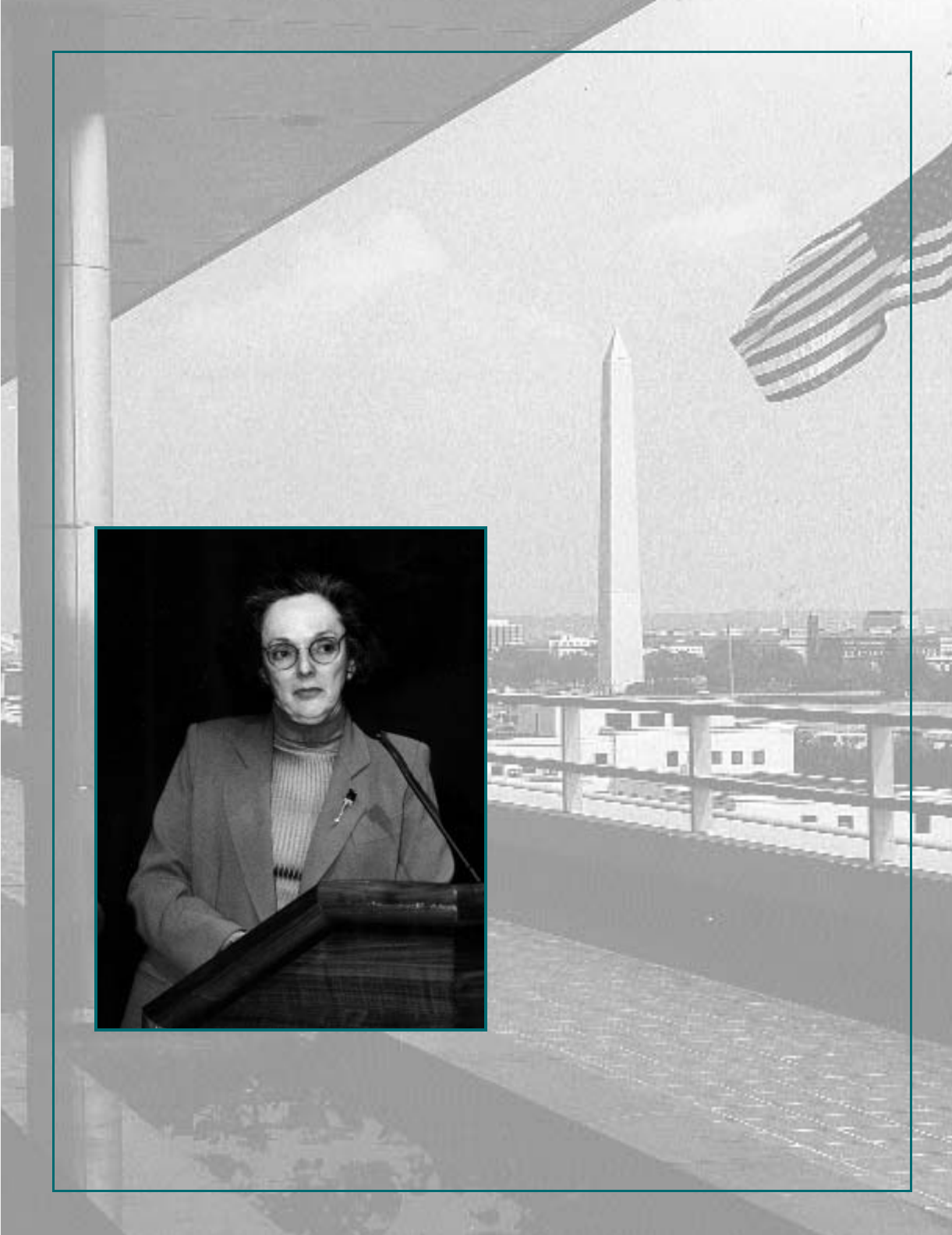
State
State
UNITED STATES DEPARTMENT OF STATE
February 1998
Magazine
“We have to spend smarter
and train better.”
BBuuiillddiinngg aa
NNeeww FFuuttuurree
iinn VViieettnnaamm
Also in this Issue:
— Undersecretary for Management Bonnie Cohen
at Town Hall Meeting, Jan. 14, 1998
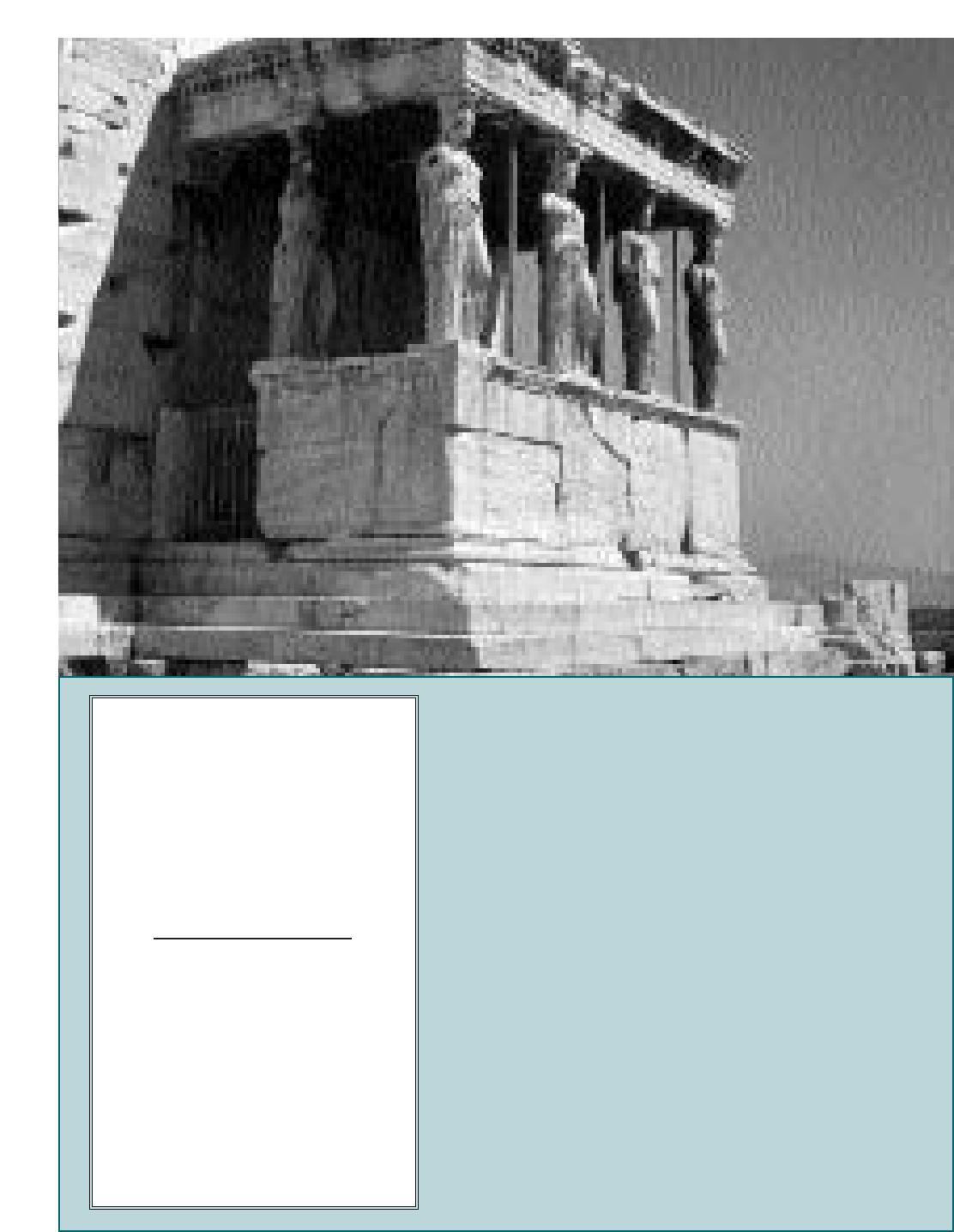
Coming in March:
ATHENS
State
State
State Magazine (ISSN 0278–1859) is published by the U.S.
Department of State to facilitate communication between manage-
ment and employees at home and abroad and to acquaint employees
with developments that may affect operations or personnel.
The magazine welcomes State-related news and features. Informal
first-person articles work best accompanied by photographs. The
magazine is unable to acknowledge every submission or the issue it is likely
to appear in and every attempt will be made to return photographs upon
request. Please include your telephone number or a way to be reached.
Articles should not exceed five typewritten, double-spaced
pages. They should also be free of acronyms (with all office names,
agencies and organizations spelled out). Photos should include
typed captions identifying persons from left to right with job titles.
When possible, please submit material on Apple Macintosh or IBM
PC-compatible disks. This includes Microsoft Word, WordPerfect and
Wang. (Please include a hard copy with the disk.) Double-spaced arti-
cles may also be sent via e-mail to the editors, or faxed to (703)
812–2475. Faxed material must be typed on 14 point or larger fonts. The
mailing address is State Magazine, PER/ER/SMG, SA–6, Room 433,
Washington, D.C. 20522–0602. Contributions may also be left in Room
3811, Main State. The magazine’s main number is (703) 516–1667.
State Magazine is also available to the public for a fee through the
Superintendent of Documents, U.S. Government Printing Office,
Washington, D.C. 20402 (telephone [202] 512–1800) and online at:
www.state.gov/www/publications/statemag/
Deadline for copy is the first Tuesday of each month.
Magazine
Carl Goodman
E
DITOR-IN-CHIEF
Donna Miles
D
EPUTY EDITOR
Kathleen Goldynia
D
ESIGNER
ADVISORY BOARD MEMBERS
Kenneth Hunter
C
HAIRMAN
Sylvia Bazala
E
XECUTIVE SECRETARY
Kaye Boesel
Catherine Brown
Colleen Hope
Larry Mandel
Jeffrey Meer
Gary Pergl
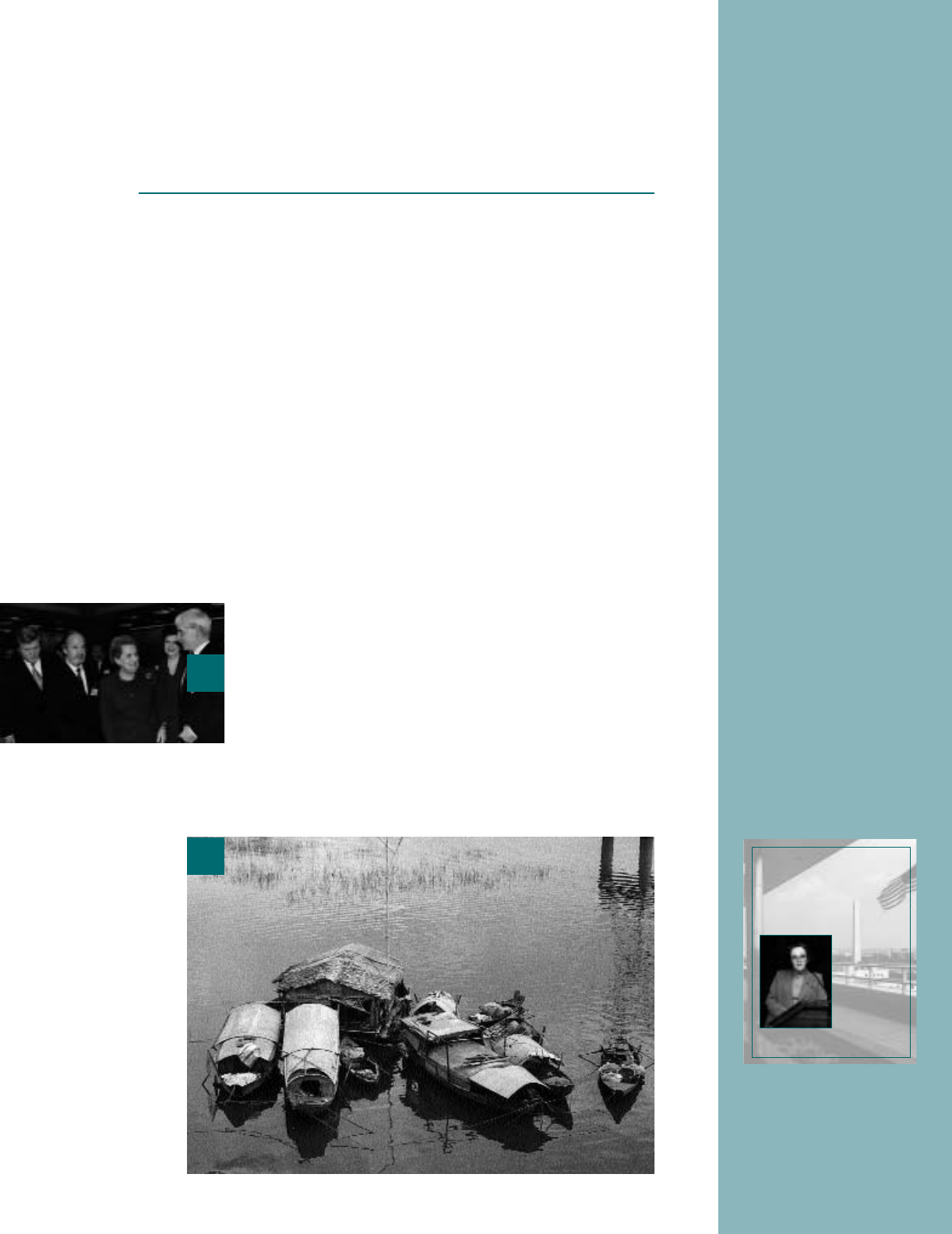
State
Contents
Department of State • United States of America
State
Magazine
February 1998
No. 411
COLUMNS
2 From the Secretary
4 Direct From the D.G.
15 Safety Scene
34 State of the Arts
36 Ask Dr. Dumont
40 Accent on Outreach
48 Library Report
DEPARTMENTS
3 Letters to the Editor
5 Appointments
8 In the News
37 Obituaries
41 Personnel Actions
44 Education & Training
On the Cover
Undersecretary for
Management Bonnie
Cohen hosts her first
town hall meeting.
Photo by Shawn Moore
State
State
UNITED STATES DEPARTMENT OF STATE
February 1998
Magazine
“We have to spend smarter
and train better.”
Building a
New Future
in Vietnam
Also in this Issue:
— Undersecretary for Management Bonnie Cohen
At Town Hall Meeting, January 14, 1998
8 Officials Describe Modernization Efforts at State
Plans emphasize growth, training and technological
improvements.
10 Russians Visit NFATC
Former Ambassador Anatoly Dobrynin paid a call on FSI.
11 Mister Mayor
Foreign Service experience gave a retiree the skills he needs
to run a city.
12 Inside USIA’s Information Bureau
Teamwork helped the bureau downsize while preparing for
the future.
16 Celebrating Blacks in Foreign Affairs
During Black History Month, the Department reflects on
the contributions of its African-American employees.
18 Bureau of the Month:
Economic and Business Affairs
I Awards Honor Excellence in Economics and Business
I Combating International Bribery
25 Technology Blues
A Foreign Service officer takes a light look at the computer
age and its effect on official communications.
26 Post of the Month:
I Hanoi: Building Toward a New Future in Vietnam
I Vietnam on Two Wheels
I USIS Vietnam
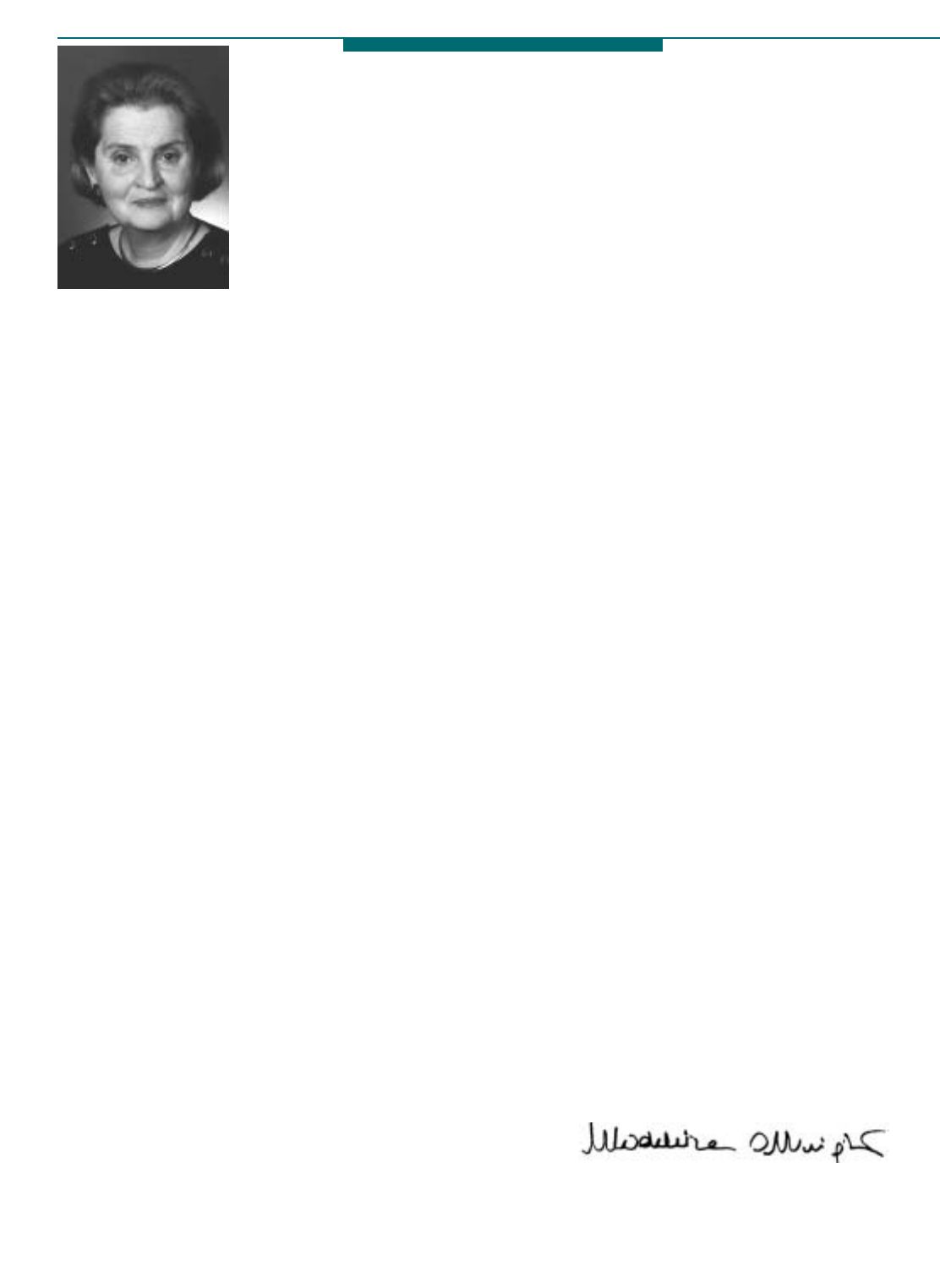
A
s we begin a new season of congressional testi-
monies and budget rollouts, let me highlight
some of the key challenges for our 1998 foreign
policy agenda on Capitol Hill.
The first is money. We must build on progress made
last year in gaining bipartisan support for the President’s
full request for funding international affairs. Although
we were unable to achieve this objective last year, I still
believe a consensus is possible.
Next, the President needs “fast track” authority to
negotiate new trade agreements that create better jobs for
Americans and help our economy grow. Fast track is also
a foreign policy imperative. In many capitals, if we have
nothing to say on trade, we will find it harder to have
influence on other issues of direct importance to the
American people.
Athird challenge is gaining congressional support to
further implement the Dayton Accords.
Shortly before Christmas, I traveled to Bosnia with the
President, former Senator Bob Dole and members of
Congress to visit our troops and to have frank conversa-
tions with local leaders. I have visited Bosnia several
times, but I was greatly encouraged by the positive
changes I saw. The psychology of peace is beginning to
catch up with the reality that the fighting has stopped.
This year, we have a broad agenda for further progress
in Bosnia on economic, political, legal and security issues.
We expect our allies to do their part, and we will insist
that Bosnians meet their own responsibilities. We also ask
Congress to support our continued presence in Bosnia to
help consolidate peace, and to ensure that when our
forces leave, they do not have to return.
The multinational effort to build peace in Bosnia
reflects the importance of a fourth test for 1998: to gain
the Senate’s consent to enlarge NATO, perhaps the best
friend peace has ever had. The choice Congress will be
asked to make is whether to reject NATO enlargement
and leave the alliance aligned to fight an enemy that no
longer exists, or to maintain America’s role in a new
NATO, bolstered by new democracies, sustained by
enduring principles and dedicated to deterring and over-
coming new threats.
2 State Magazine
FFRROOMM TTHHEE SSEECCRREETTAARRYY
Key Challenges for 1998
In the weeks ahead, we can expect the Senate to ask
questions about the costs of including Poland, Hungary
and the Czech Republic within our alliance. Our reply
will be that the costs now appear far lower than earlier
estimates, that our allies will bear the vast majority of
those costs and that the price of preparedness is never as
great as the consequences of failing to prepare.
I hope and believe that Congress, with support from
leaders of both parties, will make the right choice and
allow the first round of NATO enlargement to proceed.
A fifth legislative test for 1998 is whether we will pay
what we owe to the United Nations and the International
Monetary Fund. Currently, we are hundreds of millions
of dollars behind in our payments to both. This hurts
America. It makes it harder for these critical organiza-
tions to conduct and support programs that serve our
interests. It undermines our influence within the organi-
zations. And it is an open invitation to those around the
world hostile to our leadership to run America down.
That is why we were pleased last year with strong
bipartisan support for legislation that would bring us
closer to meeting our obligations. Unfortunately, the pro-
posals did not receive final approval. This year, we will
renew our call for action.
A sixth test of foreign policy leadership this year is
whether Congress approves the proposed Africa Growth
and Opportunity Act. The Administration strongly sup-
ports this initiative, drafted by Republican and
Democratic leaders, to support a new American
approach to a new Africa.
Obviously, this is not a complete list of the foreign pol-
icy tests Congress and the Administration will face in the
months ahead. There will be many others, including
receiving legislative authority to reorganize our foreign
policy institutions. I ask your help in developing and
maintaining the strongest possible relationship with
Congress on these and other issues that directly affect the
security, prosperity and freedom of the American people.
Madeleine Albright
Secretary of State

The New Format:
Pros and Cons
Dear Editor:
I just received the September/
October issue, my first look at the
new format. I don’t like it at all,
much too elaborate and busy. But
above all, where are the obituaries? I
certainly hope this is not a perma-
nent omission.
Ellen Turner
Eugene, Ore.
The obituaries, which resumed in the
November/December issue, are being con-
densed to help reduce the backlog. As for
the new format, reader response has been
overwhelmingly positive.
—The editors
Dear Editor:
For the first time in a few months
(the usual hiatus accompanying
transfer), I read State Magazine—the
November/December 1997 issue. I
was most pleasantly surprised. The
whole thing (or most—what can you
do with transfer lists?) is much better
reading than before. I particularly
enjoyed the Bureau of the Month fea-
ture on Consular Affairs. I was also
very pleased to see the editorial by
Director General Skip Gnehm. Our
Foreign Service National colleagues
are all too often treated as second-
class citizens or simply ignored by
Foreign Service officers. Keep up the
good work in the new year!
Dan Gamber
Retired Foreign Service Officer
Brussels
Keep Up the Good Work
Dear Editor:
I enjoyed reading State Magazine
some years ago at another library.
Reading the stories, I became
impressed by the people who are
working so hard to conduct the for-
eign affairs of the United States. One
of the stories was about a lady who
lived in my apartment building. She
was top-notch at her job, and I was
pleased to discover that she was
working for our nation through the
State Department. I hope that her
career has been successful and per-
sonally rewarding to her. My thanks
to all of you who are doing such
great work conducting our nation’s
foreign affairs.
Thomas K. Lindsey
Government Publications Librarian
University of Texas at Arlington
Brasilia, Here I Come!
Kudos to Matthew Dever on his
very descriptive article about Brasilia.
He makes me want to run out and
buy a plane ticket to see for myself!
Natoschia Scruggs
Former Intern, Embassy-Abidjan
Côte d’Ivoire
A Memorial for FSNs
Dear Editor:
Your June/July 1996 issue ran an
article by former Director General
Quainton stressing the commitment
to service and citing as an example
the “fidelity, bravery, leadership, ini-
tiative and dedication” of the FSN of
the Year.
In a previous Letter to the Editor, I
wrote: “Now that recognition by
AFSA of another category of individ-
uals, the Croatia crash victims, has
been established, one might ask why
similar steps are not being taken to
memorialize our FSN colleagues
who have given their lives in sup-
port of U.S. interests?”
February 3
LLEETTTTEERRSS TTOO TTHHEE EEDDIITTOORR
Letters should not exceed 250
words and should include the
writer’s name, address and day-
time phone number. Letters will
be edited for length and clarity.
You can also reach us via e-mail
In July 1997, former AFSA Pres-
ident Tex Harris wrote to Secretary
Albright to support the Department’s
program of recognizing a worldwide
FSN of the Year chosen from regional
winners. Mr. Harris also suggested
that “the Department of State and
other foreign affairs agencies consid-
er the establishment of memorial
plaques, both at posts and in Wash-
ington, to honor Foreign Service
Nationals who have given their lives
in the service of the United States. In
Washington, there could be a com-
bined plaque in the State Department
for FSNs of all agencies.”
In the November/December 1997
issue, Director General Gnehm re-
ferred to FSNs in writing, “the
Secretary and the Department are
fortunate to have a workforce devot-
ed to accomplishing its mission,
often under adverse conditions.”
Given the flow of praise for the FSN
community, shouldn’t the Depart-
ment translate those words into action
by establishing a Department memo-
rial for those who have given their
lives to support U.S. interests? The
five FSN regional winners of FSN of
the Year might then be asked to par-
ticipate in a wreath laying at that
memorial each year and so carry
home a very meaningful experience
that will evidence our pride, thanks
and remembrance of those fallen col-
leagues named thereon.
Sincerely,
Bernard J. Woerz
Retired Foreign Service Officer
Coconut Grove, Fla.
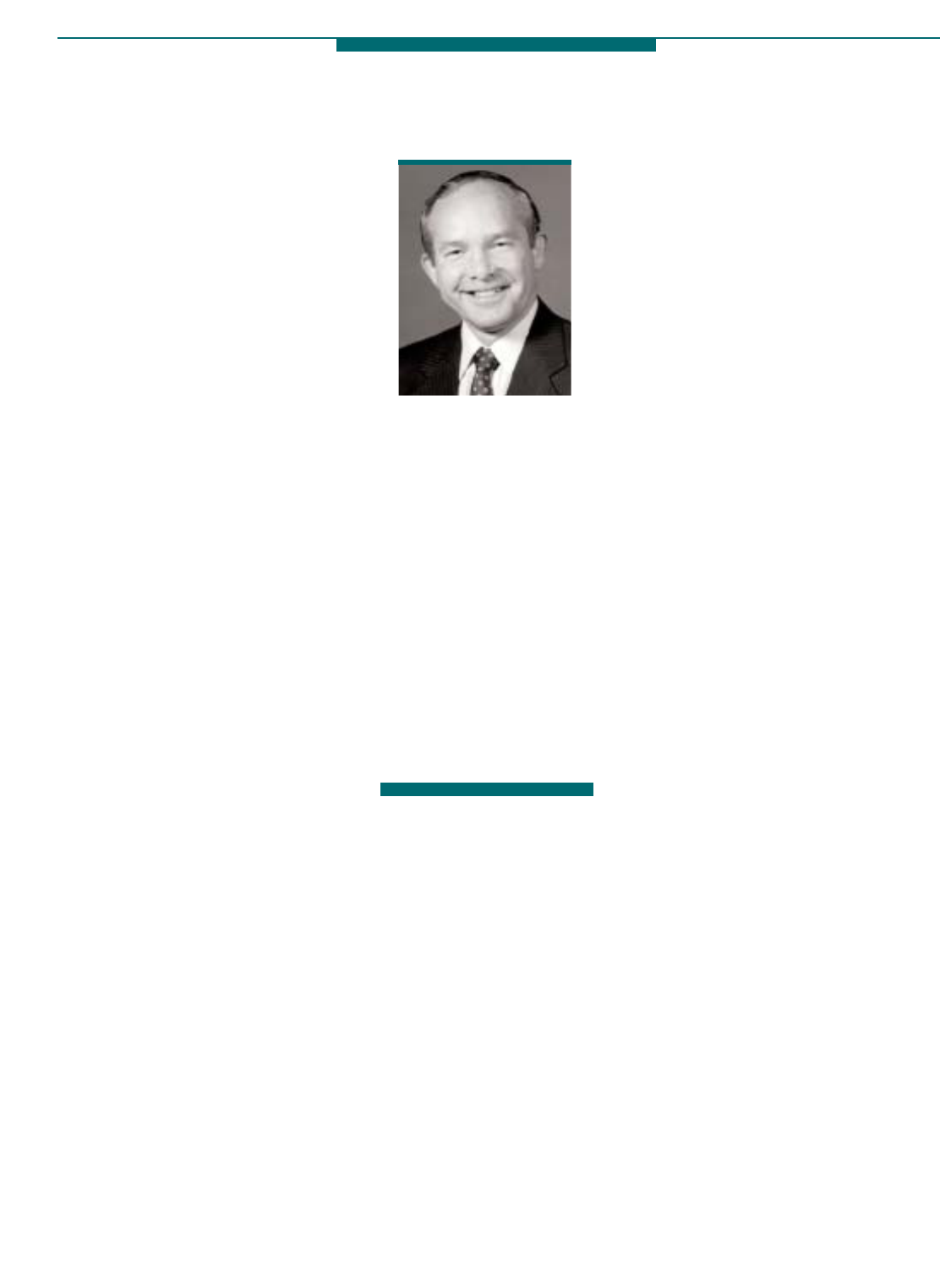
M
any Foreign Service “old-
timers” bemoan the current
state of affairs, claiming they
joined State “when giants
walked the earth.” Somehow the belief
that those hired recently are not “the best
and the brightest” continues among some
old-timers. Although an “old-timer”
myself, I strongly disagree. I’ve seen first-
hand that we are attracting colleagues
who are smart, dedicated and talented.
But I am the first to say that we can—and
MUST—do better.
I know from my New York days with
Secretary Albright that she has strong
views about our current and future
needs. “We need people with language
skills, economic talents and global issues
backgrounds!” she would tell me. When I
first met Undersecretary Bonnie Cohen,
we discussed at length the need to attract
the highest-caliber employees to Depart-
ment careers. We also talked about the
importance of hiring in increased num-
bers, so we can alleviate the chronic
staffing gaps severely affecting overseas
posts. And, finally, we discussed the
Secretary’s and our mutual commitment
to increasing diversity throughout the
Department’s workforce, especially the
need to reach out to universities, minori-
ty communities and organizations across
the United States to attract the best
minority candidates to State Department careers.
I’m excited to tell you what we’re doing on these three
fronts. We are hiring new employees across the entire
spectrum of the State workforce in fiscal year 1998. Our
projections call for hiring 285 Civil Service employees,
301 Foreign Service specialists and 234 Foreign Service
generalists. These new hires are absolutely critical to
relieve chronic staffing gaps worldwide.
Increasing the number of new hires, however, is only half
the story. The quality of the people we bring on board is
every bit as important as the quantity. Our Office of
Recruitment, Examination and Employment has imple-
mented a Strategic Recruitment Plan to attract the best pos-
sible candidates to Department careers. Several student
programs are a key component of that plan to reach stu-
dents in the formative stage of their careers.
The Presidential Management Intern Program, admin-
istered by the Office of Personnel Management, recruits
talented graduate students into the federal government.
When their internships end, these individu-
als are eligible for conversion to a career or
career-conditional appointment to the Civil
Service. In September, we initiated the first
formal class at State. Members of the group
have educational backgrounds running the
gamut from foreign affairs to law enforce-
ment sciences, and they are likely be our
next generation of Civil Service leaders.
The Student Intern Program is the largest
of our student efforts, open to college jun-
iors, seniors and graduate students. We had
516 placements, 304 of them overseas, last
year. The program is a proven pipeline for
career employees. Former interns pass the
Foreign Service written exam at a rate 50
percent greater than that for the general
population, and they arrive with foreign
affairs experience. As noted in a story on
black history beginning on page 16 of this
issue, one of our best, Ambassador George
Moose, who will represent us at the
European Office of the United Nations,
began his career as an intern in 1966.
A full range of other, less-visible programs,
such as Stay-in-School and Cooperative
Education, also employ young people and
expose them to Department careers.
I’m especially excited about our planned
reinvigoration of the Foreign Affairs
Fellowship Program. Call it State’s own
ROTC program. It targets high-caliber col-
lege sophomores and guarantees them
tuition assistance for the final two years of college and
first year of graduate school. The fellows, who must meet
Foreign Service entry requirements to come on board,
serve a minimum of 4 1/2 years as Foreign Service gen-
eralists. We will make a concerted effort to recruit a
diverse group, with special consideration given to stu-
dents who demonstrate economic need. This program is
extremely resource-intensive, but it is a necessary invest-
ment if we are to make foreign affairs careers accessible
to a talented group of young people who might not oth-
erwise be attracted.
You can help attract the best employees to the
Department of State. Each of you reaches a wide audi-
ence of potential State employees in your personal and
professional lives. I hope you will encourage talented
and ambitious people to consider a career at State. Our
Recruitment Division has more information on the above
programs or any of our recruiting efforts, and would be
glad to assist one and all.
I
4 State Magazine
DDIIRREECCTT FFRROOMM TTHHEE DD..GG..
My goal in this col-
umn is to discuss
issues I am devoting
my time to and
about which I feel
strongly. This
month’s is a “bread-
and-butter” issue
that’s absolutely
central to my job:
recruiting, selecting
and hiring our
future workforce.
BY EDWARD W. “SKIP” GNEHM JR.
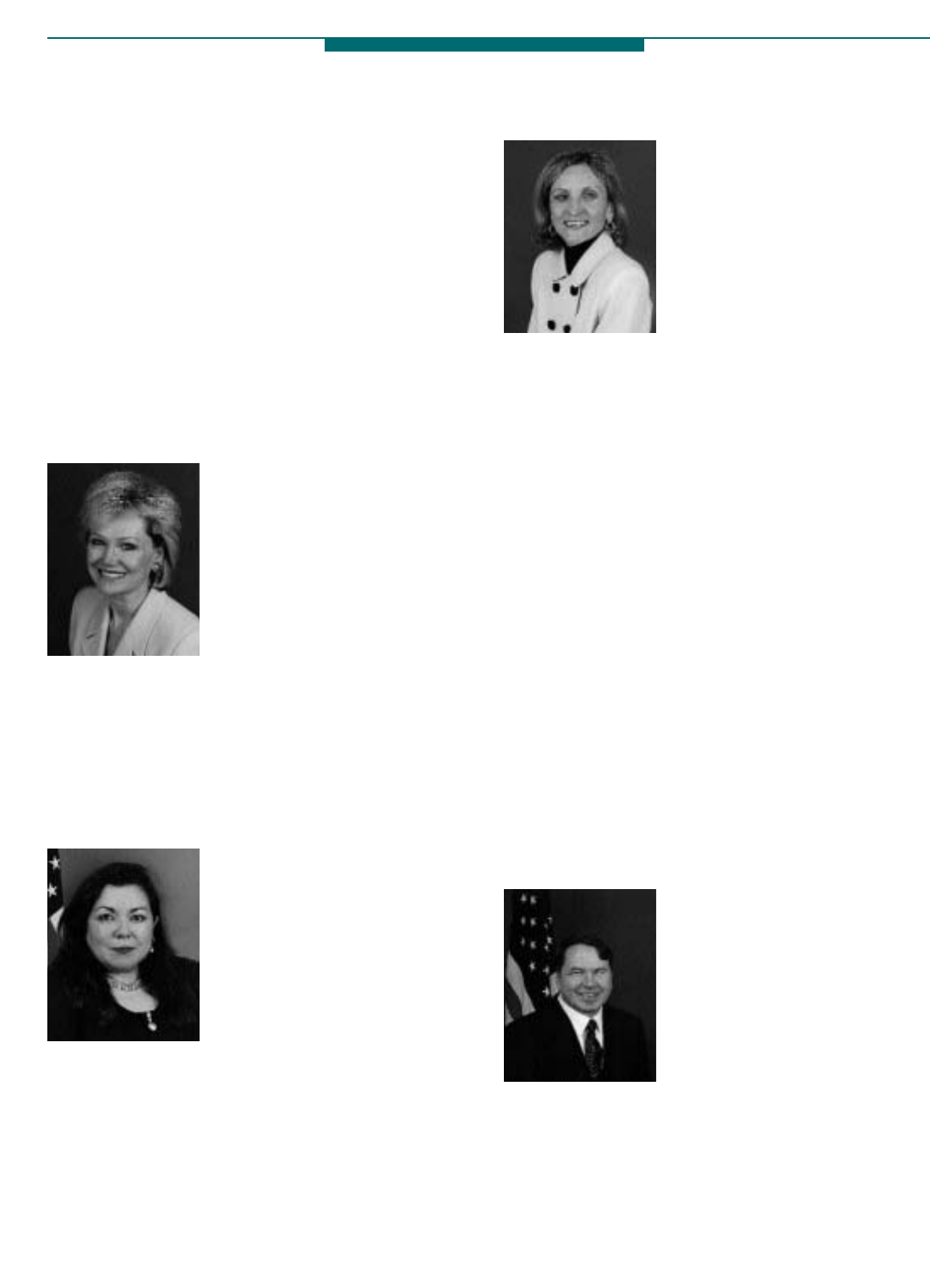
ALGERIA: Cameron R. Hume, of New York, joined the
Foreign Service in 1970, following service as a Peace
Corps volunteer in Libya. His overseas assignments
include Palermo, Tunis, Damascus, Beirut and the Holy
See. He served on the Secretary’s planning staff and as a
desk officer for South Africa and has had three tours of
duty at the U.S. Mission to the United Nations.
Ambassador Hume graduated from Princeton University
and American University’s Washington College of Law.
He has been an international affairs fellow at the Council
on Foreign Relations, a fellow at Harvard’s Center for
International Affairs, and a guest scholar at the U.S.
Institute of Peace, and has written two books and numer-
ous articles on diplomacy and diplomatic history. His
nomination was confirmed by the Senate Nov. 6.
AUSTRIA: Kathryn Walt Hall, of
Texas, began her career as assistant
city attorney in Berkeley, Calif.,
before joining Safeway, where she
developed and administered one of
the nation’s first and largest affir-
mative action programs. She has
worked as an attorney and busi-
nesswoman in Dallas, Texas, and
served as executive vice president
and managing director with Hall Financial Group, Inc., an
investment firm. In 1995, Ms. Hall was appointed to the
National Advisory Council for Violence Against Women,
and in early 1997 she became a trustee for the Woodrow
Wilson International Center for Scholars. She earned a
bachelor’s degree in economics and a law degree from the
University of California. Her nomination was confirmed
by the Senate Nov. 6.
BELIZE: Carolyn Curiel, of Indiana,
was special assistant to the
President and senior presidential
speechwriter before being nominat-
ed ambassador to Belize. She joined
the Clinton Administration in
February 1993 after a career in jour-
nalism editing, writing and produc-
ing both print and broadcast news.
She headed the Caribbean Division
of United Press International, worked at the Washington
Post and at the New York Times as an editor and was a
writer-producer at ABC News. At the White House, Ms.
Curiel specialized in domestic issues, including race rela-
tions. Ambassador Curiel earned a bachelor’s degree in
radio-TV-film from Purdue University in 1976. Her nomi-
nation was confirmed Nov. 10.
BOLIVIA: Donna Jean Hrinak, of
Pennsylvania, served as ambassa-
dor to the Dominican Republic
from 1994 until her appointment to
Bolivia. She joined the Foreign
Service in 1974 and has served in
the U.S. embassies in Mexico City,
Warsaw, Bogota, Caracas and
Tegucigalpa. She also served as
deputy consul general in São Paulo
and in Washington as deputy assistant secretary of State
for Caribbean and Mexican Affairs in the Bureau of Inter-
American Affairs. Ambassador Hrinak received a bache-
lor’s degree from Michigan State University and attend-
ed George Washington University and the University of
Notre Dame School of Law. The Senate confirmed her
nomination Nov. 10.
COLOMBIA: Curtis Warren Kamman, of Washington,
D.C., has been a Foreign Service officer since 1960 and
has served as ambassador to Bolivia since 1994. He was
ambassador to Chile from 1991 to 1994. He previously
served as deputy assistant secretary for European and
Canadian Affairs, as deputy assistant secretary for intelli-
gence and research, and as chief of the U.S. Interests
Section in Havana. He was political counselor and
deputy chief of mission in Moscow and director of East
African Affairs in Washington, and has held diplomatic
positions in Mexico, Hong Kong, Kenya and the former
Soviet Union. In 1991, he received the President’s
Distinguished Service Award for career officials, and two
years later he was accorded the rank of career minister.
Ambassador Kamman graduated from Yale University in
1959 and has continued his studies at Stanford University
and the University of Washington. The Senate confirmed
his nomination Nov. 3.
CROATIA: William Dale Montgomery,
of Pennsylvania, began his Foreign
Service career in 1974. He served in
Belgrade, Moscow, Dar es Salaam
and Bulgaria, where he was ambas-
sador from 1993 to 1996 until being
named State’s special adviser for
Bosnian peace implementation.
Ambassador Montgomery has a
bachelor’s degree from Bucknell
University and a master’s from George Washington
University. His nomination was confirmed Nov. 10.
February 5
AA PP PP OO II NN TT MM EE NN TT SS
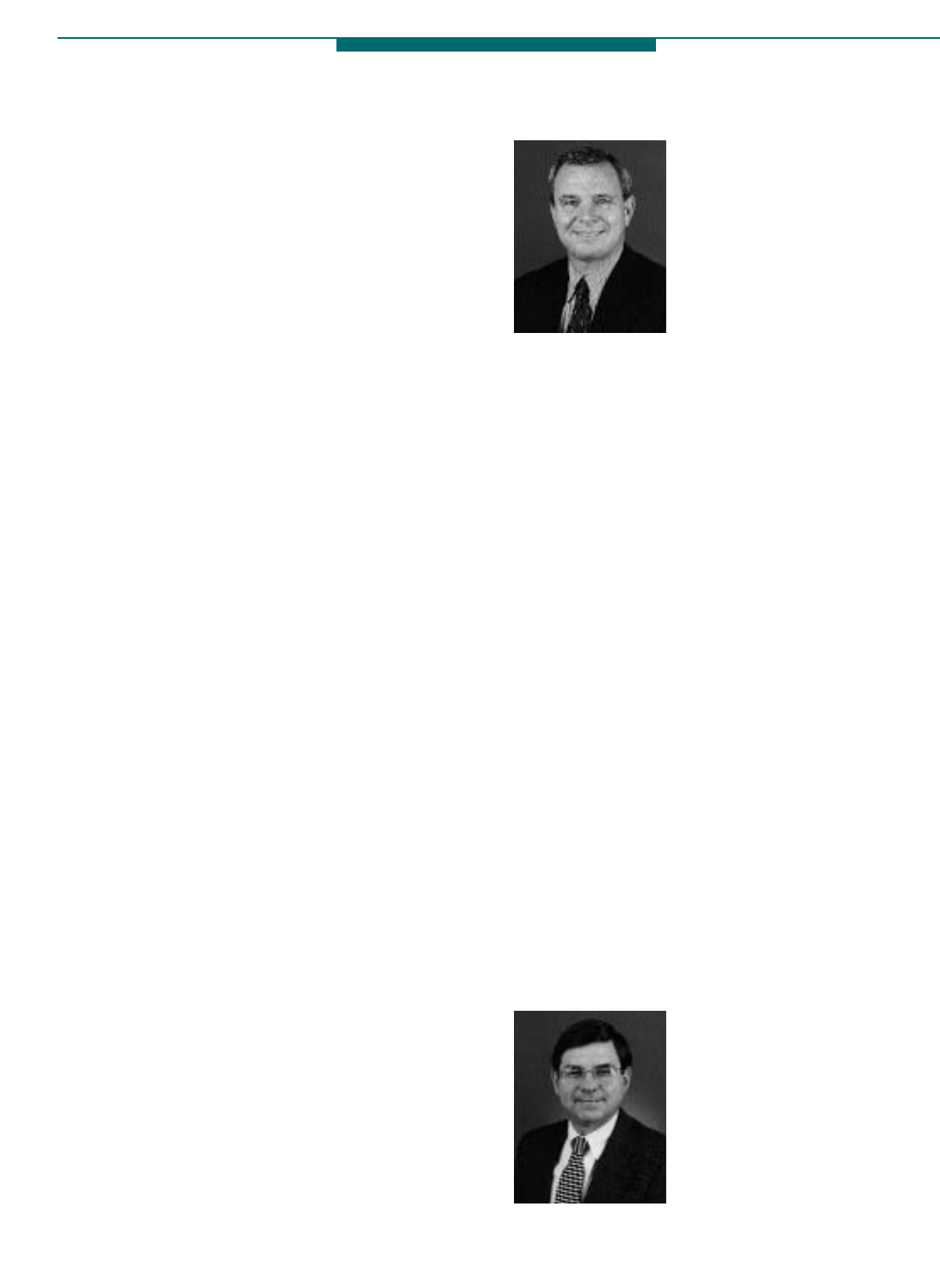
HAITI: Timothy Michael Carney, of Washington state,
served as ambassador to Sudan from 1995 to 1997. He
previously served as deputy assistant secretary for South
Asian Affairs and held assignments in Vietnam,
Cambodia, Thailand, Indonesia, Lesotho and South
Africa. He directed U.N. peacekeeping in Cambodia and
served as a U.N. consultant in Somalia and South Africa.
Ambassador Carney has a bachelor’s degree from the
Massachusetts Institute of Technology, has pursued
advanced Southeast Asian studies at Cornell University,
and has held diplomatic positions in Mexico, Hong Kong,
Kenya and the former Soviet Union. The Senate con-
firmed his nomination Nov. 10.
JAMAICA: Stanley L. McLelland, of Texas, served 16 years
as a senior executive of Valero Energy Corp., an inde-
pendent refinery based in San Antonio. He has partici-
pated in several civic, international and charitable activi-
ties, co-chaired the 1991 U.S.-Mexico Border Attorneys
General Conference, and served in trade delegations to
Mexico in 1991 and 1995. He also serves on the United
Way of America’s National Corporate Associates
Council. Ambassador McLelland graduated in 1967 from
the University of Texas at Austin and received his law
degree in 1970 from the University of Texas Law School.
In 1991, he graduated from Stanford University’s
Graduate School of Business’ Executive Program. His
nomination was confirmed Nov. 10.
MONGOLIA: Alphonse F. La Porta, of New York, entered
the Foreign Service in 1965. He is experienced in Asian
affairs and has held assignments in Malaysia, Indonesia
and Turkey. His most recent overseas assignment was as
deputy chief of mission in Wellington, New Zealand,
from 1987 to 1991. In Washington, Ambassador La Porta
directed the Office of Cambodian Genocide Investi-
gation, was executive assistant to the President’s special
representative for the Philippine Multilateral Assistance
Initiative, and was deputy director of the Office of
Indonesia, Malaysia, Brunei and Singapore Affairs. He
was with the Office of Management Operations from
1985 to 1987 and contributed to the State 2000 and other
management reform reports. Ambassador La Porta
became vice president of the American Foreign Service
Association in 1995, and president last year. He is a grad-
uate of Georgetown University’s School of Foreign
Service and New York University. The Senate confirmed
his nomination Oct. 21.
MOZAMBIQUE: Brian Dean Curran,
of Florida, joined the Foreign
Service in 1973 and has served in
Niger, Guinea-Bissau, Belgium,
France and Ireland. He was deputy
assistant secretary for Legislative
Affairs from 1994 to 1996. Ambas-
sador Curran received a bachelor’s
from the School of Foreign Service
at Georgetown University in 1970
and a master’s degree in 1972 from the John Hopkins
University School of Advanced International Studies.
The Senate confirmed his nomination Oct. 21.
POLAND: Daniel Fried, of Washington, D.C., began his
career with the Foreign Service in 1977. He served in
State’s Economic Bureau, in its Office of Soviet Affairs
and as desk officer for Poland, and held assignments in
Leningrad, Belgrade and Warsaw. Ambassador Fried
served on the staff of the National Security Council from
1993 until 1997, first as director and then as special assis-
tant to the President and senior director for Central and
Eastern Europe. He received a bachelor’s degree from
Cornell University and a master’s in international affairs
from Columbia University and is the recipient of several
group and individual superior and meritorious honor
awards from State. The Senate confirmed his nomination
Nov. 6.
SRI LANKA/MALDIVES: Shaun E. Donnelly, of Indiana,
has been with the Department since 1972, specializing in
international economic affairs, including international
trade, energy, development finance and economic sanc-
tions policy. He previously was an economic officer in
Senegal, Ethiopia and Egypt, and deputy chief of mission
in Mali and Tunisia. Since September 1994, Mr. Donnelly
has served as deputy assistant secretary of State in the
Bureau of Economic and Business Affairs. Ambassador
Donnelly is a graduate of Culver Military Academy and
earned a bachelor’s degree in economics from Lawrence
University and a master’s in economics from Northwestern
University. The Senate confirmed his nomination Nov. 6.
TRINIDAD AND TOBAGO: Edward
E. “Terry” Shumaker III, of New
Hampshire, was a senior partner
with the law firm of Gallagher,
Callahan & Gartrell before his
ambassadorial appointment. He
was appointed to the National
Commission for Employment
Policy in 1994 and was elected in
1996 as one of the first 100 fellows
6 State Magazine
AA PP PP OO II NN TT MM EE NN TT SS
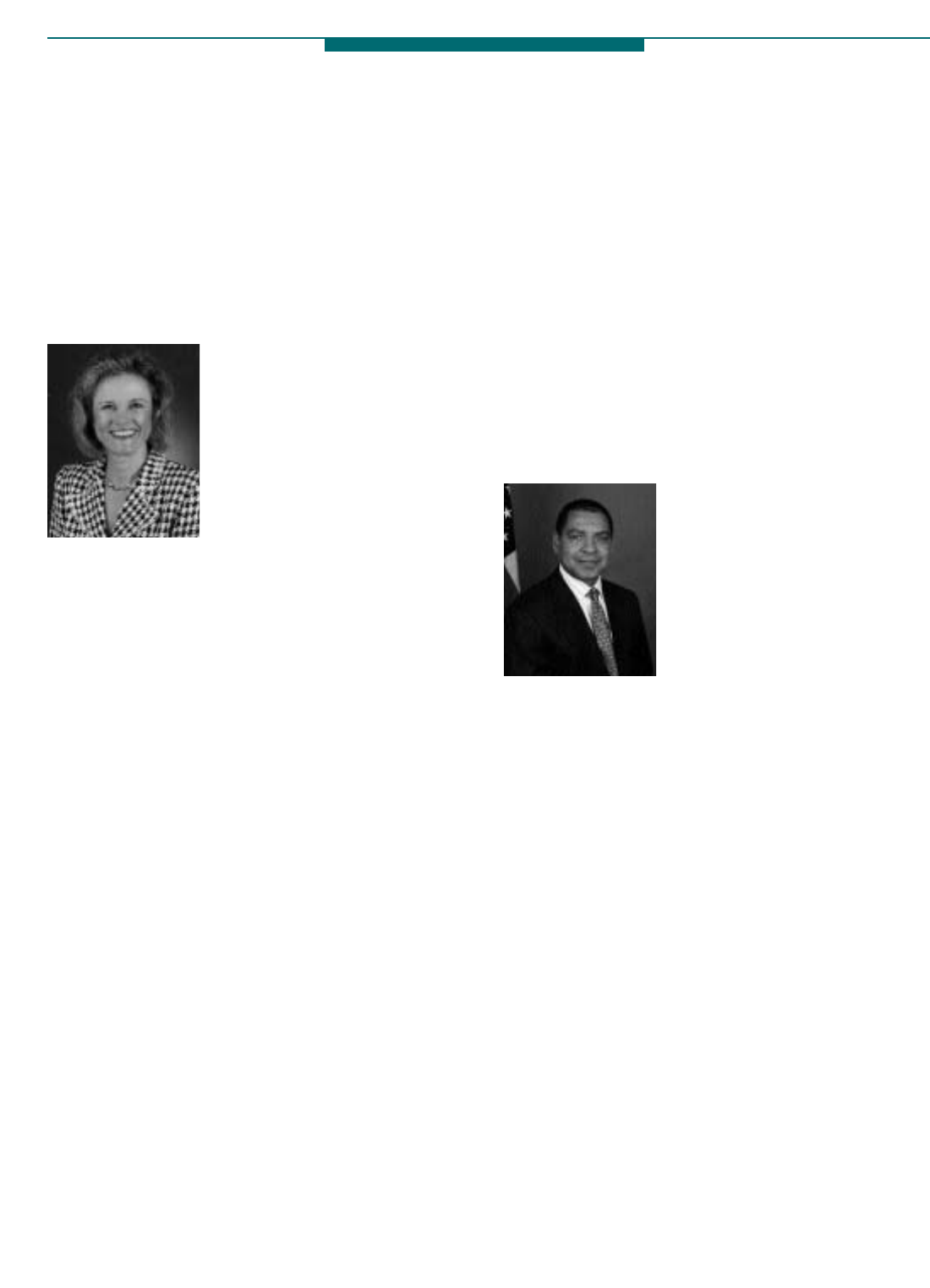
of the American College of Labor and Employment
Lawyers. Ambassador Shumaker also served on the New
Hampshire Supreme Court Rules Advisory Committee,
the New Hampshire National and Community Service
Executive Board and New Hampshire’s electoral college.
He graduated from The Choate School in 1966 and
earned an bachelor’s degree from Dartmouth College in
1970 and a law degree from Boston University in 1973.
His nomination was confirmed by the Senate Oct. 23.
TUNISIA: Robin Lynn Raphel, of
Washington, D.C., began her career
as a lecturer at Damavand College
in Tehran. She was an economic
analyst for the Central Intelligence
Agency from 1973 to 1975, then
worked for the U.S. Agency for
International Development in
Pakistan before joining the Foreign
Service. In Washington, Ambas-
sador Raphel worked at State in several capacities. She
was an economist in the Office of Investment Affairs, an
economic officer on the Israel desk, a staff aide for the
assistant secretary for the Near East and South Asian
Affairs Bureau, and special assistant to the under secretary
for Political Affairs. She covered Middle Eastern, South
Asian, African and East Asian issues in London, and was a
counselor for Political Affairs in South Africa from 1988 to
1991 and in India from 1991 to 1993. Before her latest
appointment, she was assistant secretary for South Asian
Affairs. Ambassador Raphel received a bachelor’s degree
in history and economics from the University of
Washington and attended the University of London. She
also did graduate work at Cambridge University and
earned a master’s in economics from the University of
Maryland. Her nomination was confirmed Nov. 5.
ASSISTANT SECRETARY FOR POPULATION, REFUGEES
AND MIGRATION: Julia V. Taft, of Washington, D.C., is a
leading authority on refugee affairs and humanitarian
assistance. She began her career as a White House fellow,
later became special assistant to the Secretary of Health,
Education and Welfare, and then became a deputy assis-
tant secretary. She directed the U.S. Indochinese Refugee
Resettlement Program and later served as State’s acting
U.S. coordinator for refugees. From 1986 to 1989,
Ambassador Taft was director of USAID’s Office of U.S.
Foreign Disaster Assistance. Before her latest appoint-
ment, she was president and CEO of InterAction, the
American Council for Voluntary International Action.
Ambassador Taft received her bachelor’s degree in 1964
and master’s in 1969 from the University of Colorado in
Boulder. The Senate confirmed her nomination Nov. 6.
ASSISTANT SECRETARY FOR INTELLIGENCE AND
RESEARCH: Phyllis Elliott Oakley, of Louisiana, served as
the Department’s first female deputy spokesperson from
1986 to 1989. She later served with the Agency for
International Development, working with the Afghan-
istan Cross-Border Humanitarian Assistance Program in
Islamabad, then as State’s Afghanistan desk officer. She
was deputy assistant secretary for regional analysis in the
Bureau of Intelligence and Research from 1991 to 1993
before being named assistant secretary of the Bureau of
Population, Refugees and Migration. Ambassador
Oakley earned her bachelor’s degree from Northwestern
University in 1956 and a master’s from the Fletcher
School of International Law and Diplomacy at Tufts
University in 1957. The Senate confirmed her nomination
Nov. 6.
REPRESENTATIVE OF THE
UNITED STATES TO THE EURO-
PEAN OFFICE OF THE UNITED
NATIONS: George Moose, of
Washington, D.C., has served as
assistant secretary for African
Affairs since 1993. He previously
served as alternate representative
to the U.N. Security Council from
1991 to 1992, as ambassador to
Senegal from 1988 to 1991, and as ambassador to Benin
from 1983 to 1986. Ambassador Moose joined the Foreign
Service in 1967. His other assignments have included
postings to Vietnam and Barbados and various positions
in State, including director of the Office of Management
Operations and deputy director of the Office of Southern
African Affairs. He has received numerous awards,
including the Department’s Superior Honor Award and
the Meritorious Honor Award. The Senate confirmed his
nomination Nov. 6.
February 7
AA PP PP OO II NN TT MM EE NN TT SS
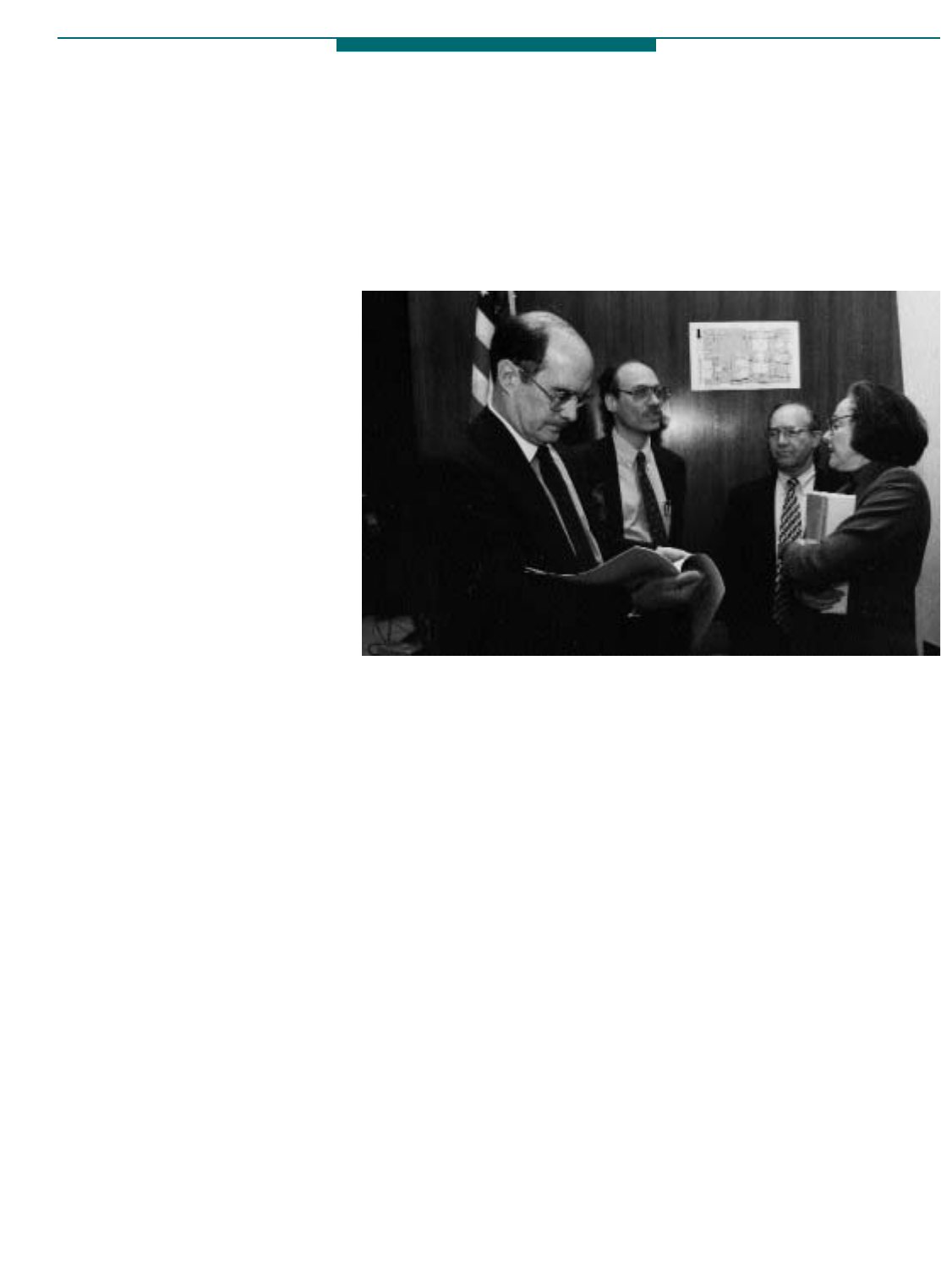
By Donna Miles
Photos by Shawn Moore
U
ndersecretary for Management
Bonnie Cohen said she felt
“shocked” after taking a
good, hard look at the Department’s
operations last August when she
took the reins as Management chief.
She found that the slogan of the
federal streamlining effort, “doing
more with less,” had become a way
of life at State—perhaps, she said,
too much so.
Ms. Cohen said she was struck by
the scope of the Department’s mis-
sion. She said she was equally
struck, however, by the demands
the Department places on its 23,000
employees struggling to fill the
gaps left by workforce cuts and
shrinking budgets.
But things are looking up, said Ms.
Cohen and Edward W. “Skip”
Gnehm Jr., director general of the
Foreign Service and director of
Personnel. Deputy Secretary Strobe
Talbott introduced the officials to a
standing-room-only crowd of about
1,000 State employees who attended
the Jan. 14 town hall meeting. Both
officials said nobody is more commit-
ted to strengthening the Department
than Secretary Madeleine Albright,
who has made rebuilding the
Department’s resources one of her
highest priorities.
Ms. Cohen said the Department’s
fiscal 1998 budget is just under $2.9
billion—representing the first time
in five years that State’s budget is
larger, rather than smaller, than the
previous year’s. The Department
can now focus on what she called
her five top priorities: preparing for
the integration of the Arms Control
and Disarmament Agency, the U.S.
Information Agency and some
Agency for International Develop-
ment functions under State; filling
personnel vacancies and providing
more training opportunities for
workers; and providing employees
with better computer systems to do
their jobs and better working condi-
tions, especially overseas.
Ms. Cohen acknowledged that the
anticipated integration of the Arms
Control and Disarmament Agency
and U.S. Information Agency into
State has some people concerned
about their jobs. She said State is
committed to protecting the three
organizations’ budgets to ensure
that resources dedicated to foreign
affairs, including positions, aren’t
cut during the integration.
Ms. Cohen called filling vacancies
throughout the Department a top
priority. She said State will increase
by 820 employees this year—a 100
percent increase over last year’s rate.
The fiscal 1998 hiring plan calls for
recruiting 234 Foreign Service gener-
alists, 301 Foreign Service specialists
and 285 Civil Service employees.
Mr. Gnehm said the new hires will
help reinvigorate and restore confi-
dence in the system and bolster the
Department’s role in foreign policy.
The undersecretary said State
needs to do more to provide fair
salaries and benefits to Foreign
Service Nationals, the Department’s
largest group of employees. She
said her staff is seeking to improve
the way FSN wages are adjusted
and to resolve long-standing FSN
pension issues.
8 State Magazine
II NN TT HH EE NN EE WW SS
Officials Describe Growth,
Modernization Efforts at State
Deputy Secretary Strobe Talbott, left, reviews notes before the town hall meeting.
With him, from left, are Larry Mandel, special assistant to Undersecretary for
Management Bonnie Cohen; Edward W. “Skip” Gnehm Jr., director general of the
Foreign Service and director of Personnel, and Undersecretary Cohen.
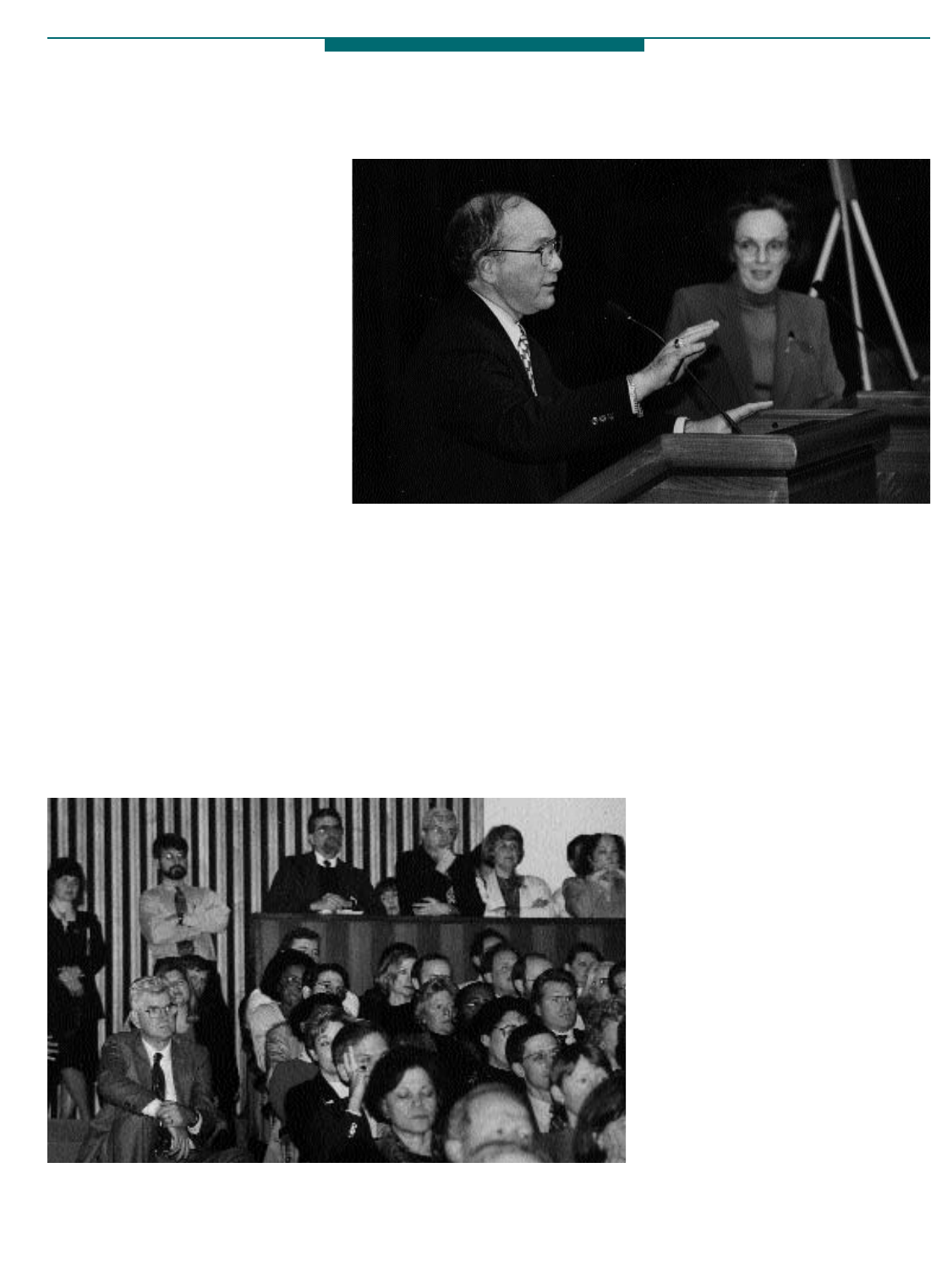
Ms. Cohen said State needs to put
more emphasis on employee training
to better prepare its people to confront
the challenges ahead. “It’s important
that we assure ourselves that everyone
who needs training gets the training
and that people get training for their
entire careers, not just at the point
when we bring them into the State
Department,” she told the audience.
The director general agreed that an
increased emphasis on training will
help keep qualified people from leav-
ing the Department, while underscor-
ing the concept of State service as a
career. “We are a profession,” he said,
“and by instituting a continuum of
training for Civil Service and Foreign
Service workers, we’ll do a better job
of conveying that message.”
Ms. Cohen told the audience her
staff is also working to improve the
Department’s information and com-
munication systems. This fiscal year,
$117 million is earmarked for infor-
mation technology investments, and
Main State is being wired now for
building-wide Internet access. While
it modernizes its systems, the
Department needs to take some les-
sons from private industry, she said,
to learn how to use its technology
more efficiently. “We have to spend
smarter and train better,” she said.
After visiting several overseas
embassies, the undersecretary said
she found buildings to be in “a con-
dition I think that would surprise
the American public.” Ms. Cohen
said she and Secretary Albright are
committed to improving working
conditions for the 60 percent of
State’s workforce assigned overseas.
The fiscal 1998 budget allocates $800
million for improvements, but Ms.
Cohen said that falls far short of
what’s needed, and State will need
to ensure that money is directed
where it’s most needed. “We won’t
be able to do everything,” she
acknowledged, “but we will be able
to tell you what we are doing and
when we will do it.”
Ms. Cohen said she is taking to
heart the challenge posed by
Secretary Albright: to help us all to
function better, faster and with more
flexibility. Our goal is to make the
Department “a place where the best
people are excited not only about the
work they do, but also about the
support and tools we give them to
do it with.”
Ms. Cohen encouraged employees
to send their suggestions to her,
signed or unsigned. “You live the
system and experience the system.
We need your input to help us make
the system work better for you.”
I
February 9
II NN TT HH EE NN EE WW SS
Edward W. “Skip” Gnehm Jr., director general of the Foreign Service and director
of Personnel, outlines his plan to promote training at State as Undersecretary for
Management Bonnie Cohen looks on.
About 1,000 employees packed the Dean Acheson Auditorium to hear about State’s
plans for the future.
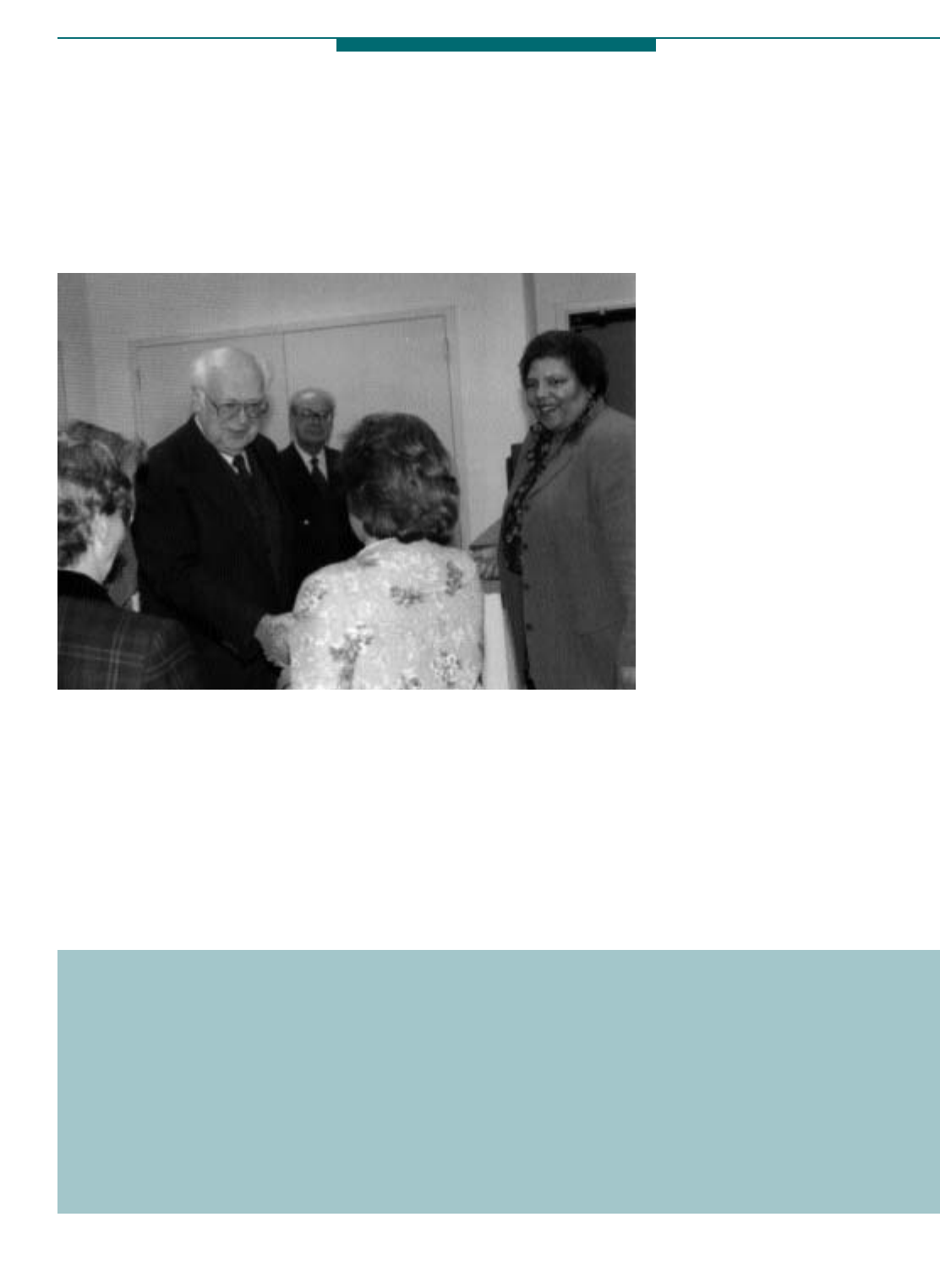
T
he ceremonial gate of the
National Foreign Affairs Train-
ing Center in Arlington, Va.,
recently swung wide to welcome a
delegation headed by former Russian
Ambassador and Dean of the Dip-
lomatic Corps Anatoly Dobrynin.
Martin Luther King Remembered
State employees in Washington celebrated the achievements of the late Dr. Martin Luther King Jr. during a Jan.
15 ceremony in Main State’s Dean Acheson Auditorium.
Secretary Madeleine K. Albright hosted the event, with the theme “Remember! Celebrate! Act!”, commemorat-
ing past struggles to attain equality and calling on Americans to continue seeking ways to achieve racial harmony.
The Rev. Wintley A. Phipps, an internationally known composer and singer of American gospel music, was the
keynote speaker. Students from Bailey’s Elementary School for the Arts and Sciences in Falls Church, Va., were
scheduled to peform, but inclement weather closed many area schools. President Clinton has called the school a
model for racial harmony.
10 State Magazine
II NN TT HH EE NN EE WW SS
Mr. Dobrynin served as ambassa-
dor from the Soviet Union to the
United States from 1962 to 1986,
under six presidents, from John F.
Kennedy to Ronald Reagan. Now
adviser to the Russian president,
Ambassador Dobrynin was accom-
panied by the current Russian
ambassador, Yuliy Vorontsov, and
Russia’s cultural affairs counselor,
Anatoliy Zukekhin.
Ambassador Ruth A. Davis, direc-
tor of the Foreign Service Institute,
greeted the delegation, along with
Deputy Director Ruth A. Whiteside
and Executive Director for Manage-
ment Catherine J. Russell. Discussion
centered around the challenge of
training diplomats of the 21st centu-
ry. The group discussed future coop-
eration on training, research and
development issues.
While touring the facility, the
Russian guests visited the Consular
Training Division’s “visa window”
and the “jail,” sites of scenarios con-
ducted to simulate real-world con-
sular work. Ambassador Dobrynin
got hands-on experience with FSI’s
multimedia and web-based training
tools used in Russian language and
area study. Before leaving NFATC to
accompany the group to the Russian
Embassy, Ambassador Dobrynin vis-
ited the Stephen Low Library to auto-
graph his 1995 book, “In Confidence:
Moscow’s Ambassador to America’s
Six Cold War Presidents.”
I
Russians Visit NFATC
Former Russian Ambassador Anatoly Dobrynin greets State officials at the National
Foreign Affairs Training Center. FSI Director Ruth Davis, right, looks on.
Photo by Bob Kaiser
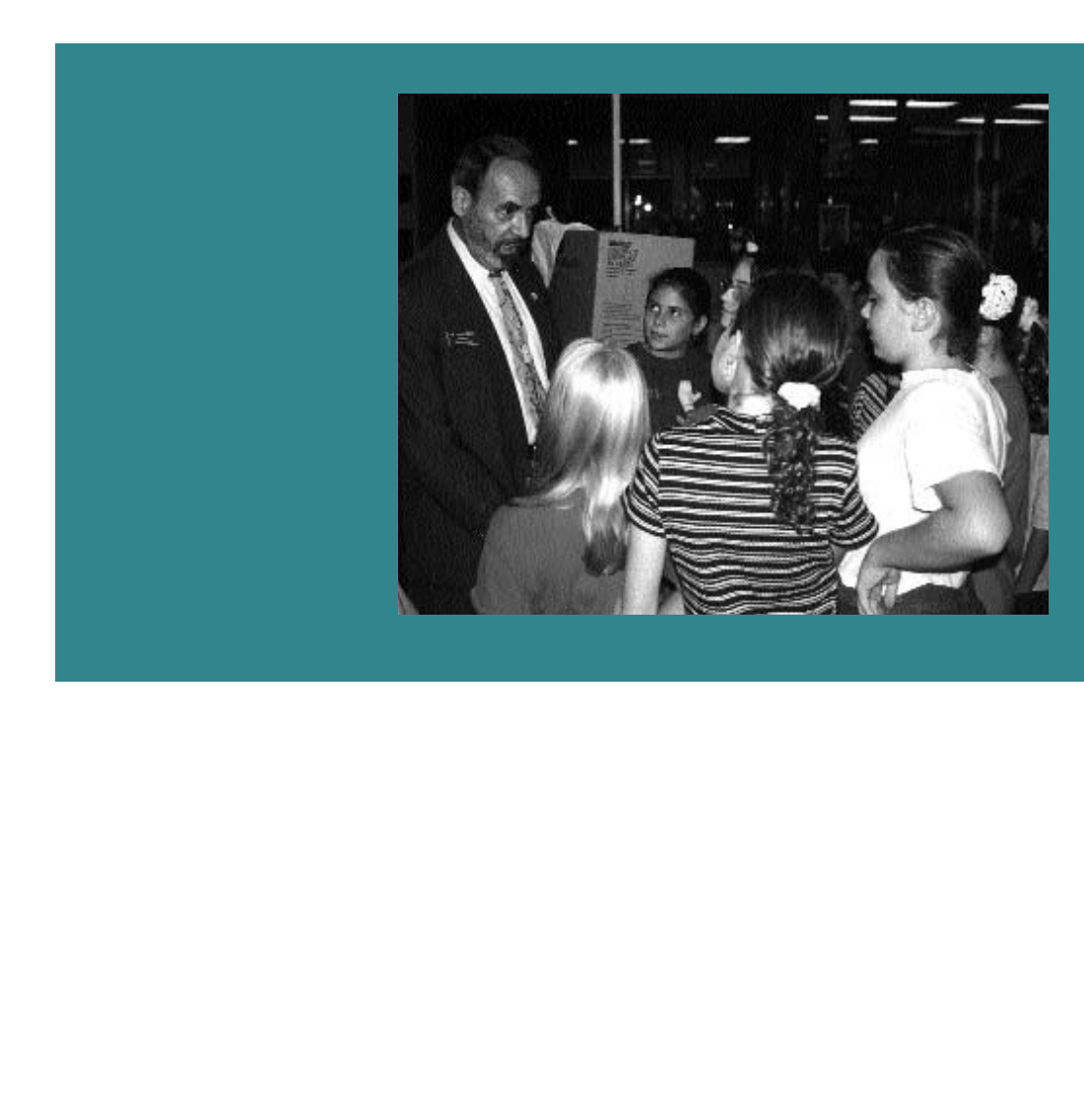
By Donna Miles
T
wenty-eight years in the Foreign Service taught
Joe Terranova a lot about managing budgets,
running administrative offices and working with
a wide variety of people.
But little did the Washington, D.C., native realize when
he retired as executive director of the Foreign Service
Institute in 1980 that he’d built the perfect
résumé for a new career as mayor of
Winter Park, Fla.
“There’s a great similarity between
what I did in the Foreign Service and in
running a city,” said Mr. Terranova,
whose State assignments included duty
in Monrovia, Madrid, Belgrade, Karachi,
Saigon and Paris. He said he learned at those posts
about many of the services his 425 employees provide
Winter Park residents: police, water purification, sewer
and trash removal services, among them.
“When you’re in administration in an embassy opera-
tion, you work with the full range of services, particular-
ly at hardship posts,” Mr. Terranova said. “My Foreign
Service experience has helped me quite a bit in under-
standing the operation of running a city.”
Mr. Terranova said he wasn’t thinking about a future in
politics when he and his wife, Pat Killarny, retired to cen-
tral Florida. But as he got active in the local community—
as president of the city’s university club, a trustee on the
library board and a Chamber of Commerce member—
Mr. Terranova found himself increasingly involved in
city politics.
He entered politics in 1993, winning a seat on the
Winter Park City Commission. Two years later he was
appointed vice mayor. When he thought about running
for mayor, he said he had a long discussion with his wife
and she said, “Joe, go for it.”
He admits the campaign was tough,
with three other Winter Park residents in
the race. Mr. Terranova said Pat, whom
he married after she retired from the
Foreign Service in 1979, stood by him all
the way.
When the polls closed on election day,
Mr. Terranova had won by just one vote.
“The election was so close, they had to
recount it. Turns out they had made a mistake and I had
one additional vote,” he said, adding with a laugh, “That
doubled my lead.”
After almost a year in office, Mr. Terranova is still
enjoying the challenges of the job. He called it “a great
career for people who enjoy working with all sorts of
people on all sorts of contentious issues, and working to
reach a consensus.
“Being a city mayor has been a great opportunity and
a great challenge for me,” he said. “It’s a job I’d definite-
ly recommend for other Foreign Service people.”
I
February 11
Mister
Mayor
A Foreign Service career
provided a retiree with
the foundation he needed
to run a city government.
“My Foreign Service
experience has helped
me quite a bit in under-
standing the operation
of running a city.”
Mayor Joe Terranova meets with children in Winter Park, Fla.
Photo by Lucy Little

Perhaps not everyone in the I
Bureau is as obsessed with tending
to the field’s needs as Mr. Prieto, but
his approach—wired and ready to
provide customers with whatever
their jobs require—is typical of the
bureau’s 367 employees. Their job, in
a nutshell, is to help agency staff
members overseas reach foreign
opinion makers with policy informa-
tion, quickly and authoritatively.
“Across the board in the I Bureau,”
said Marrie Schaefer, a Foreign
Service officer who works with Mr.
Prieto on the East Asia Team, “people
see themselves as professionals.
There is a can-do attitude, and initia-
tive is genuinely encouraged. You
become more creative, you work
harder, and you see results.”
These views are a relatively recent
outgrowth of the team-oriented man-
agement style the bureau adopted
when it was launched Oct. 1, 1994.
Facing a downsizing directive from
the Office of Management and
Budget, USIA Director Joseph Duffey
concentrated the cuts—not 3 percent
across the board but 30 percent in
one part of the agency. Four task
forces of nearly 100 employees met
for five weeks to discuss how to cope
with the required cutbacks and how
best to structure the new organiza-
tion. Several long-standing agency
products like the Washington-based
magazines and exhibits service were
phased out, and many employees
took buyouts.
“Very early on,” Barry Fulton, the I
Bureau’s first associate director,
remembered, “someone suggested a
team-based approach, and everyone
agreed after only 10 or 15 minutes of
discussion without really understand-
ing what a radical transformation this
would mean. Union representatives
liked the idea of cutting out layers of
bureaucracy. Management saw it as a
way of continuing to do the work
with fewer people.”
The I Bureau’s structure and man-
agement style are nothing new to
American corporations. In recent
years, many have adopted a similar
set of ideas, ranging from W. Edward
Deming’s Total Quality Management
concept to those in such business
best-sellers as Michael Hammer’s
Reengineering the Corporation or The
Wisdom of Teams by Jon Katzenbach
and Douglas Smith.
In the I Bureau approach, cross-
disciplinary teams of professionals
working in small groups provide
products and services to USIA’s field
posts. One type of team is “geo-
graphic.” I/GNEA, for example,
takes care of Near East/South Asia
posts. Its 16-person staff consists of a
team leader, writer-editors, field
service officers, Arabic translators, a
book officer, information resource
officers and a program assistant.
Each day the team puts together in
both English and Arabic a regional
edition of the Washington File, the
compendium of official texts and
transcripts by U.S. government offi-
cials that goes to all missions. The
team’s two information resource
officers spend much of their time
traveling throughout the region to
advise posts on transforming agency
libraries overseas into information
resource centers. Smaller and less
costly than libraries serving the pub-
lic, these centers use on-line technol-
ogy to get the U.S. position on key
issues to an elite audience of foreign
officials, journalists and academics.
A second kind of permanent team,
“thematic,” deals with specific sub-
12 State Magazine
USIA
By George Clack
Inside USIA’s Information Bureau
T
he last thing Steve Prieto does each night before
going to bed is to check his e-mail. The overseas
posts Mr. Prieto is responsible for as a field service offi-
cer with the East Asia Team in the U.S. Information
Agency’s Information Bureau are 12 or 13 hours ahead
of Washington time. Before another day passes he
wants to see whether he can answer any queries quick-
ly or let a post know that a problem involving some I
Bureau product is being worked on.
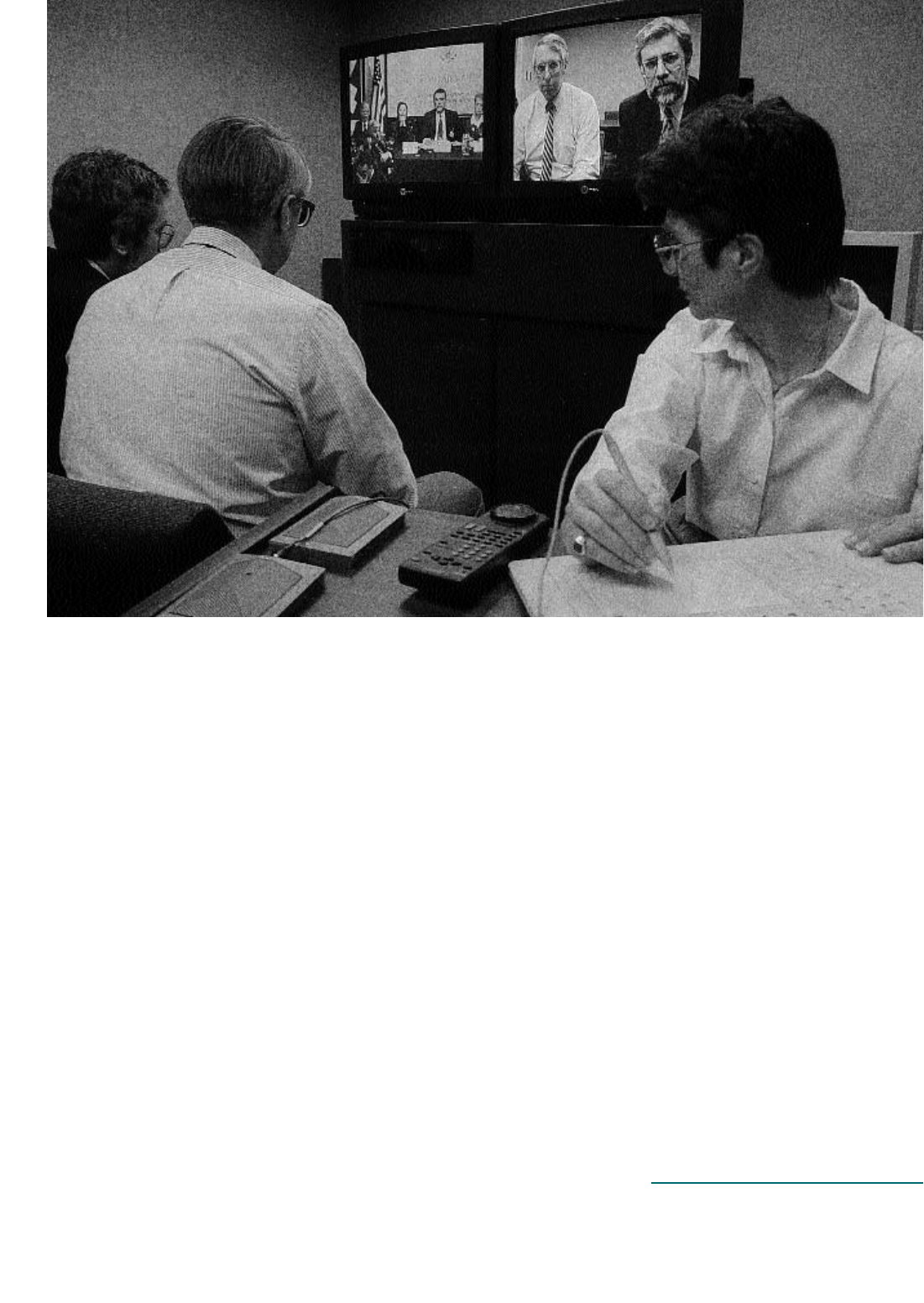
ject matter. For example, I/TDHR
produces information on democracy
and human rights via Washington
File pieces, electronic journals, web
sites on the Internet and U.S. experts
who travel abroad to discuss issues
with invited audiences at posts. The
team’s 12-person staff includes a
team leader, writer-editors, speaker
programmers, reference specialists
and a program assistant.
The bureau also has ad hoc teams
that pool in-house expertise to tackle
a particular project or problem, then
disband when the issue is closed.
One group, for example, created a
multimedia CD-ROM to answer
prospective foreign students’ ques-
tions about attending U.S. colleges.
During the 18-month project, more
than 20 different employees—graph-
ic designers, writer-editors, comput-
er experts, photo editors, speaker
programmers, a reference specialist
and a TV producer—from eight per-
manent teams worked on the task.
On a smaller scale, other ad hoc
teams formulated bureau-wide poli-
cies on telecommuting, devised a
career ladder system for translators
and built web sites on such topics as
the Denver Economic Summit.
More than a buzzword in the I
Bureau, “empowerment” is probably
the key to making the culture work.
“Things are definitely less bureau-
cratic,” said Estelle Baird, a speaker-
programmer with the Democracy
and Human Rights Team. “When
you see there is a problem, you take
action to solve it.”
“We don’t simply do our own
thing, though,” said Peg McKay, a
writer-editor with the Political
Security Team. “When I was man-
aging editor for an issue of our
team’s electronic journal, I spent a
lot of time consulting with area
offices about the authors, approach-
es, manuscripts. Someone at my
level never would have done that
pre–I Bureau.”
In the I Bureau, empowerment is
also a logical consequence of down-
sizing and delayering. The employ-
ee-to-supervisor ratio went from 4:1
in its predecessor organization to
13:1 today. So team leaders see them-
selves more as coaches, facilitators
and direction setters than as tradi-
tional managers who need to know
all the answers. Decision making on
most matters is shared, and top-
down decisions are rare.
A second basic principle is bureau
leaders’ commitment to the latest
information technology. “This was
an underlying assumption of the
new bureau,” said Myron “Mike”
Hoffmann, current acting associate
director and the deputy bureau
chief from the beginning. “With
shrinking resources, the best way to
February 13
The author is leader of the I Bureau’s
Copyright and Print Publications Team.
Bureau employees test digital videoconferencing equipment. Videoconferences with overseas posts jumped from fewer than 20 a
year in the early 1990s to 104 in 1997.
Continued on next page
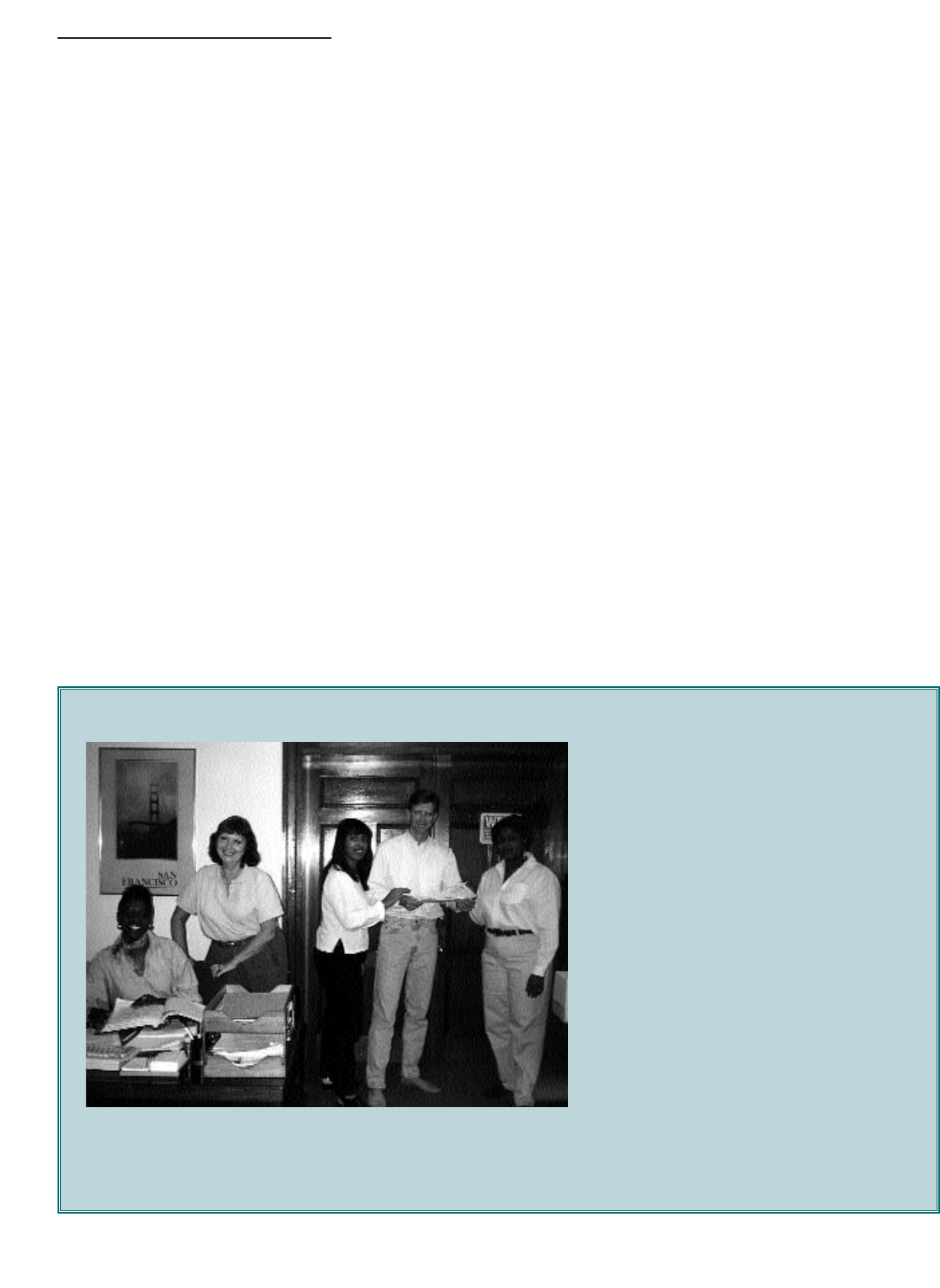
Workers at the U.S. consulate general in Hamilton, Bermuda, don
denim to raise money for diabetes awareness education.
home page, consistently rated as
one of the best government web
sites, includes an archive of the daily
Washington File as well as special
sections on trade issues, NATO
enlargement and the Atlantic
Community, the global environ-
ment, the Middle East peace
process, U.S. relations with China
and U.S. commitment to democracy
and human rights. The Electronic
Media Team has primary responsi-
bility for this home page and works
with knowledgeable staff from the
geographic and thematic teams to
create new material. But virtually
every team has developed at least
one Internet expert skilled enough
to launch or update a web site.
Because empowerment requires
the right kind of leadership, the
bureau devotes much effort to
selecting new team leaders and
office directors and training them in
its culture. “Leadership in the I
Bureau calls for some qualities not
always shared by otherwise excel-
lent leaders,” said Mike Hoffmann.
“People who have hyperactive egos,
who feel impelled to be involved in
maintain operations in the field is to
exploit technology to deliver infor-
mation rapidly and efficiently.
Technology is not an end in itself,
but a way to make up for deficien-
cies in resources.”
This high-tech approach has a vari-
ety of consequences. Every employ-
ee, for instance, is expected to spend
at least 12 hours a month learning
new work-related skills—primarily
computer skills. Everybody in the
bureau has had full desktop accessi-
bility to the World Wide Web for
more than a year, and for most staff,
information gathering on the Internet
is now a routine part of their jobs.
Because of its speed, e-mail has
replaced cables as the preferred mode
of communication with field posts.
One of the very few diktats from sen-
ior management requires all inquiries
from posts to be answered within 48
hours, a principle that’s taken deep
root in the bureau’s culture.
Another major push has been in
developing the agency’s Internet
presence. The agency’s international
14 State Magazine
all decisions, will probably not be
the best possible leaders for the I
Bureau. You must have the confi-
dence as a leader to set directions
and establish parameters and then
allow the very smart people around
you to do their jobs.” To ensure that
leaders get good, systematic feed-
back on their performance, all team
leaders, all office directors and even
the bureau associate director and
deputy go through an annual 360-
degree evaluation by their peers,
staff and supervisors.
Every effort is made to ensure that
focus on the I Bureau’s management
practices is reflected in its bottom
line: results in the field. “We’ve had
two major successes,” said Barry
Fulton, who left the bureau last
spring. “First, the innovation and
creativity we unleashed in the shape
of new and better products, and,
second, the fact that productivity is
up as well. Today the bureau’s staff
is 38 percent smaller, but there’s no
doubt the amount of work accom-
plished is 80 to 90 percent of what it
was before.”
I
USIA Continued
Bermuda Shorts
Go Denim
Employees at the U.S. consulate general
in Hamilton, Bermuda, recently traded
their Bermuda shorts for denims and
joined a community effort to highlight the
dangers of diabetes.
The island-wide observation of “Denim
Day” was sponsored by the Bermuda
Diabetic Association to raise funds for dia-
betes awareness education. Consulate
general staffers joined local businesses in
donating funds to the cause in exchange
for wearing jeans to work for the day. The
event was hailed as a big success.
—Jamie W. Carlington
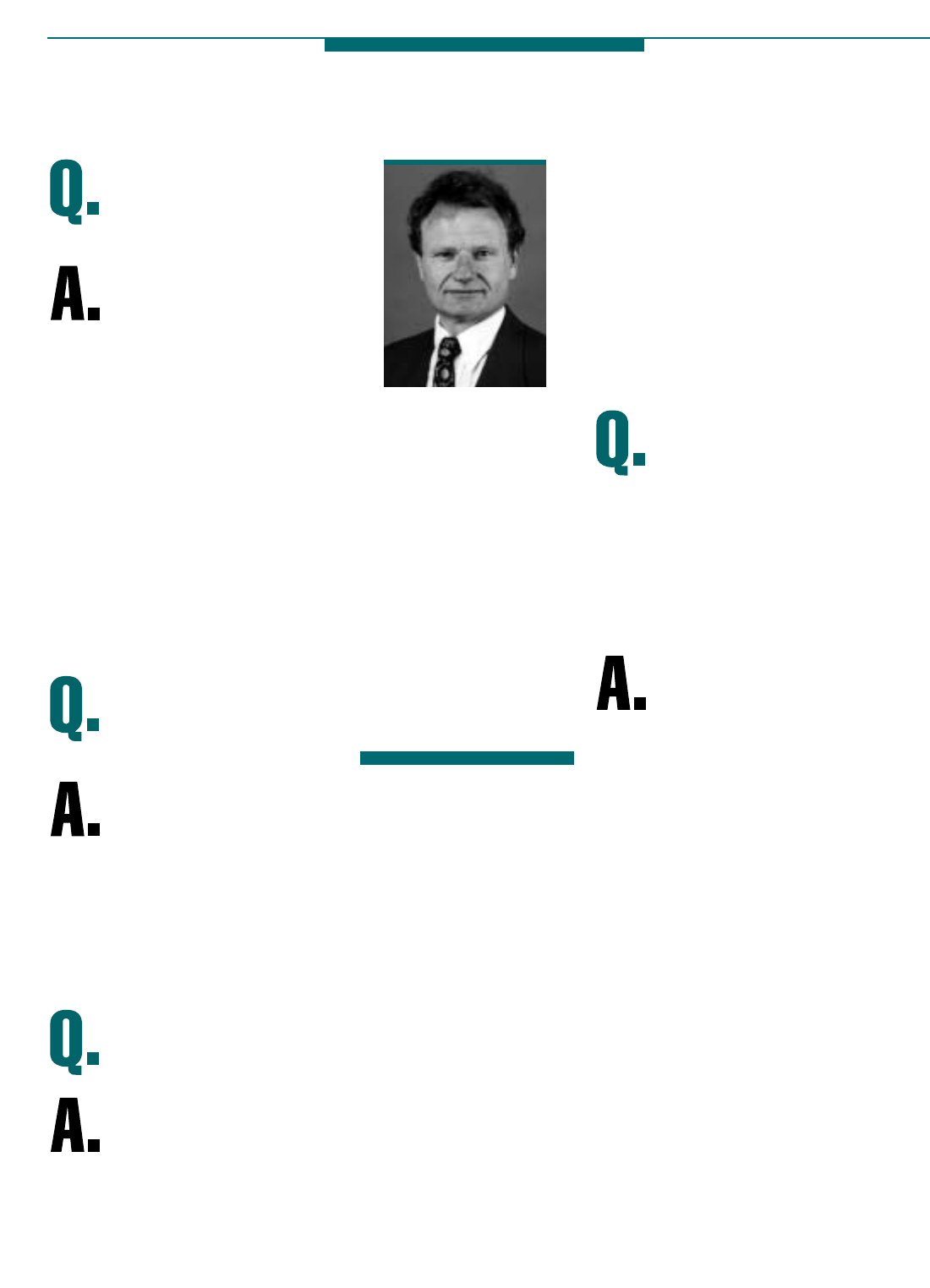
I’ve read a lot about air pollu-
tion and smog, and that the air
in Los Angeles is improving.
What exactly is smog?—EUR
According to Webster’s New
World Dictionary, the original
meaning of smog was “a nox-
ious mixture of fog and
smoke.” Over the years, it has come to
mean a “low-lying, perceptible layer of
polluted air.” It’s produced by complex
photochemical reactions of a combina-
tion of pollutants from many sources,
including smokestacks, vehicle exhaust,
curing paint and solvents, and sunlight.
Ground-level ozone is the primary pol-
lutant associated with smog. Weather
and geography greatly influence how
bad smog gets and where it accumu-
lates. Wind may blow smog-forming
pollutants some distance from their
sources, and lack of wind can cause
smog to stagnate for days.
I’m concerned about pesticide
use in our home overseas.
How can I learn more about
safe pest control?—ARA
An excellent place to start is a recently developed
16-page booklet, Pest Management in Your Home—
A Guide to Integrated Pest Management of Common
Household Pests for Overseas Families. It looks at
integrated pest management and describes safe, effective
and long-lasting measures for combating common house-
hold pests including roaches, ants and rodents. The booklet
is being printed now and should be available soon in your
post’s Community Liaison Office.
I’ve noticed a number of strange brands of bot-
tled water available locally. Should I assume
they’re safe to drink?—AF
No. In some parts of the world, drinking bottled
water can be risky. A few years ago, a regional
medical officer reported a case of an American
who developed typhoid from drinking bottled
water while working for the United Nations in an
African city. It turned out that an unscrupulous business-
man was filling used bottles of a local brand of
water with tap water and resealing them. In
the United States, the Food and Drug
Administra-tion oversees bottled water quali-
ty, enforcing Environmental Protection
Agency standards. There’s no assurance that
bottled water purchased locally is not microbi-
ologically contaminated. So when in doubt,
check with your health unit regarding local
suppliers or boil water for three minutes
before drinking it.
I’m an information management
specialist who spends 90 percent of
the workday at my computer. In
recent years, I’ve heard many of my
colleagues complain about numbness, pain
and tingling in their hands and wrists, and
some have been diagnosed with carpal tunnel
syndrome. I, on the other hand, have been
experiencing pain between my neck and right
shoulder for about six months. Could my
computer use be the problem?—DC
Yes, it’s possible that your condition
is computer related. In the past year,
our office has conducted numerous
ergonomic workstation assessments for
employees who reported symptoms of carpal
tunnel syndrome and other cumulative trau-
ma, including shoulder pain. These employees were all
intensive mouse users and invariably had been using their
mouse on their worktables instead of on their keyboard
trays—producing awkward and stressful positions.
The goal of ergonomic assessments is to adjust and
arrange your work area to help you work comfortably
and productively. To help relieve some of the strain on
your shoulder, try placing your mouse on your keyboard
and position the tray to the neutral position. The mouse,
like the keyboard, should be positioned so that as you
type or use your mouse, your elbows rest comfortably at
your sides and your hands and wrists become a natural
extension of your forearms. When you use your mouse
in the proper position, your shoulders should relax as
your arms fall naturally at your sides. Of course, you
should see a physician to get a professional evaluation of
your condition.
February 15
SS AA FF EE TT YY SS CC EE NN EE
This column is written by
Stephen Urman, director of
the Office of Safety/ Health
and Environmental Man-
agement. You may send
questions to Mr. Urman at
A/FBO/OPS/SAF, SA–6,
Room L–300, Washington,
D.C. 20522, or write to the
editor. (Your privacy will be
respected.) Department poli-
cy prohibits reprisal actions
against employees who
express concerns regarding
unsafe or unhealthful work-
ing conditions.
BY STEPHEN URMAN
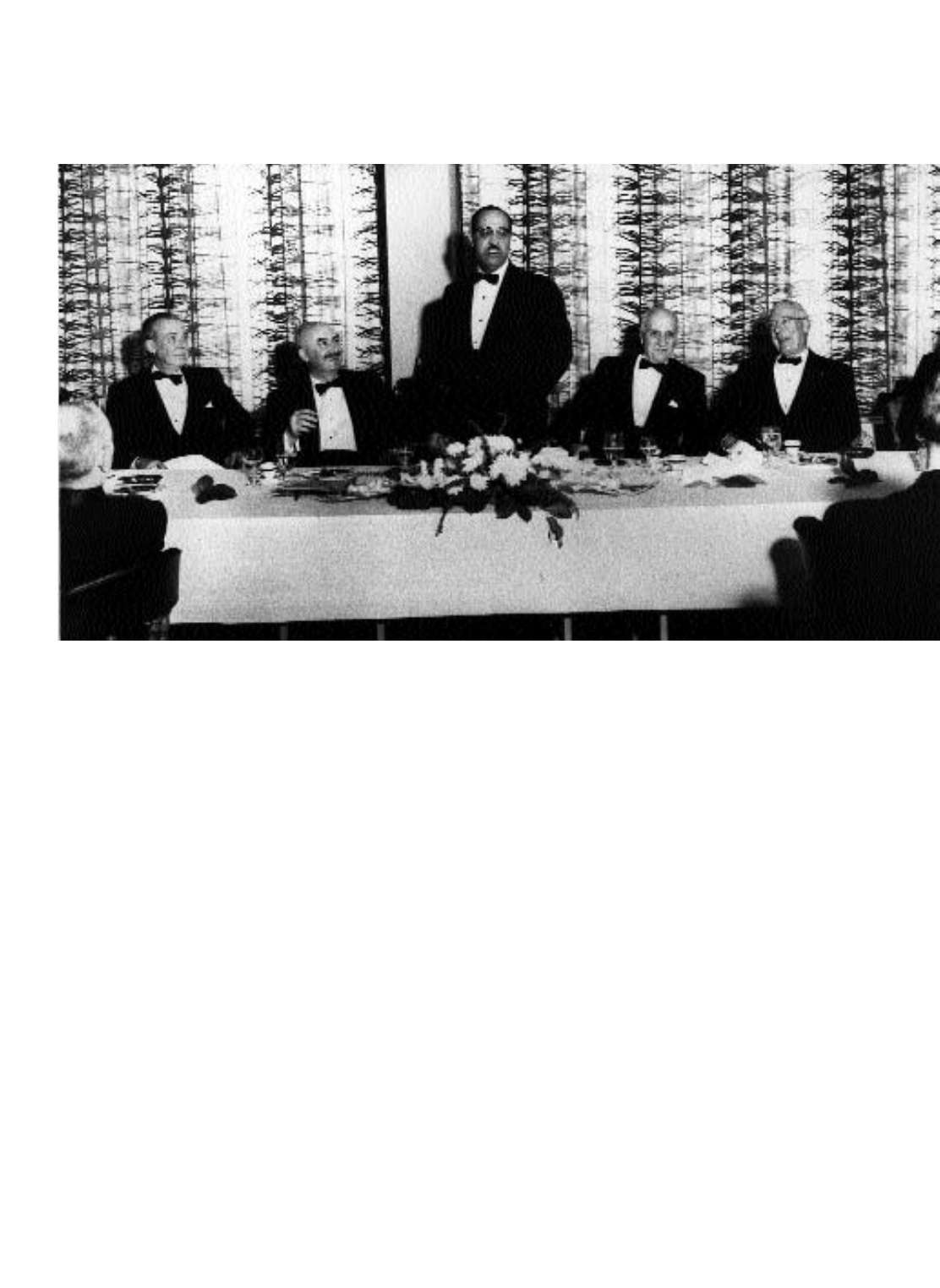
16 State Magazine
The Civil War was barely over when
Ebenezer D. Bassett declared his intention
to become the United States’ first black
diplomat. Born in Litchfield, Conn., in 1833,
the son of a mulatto and a Pequot Indian
had built an impressive résumé for the job:
honor student, teacher and principal.
I
n 1869, Mr. Bassett’s dreams were realized when
President Ulysses S. Grant named him minister resi-
dent and consul general to Haiti. In accepting the job
of overseeing U.S. diplomatic relations with Haiti as
it struggled against strife and revolution, Mr. Bassett
forged the first of many milestones for black Americans
within the State Department.
Those milestones are being celebrated throughout
Black History Month as State observes the contributions
of black Americans to U.S. foreign policy.
As of Dec. 31, 1997, 67 black Americans—46 of them
career officers—have served as chiefs of mission. And sev-
eral black Americans hold top principal officer posts. Ruth
Davis was named director of the National Foreign Affairs
Training Center last July, David R. Andrews became the
Department’s legal adviser last September and Susan Rice
is now the assistant secretary for African Affairs.
The road that led to these appointments had its share
of bumps. Two years after Mr. Bassett’s appointment to
Haiti, President Grant named James Milton Turner
ambassador to Liberia. For many years, State limited its
appointments of black consular and diplomatic officers
to these two countries.
But the assignments of three career consuls in 1906,
together with a fourth black career officer appointed in
1899, slowly expanded the Department’s policies about
assignments for its black diplomats. James Garneth
Carter, tailor, letter carrier and newspaper manager, was
appointed to the consulate at Madagascar in 1906.
William J. Yerby, a medical doctor, was appointed to
Sierra Leone in 1906 and transferred to Senegal in 1920.
James Weldon Johnson, songwriter and poet, was
appointed consul at Puerto Cabello, Venezuela, and later
to Corinto, Nicaragua.
These posts were small, in tropical countries, and
unpopular with most officers. Black clerks and vice con-
suls went as support staff. When black personnel were
transferred, it was usually to another post where blacks
Celebrating Blacks in Foreign Affairs
Friends and colleagues join Ambassador Clifton R. Wharton on his retirement in 1964.
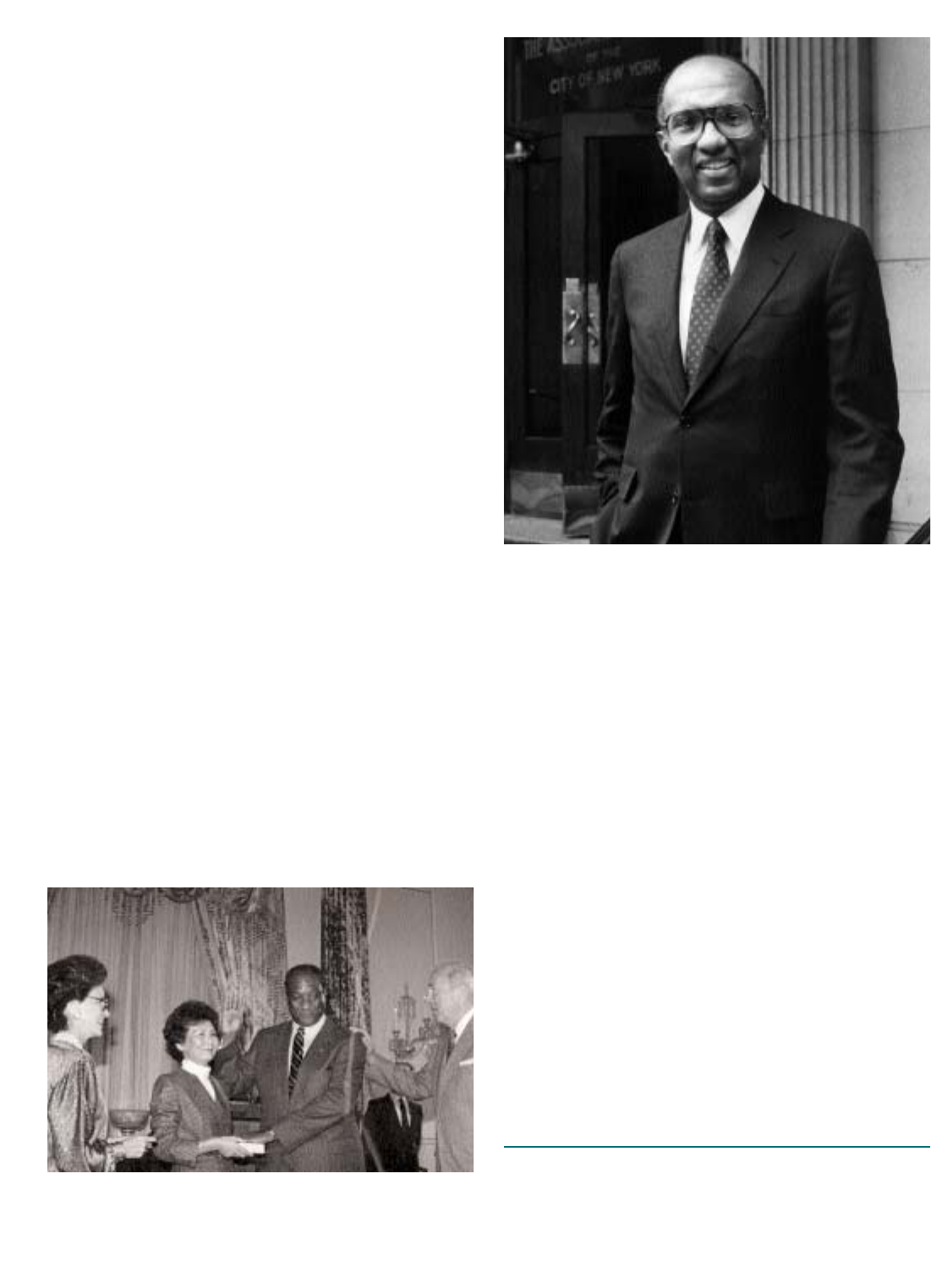
February 17
were posted: the African countries, the Canary Islands,
the Azores, Portugal and France.
After passage of the Rogers Act in 1924—legislation
that established a career service in which merit alone was
the basis for appointment and promotion—William H.
Hunt, Yerby and Carter became the first black career offi-
cers in the new Foreign Service.
That same year, Clifton R. Wharton began a career with
the Department that was to span more than four decades,
during which he would rise from a law clerkship to become
the first black career minister in the Foreign Service. When
he arrived at State, Mr. Wharton was the Department’s only
black employee in a professional position.
After passing the Foreign Service examinations, he
reported to Monrovia, Liberia, where he served for five
years before becoming the first black officer to be posted
to Las Palmas in the Canary Islands. He later served in
Madagascar; Oporto, Portugal; and the Azores.
Ambassador Wharton’s first break from the pattern of
assignments for blacks came in 1949, when he was
assigned as consul general and first secretary at Lisbon.
Soon after, he also became supervisory consul general for
Portugal and the adjacent Portuguese islands. The post-
ing represented a double victory. Not only was he the
first black officer at Lisbon, he was the senior officer as
well. From that post, Mr. Wharton continued his list of
firsts: first black Foreign Service officer at Moron,
Argentina, next Romania, then Norway.
Loy Henderson, deputy undersecretary for Adminis-
tration, recalled in a letter to Mr. Wharton, “One of the
most unforgettable moments of my Foreign Service life
was my conversation with you when you flew from
Marseilles to Washington in order to make sure that your
appointment as minister of Romania was based on merit
and qualification—not on racial considerations.” He con-
tinued, “You made it clear to me that if the matter of race
had been one of the criteria, you would not be able to
accept the appointment. I was deeply touched and glad
to tell you that race had not been a factor.”
Again, when Mr. Wharton was appointed ambassador
to Norway, the Washington Post ran an editorial that read,
“The post goes to Mr. Wharton because he deserves it,
not because he happens to be a Negro.”
After he retired in 1964, Mr. Wharton credited persist-
ence, stamina and faith for helping him overcome racial
hurdles to forge a successful Foreign Service career. His
son, Clifton Wharton Jr., followed in his father’s foot-
steps, becoming the first African-American to serve as
deputy secretary of State in 1993, although he resigned
after just nine months on the job.
Mr. Wharton Sr. also paved the way for a long list of
other black Americans to assume top-level positions
within the Department. Edward Perkins became the first
black director general of the Foreign Service and director
of Personnel in 1989.
Aurelia Brazeal, now principal deputy assistant secre-
tary for East Asia and Pacific Affairs, was the first African-
American woman in the career Foreign Service to advance
from entry level to the senior ranks and, in 1990, to an
ambassadorship. In 1993, George Moose became the first
African American to serve as assistant secretary for
African Affairs. That same year, Conrad K. Harper was
named State’s first African-American legal adviser.
I
This article was compiled from several feature stories written in
the late 1970s and 1980 by Homer L. Calkin, a former member
of the Department’s Historical Office.
Conrad K. Harper, State’s first African-American legal adviser.
Ted Perkins is sworn in as ambassador to South Africa. Also
pictured are Mrs. Perkins and Secretary George Schultz.


Like all baby boomers, the Bureau has been shaped by
the ever-changing postwar environment. Initially, there
were offices, then later deputy assistant secretaries, for
International Trade Policy, Financial Development Policy
and Transportation and Communications Policy.
International resources were added to the Bureau’s
responsibilities in response to material needs associated
with the Korean War. The Cold War brought an Office of
Economic Defense and Trade Policy to restrict communist
access to strategic goods and technologies. Much later,
détente would see this part of EB evolve into the Office of
East-West Trade, and defense-related trade controls
moved to the Bureau of Political and Military Affairs.
Growing energy imports added fuels and energy to the
resources portfolio, and the oil embargo of the 1970s led
the Bureau heavily into international energy policy.
The steady growth of international trade and invest-
ment, together with the growing interdependence of for-
eign policy issues and multinational business activities,
increasingly engaged the Department in dialogue with
the U.S. and international business communities and
domestically oriented economic agencies. In 1972, “E
February 19
Economic and
Business Affairs
T
he Bureau of Economic and Busi-
ness Affairs is a baby boomer. It
was born in December 1944, when
the Department created an assistant
secretary for Economic Affairs to over-
see its economic staff. The Bureau
played a key role in establishing the
major post war institutions of Western
economic recovery and continuing
prosperity. They include the Inter-
national Monetary Fund, World Bank
and General Agreement on Tariffs and
Trade, now the World Trade Organi-
zation, among others.
Bureau of the Month:
The Bureau actively promotes programs
that reduce U.S. dependence on oil to
enhance U.S. energy security.
Photo courtesy of Department of Energy
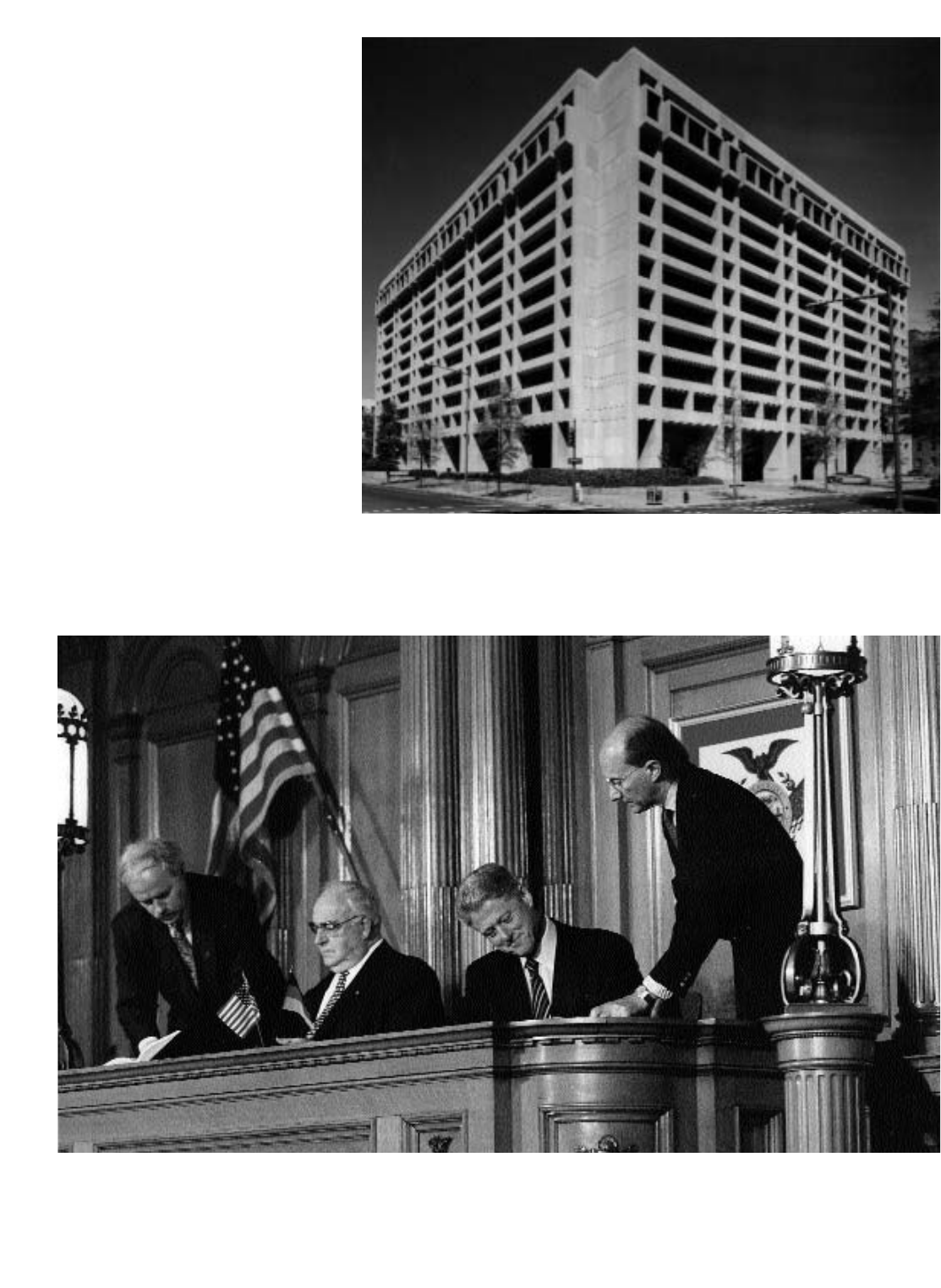
Bureau” became the Bureau of
Economic and Business Affairs—
”EB.” Its offices today maintain close
ties with a vast range of U.S. busi-
nesses and trade and labor organiza-
tions, providing the Department’s
main day-to-day interface with the
commercial private sector. These
offices also serve as the Department’s
main representatives in the intera-
gency economic policy forums.
As de facto home base for the
Department’s 1,000-plus economic
officers, EB serves as the unofficial
custodian of the Foreign Service eco-
nomic function. Its management
works with the undersecretary for
Economic and Agricultural Affairs,
the Bureau of Personnel, the
National Foreign Affairs Training
Center and the regional bureaus to
ensure that the Department recruits
and trains talented economic officers
to fill its domestic and overseas
needs. EB also works with the
regional bureaus and the director
general to ensure that officers with
strong track records on economics
20 State Magazine
German Chancellor Helmut Kohl and President Bill Clinton sign the “Open Skies” bilateral aviation agreement. The Economic
Bureau served as lead U.S. negotiator.
The Bureau’s International Finance and Development Office represents State at the
International Monetary Fund, above, and a variety of other economic and financial
organizations.
Photo courtesy of International Monetary Fund
Photo courtesy of the White House
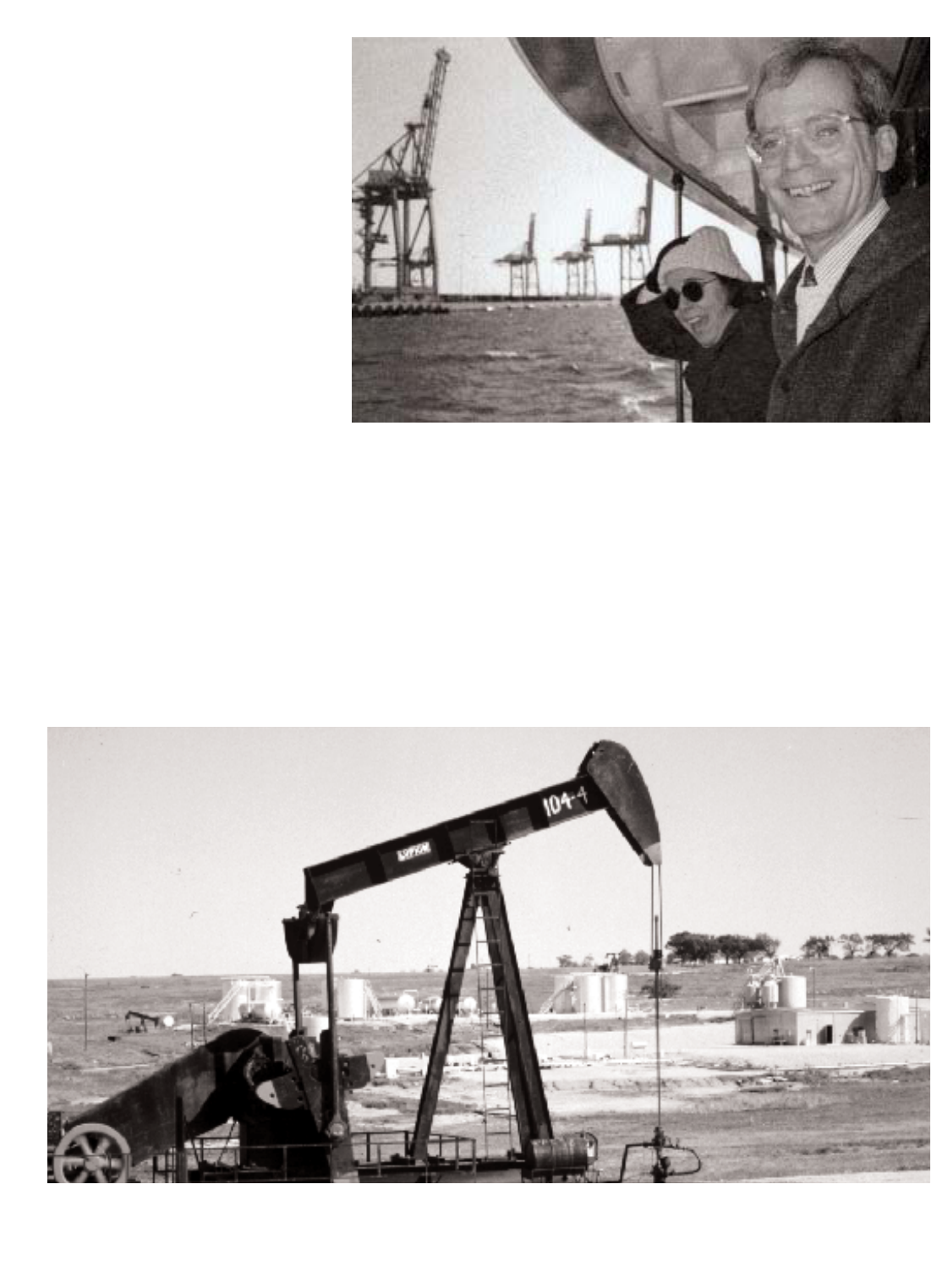
are placed in key leadership posi-
tions in posts where these issues are
central to the relationship.
The vast range and complexity of
today’s global economy and the spe-
cialized nature of some international
economic organizations involve EB in
a host of fascinating issues, from reg-
ulating the processing of pet food to
allocating radio frequencies to new
satellite-based global mobile tele-
phone companies to managing the
current Asian economic upheavals.
Managing such a far-ranging portfo-
lio requires EB’s organization and
staffing to reflect the diversity of
domestic agencies, private sector
groups and international institutions
involved. EB has some 200 officers
and support staff organized along
functional lines under five deputy
assistant secretaries.
International Communications
and Information Policy manages the
Department’s involvement in policy
for the booming telecommunications
and information industries. CIP, an
independent bureau from 1983 until
joining EB in 1995, oversees and
coordinates policy for U.S. participa-
tion in international organizations
involved in communications and
February 21
information policy, satellite and
cable policy and a variety of
telecommunications trade and infra-
structure development initiatives.
Energy, Sanctions and Commod-
ities plays a key role in developing
and implementing U.S. economic
sanctions, such as embargoes and
export controls, that aim to achieve
foreign policy objectives while tak-
ing into account U.S. competitive-
ness. Congress and policy makers in
the post Cold War era look more
and more to economic sanctions as
the tool of first resort to achieve for-
eign policy objectives when persua-
sion fails. ESC also develops and
supervises policies to enhance U.S.
EB’s Steve Miller and Peg Caton visit the port facilities in Baltimore as part of the
Bureau’s focus on foreign policy aspects of maritime issues.
Enhancing diversification of energy supplies is a goal of the Energy, Sanction, and Commodities Office.
Photo courtesy of the U.S. Department of Energy

energy security through diversifica-
tion of supply, conservation, con-
sumer country cohesion and prepa-
ration for supply disruptions, as
well as dialogue with individual
producer nations, including OPEC,
the Newly Independent States,
Canada and Mexico.
International Finance and Devel-op
ment provides the Department’s
financial analysis and economic poli-
cy recommendations in response to
specific regional needs such as the
Asian financial crisis and to guide the
overall thrust and composition of
bilateral and multilateral develop-
ment assistance. IFD works closely
with the Treasury Department and
Agency for International Develop-
ment on the foreign policy aspects of
monetary issues, development
finance, investment policy and eco-
nomic reform in developing countries
and economies in transition. It repre-
sents the Department in the U.S.
Export-Import Bank, the International
Monetary Fund, the World Bank and
regional development banks, and the
financial and investment committees
of the Organization for Economic
Cooperation and Development.
Trade Policy and Programs takes
the lead for the Department in pursu-
ing trade liberalization through bilat-
eral and multilateral trade negotia-
tions. It represents the Department in
the formal and informal interagency
trade policy coordinating processes,
such as the National Economic
Council and Trade Policy Review
Group. TPP develops and imple-
ments Department policy on multilat-
eral trade issues in the World Trade
Organization and in regional or bilat-
eral forums such as the Asia-Pacific
Economic Cooperation forum, the
North America Free Trade Agreement
and the Japan Framework talks. It
also handles important industrial sec-
tor issues such as intellectual proper-
ty, competition policy, agricultural
trade and the textile program.
State, in cooperation with the
Transportation Department, has spe-
cial responsibility for negotiating
bilateral aviation agreements with
foreign governments, and Tanspor-
tation Affairs is the chief aviation
negotiator for the United States. TRA
is pressing for the liberalization of
international aviation policies of U.S.
partners by building on the “Open
Skies” principles it has negotiated
into agreements with 28 countries.
TRA is also responsible for coordi-
nating and implementing foreign
policy aspects of aviation safety and
security policies, as well as maritime
and land transportation issues.
I
22 State Magazine
A tanker offloads oil into underground storage areas—an effort to reduce U.S. vulnerability to shortages of petroleum.
The Bureau maintains dialogue with oil-producing nations to help prevent supply disruptions.
Photo courtesy of the Energy Department
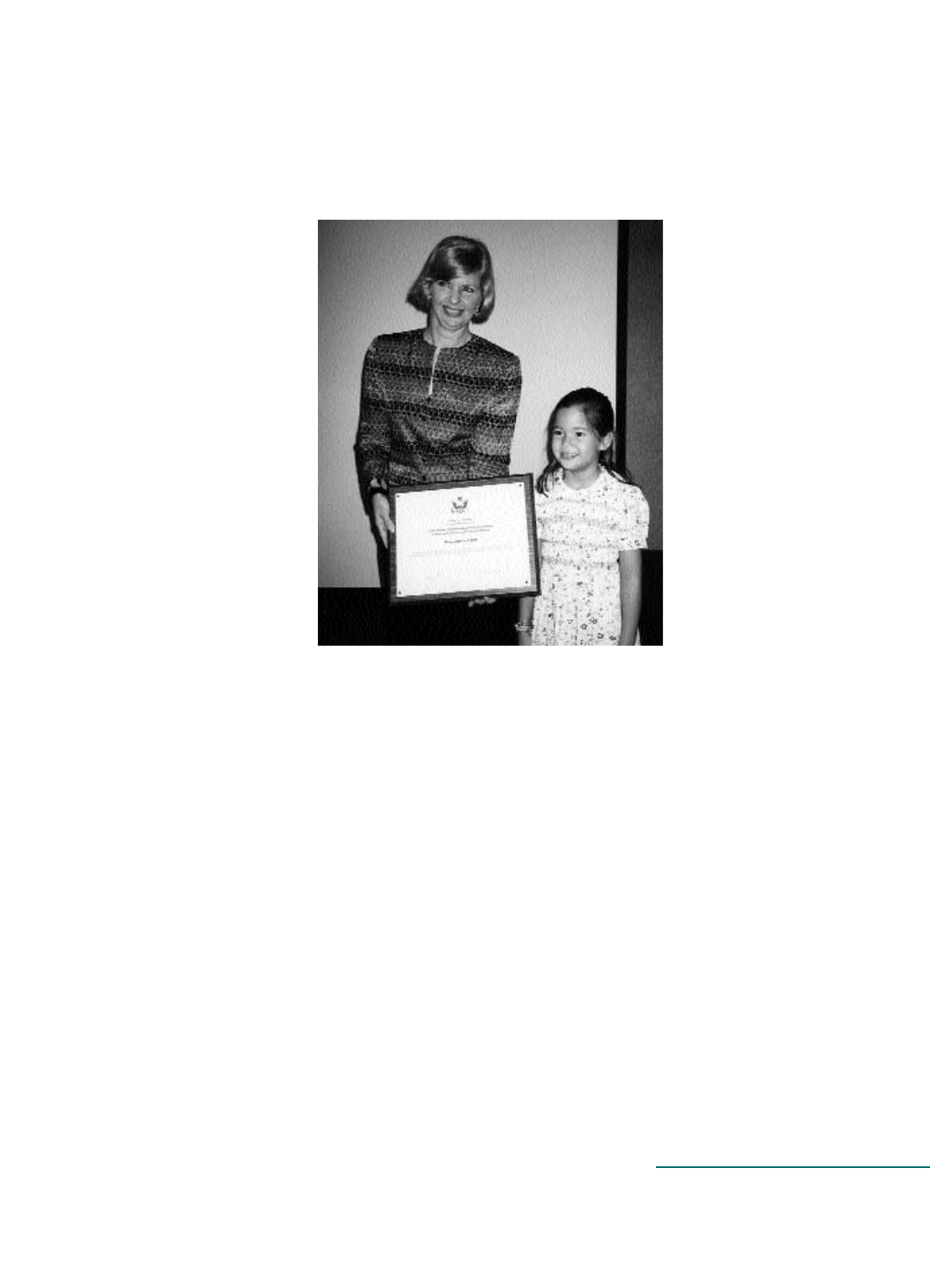
By Alan P. Larson
T
his year I chaired the
selection committee for
the Salzman Award for
Excellence in International
Economic Work and served on the
selection committee for the Cobb
Awards. This was a special honor,
for I’ve known and worked with
both Ambassador Charles E. Cobb
and the late Ambassador Herb
Salzman. While many factors con-
tributed to the conspicuous success
of the outstanding officers we
reviewed, a single theme emerged:
Strong, effective advocacy of U.S.
economic policies and commercial
interests is the key to success.
As ambassador to the Paris-
based Organization for Economic
Cooperation and Development from
1977 to 1981, Ambassador Salzman
established the Salzman Award in
1981 to recognize outstanding con-
tributions in advancing U.S. interna-
tional relations and policy objectives
in the economic field. Rita Fredericks
Salzman and the Salzman family
continue to support the award in his
memory. In 1997 Ambassador
Salzman’s son Anthony presented
the award to Mary Janice Fleck in
Kuala Lumpur.
The committee was impressed with
1997’s Salzman nominations, cover-
ing 12 officers and the first nomina-
tion of a team of two officers working
on the same or closely related issues.
The choice among the three finalists
was especially difficult, and the com-
mittee recognized outstanding contri-
butions by all three. The committee
chose Ms. Fleck for policy advocacy,
key to securing Malaysian support for
vital U.S. policy objectives in the
World Trade Organization’s Infor-
mation Technology Agreement and
for U.S. “Open Skies” civil aviation
policies. She also encouraged
Malaysian leadership to support our
common interests with other coun-
tries in the region.
The Cobb Awards, one for chiefs
of mission and another for officers
below the rank of chief of mission,
are funded by Mr. Cobb, former
ambassador to Iceland.
The two winners, Michael Delany
and Ambassador A. Elizabeth Jones,
represent radically different work-
ing environments. But their nomina-
tions highlight a common focus on
identifying interests and opportuni-
ties for U.S. business, exercising
leadership in working with U.S.
business and foreign customers, and
taking the initiative to develop cre-
ative solutions overcoming
obstacles to growth of U.S. trade
and investment overseas.
As section chief at the embassy
in Helsinki, Mr. Delany refocused
the embassy’s economic section
from traditional economic report-
ing toward a more aggressive
direct advocacy of U.S. interna-
tional economic policies and com-
mercial interests. In the process,
he developed an extensive net-
work of economic contacts and
more in-depth knowledge of the
Finnish economy.
In Kazakstan, Ambassador
Jones brought her energy, creative
imagination and dynamic leader-
ship to bear on promoting U.S.
commercial interests in a devel-
oping country making the transition
to a market economy. The Caspian
Basin, with oil and gas reserves
rivaled only by the Persian Gulf, has
attracted nearly $1 billion in U.S.
investment in its energy sector.
The nominations clearly demon-
strated not only that economic and
commercial officers around the
world are working hard to deliver
our policy message and support our
commercial interests, but also that
ambassadors everywhere are in-
volved more deeply than ever in our
economic advocacy. The Cobb and
Salzman Awards recognize the sig-
nificance of these efforts. I urge
chiefs of mission and regional assis-
tant secretaries to nominate more
officers and ambassadors for these
awards, to recognize their outstand-
ing efforts on behalf of U.S. econom-
ic and commercial interests.
I
February 23
Awards Highlight Advocacy of U.S.
Interests, Policies
BBuurreeaauu ooff tthhee MMoonntthh:: EEccoonnoommiicc aanndd BBuussiinneessss AAffffaaiirrss
The author is assistant secretary of State
for Economic and Business Affairs.
Mary Janice Fleck in Kuala Lumpur
was awarded the 1997 Salzman Award.
With her is the late ambassador’s
granddaughter.
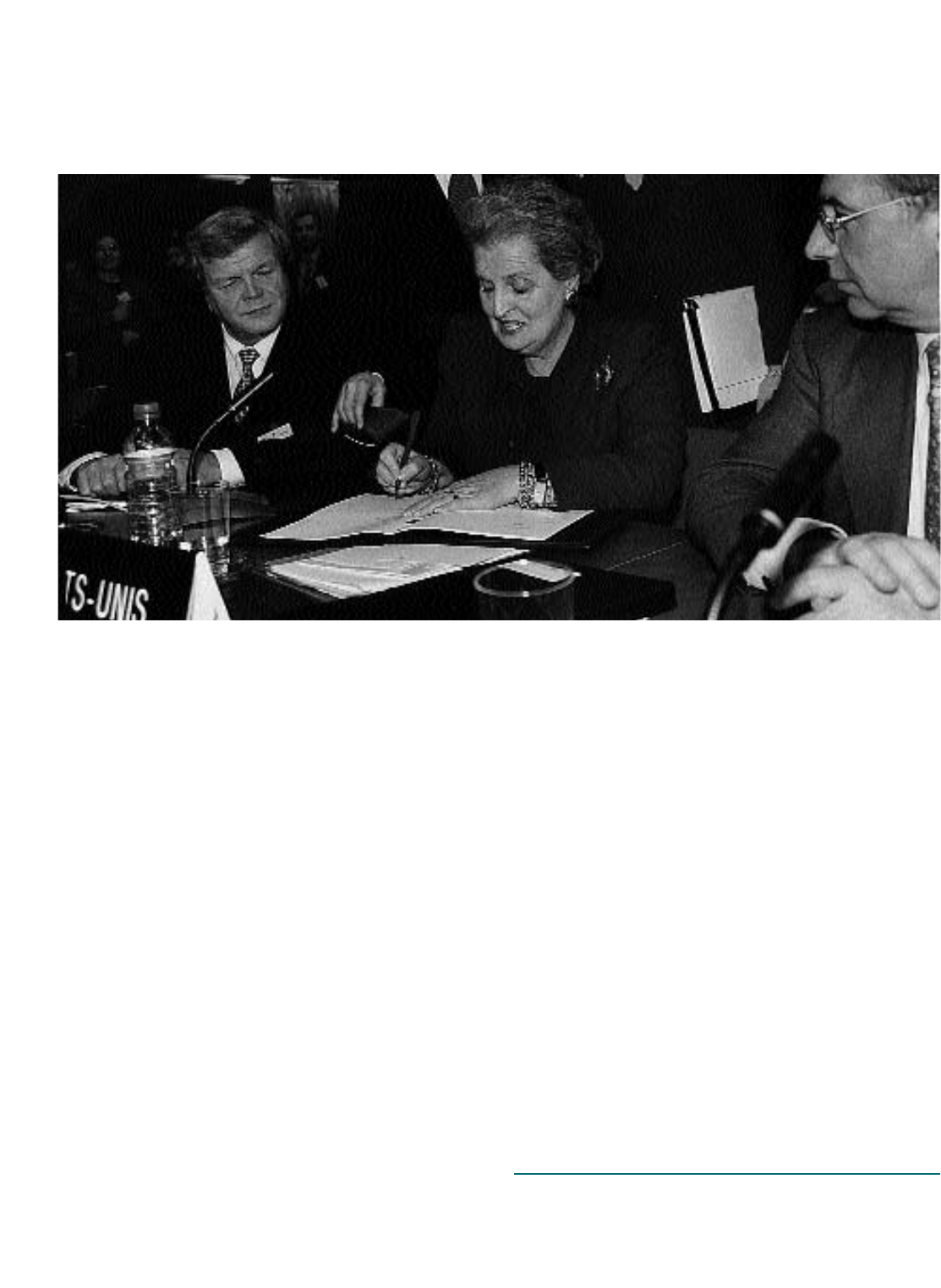
By Thomas White
T
wenty years ago the U.S. Congress passed the
Foreign Corrupt Practices Act, which prohibits
Americans from bribing foreign public officials
to obtain business. The problem of corruption
internationally has received considerably greater atten-
tion as recognition has grown of the tremendous costs it
imposes on good governance, fair competition, economic
development and efficiency. U.S. business has adjusted to
operating within the terms of the anti-bribery law over
the past two decades, but the lack of comparable prohibi-
tions on off shore bribery in other countries has created
an uneven playing field for American companies
engaged in international business. American firms esti-
mate they lose billions of dollars in international com-
mercial contracts each year because of bribery by com-
peting foreign firms.
But the situation is about to change dramatically for the
better. On Dec. 17, at the headquarters of the Organization
for Economic Cooperation and Development in Paris,
Secretary of State Madeleine Albright signed a binding
international Convention on Combating Corruption in
International Business Transactions. The agreement
requires the United States and 33 other major industrial-
ized countries to enact legislation by the end of this year
to criminalize and provide “dissuasive” sanctions for
business-related bribes to foreign public officials.
The anti-bribery convention marks a major achieve-
ment for the United States, which worked for more than
20 years to reach such an agreement with major U.S. com-
mercial competitors. It’s also a major achievement for the
Department and for the Bureau of Economic and
Business Affairs, which led the negotiation effort.
This diplomatic victory hinged on a team concept.
Former Secretary Warren Christopher and then–EB assis-
tant secretary Daniel Tarullo led a broad, multi-agency
effort in 1994. They forged with the United States part-
ners a general anti-bribery recommendation and an
agreement to a program for the new OECD Working
Group on Bribery.
The State team was broad based, since the anti-bribery
effort touched on legal, international commerce, account-
ing, procurement, taxation and other issues, and the
24 State Magazine
Combating International Bribery
The author is director of the Office of Investment Affairs.
Secretary Madeleine Albright signs the anti-bribery treaty in Paris. Looking on are Finland’s deputy minister of finance, Juko
Skianari, left, and Rodrigo de Rato-Figaredo, vice president of Spain’s government and trade ministry.
BBuurreeaauu ooff tthhee MMoonntthh:: EEccoonnoommiicc aanndd BBuussiinneessss AAffffaaiirrss

application of these concepts from Australia to East Asia
to Europe to Latin America to North America.
The Bureau worked closely with the Office of the Legal
Advisor, the Bureau for International Narcotics and Law
Enforcement Affairs and the Bureau of International
Organizations Affairs, and with the Department’s region-
al bureaus, particularly the Bureau of European Affairs,
including the U.S. Mission to the OECD.
Overseas posts also contributed to the effort, both in
terms of analysis of local attitudes, laws and regulations
and through frequently testy exchanges with foreign gov-
ernment representatives as key decisions approached.
The EB-led team concept was replicated at the inter-
agency level. A clear and compelling national interest in
advancing this issue, shared by all involved agencies, set
the tone for this process. Representatives from the Justice,
Commerce and Treasury Departments and from the
Office of the U.S. Trade Representative and the Securities
and Exchange Commission played important roles,
including their Cabinet-level leadership. Secretary of
Commerce Robert Daley chaired the U.S. delegation to
the annual OECD ministerial meeting last spring, setting
the course for December’s historic anti-bribery conven-
tion. The signing of the anti-bribery convention is an
important achievement for U.S. diplomacy, and illus-
trates the key role the Foreign Service performs in
advancing concrete American economic interests abroad.
The outcome will directly benefit honest American com-
panies doing business overseas—with all the attendant
job and export implications—while furthering U.S.
efforts to foster economic reform, development and the
democratization process internationally.
I
February 25
By Audrey B. Huon-Dumentat
These days, we have too many communication
choices. As efficient as many of these choices can be,
they also have their failures. Faxes disappear into thin
air. Phone messages left on answering machines go
mysteriously unanswered. E-mails are left hanging in
thin air with no acknowledgment or answer.
Any communication exchange is only as good as the
lowest-technology equipment used to conduct it. Your
super-duper fax machine can’t “talk” to your counter-
part’s 1960s version. Your slower-than-molasses modem
downloads gorgeous, full-color graphics from the web,
when all you needed was one address! You distribute
something on paper because the Internet is not yet the
rage, and the Secretary of State publishes the same thing
electronically. Then you discover that the Secretary’s
version went out differently from yours because the
word processing program didn’t convert the table right
or the last-minute change didn’t get hand-entered cor-
rectly. Is technology working for us or against us?
E-mail is everyone’s favorite technology, but it
seems to be overrated. It can take days for a message
to get to me through the SMTP censor. Who is SMTP
anyway? The IM personal mail gestapo?
Sometimes e-mail goes down for days, leaving most
of us wondering why those folks in the Department
are ignoring us. There are also the spooky electronic
fits and starts. The phantom “this vs-mail user is
unknown to the system” message appears, and you
never find out whether the “unknown” user received
it or not. Or you get a message indicating non receipt
and find out later that the person got it anyway.
Just what do you do when someone’s e-mail box is
full and won’t accept your message? You could always
resort to sending it by fax, if you can find a fax num-
ber. They’re unlisted in most white pages. You could,
as a last resort, send your message through the
slow-boat pouch, but that hardly qualifies as a real
communication solution these days.
Have you ever played e-mail and audix tag? Ever
wished that secretaries were not becoming an endan-
gered species at State? I’ve spent days trying to catch
someone on the phone when a complicated problem
required a real conversation.
I guess this is just part of doing business globally.
There‘s no secret recipe for making sure a message
gets passed well and answered. At least they don’t kill
the messenger anymore as they did in the old days of
diplomacy, although I’ve been sorely tempted to take a
bat to my computer when I get the message that some-
one’s e-mail box is full.
For most routine things, e-mail is the way to go, but
I admit this only with a sigh of resignation. It’s quick
enough for most purposes, and qualifies as more or
less “record” traffic since it can be documented.
I used to prefer cables, but nowadays they seem to tick
people off, so I’ve joined the kinder-and-gentler bureau-
cratic ranks. Now, when action is necessary and needs to
be traceable, my personal preference is the Stone Age
yellow routing and transmittal slip, Optional Form 41, to
be precise. My second choice is the tried-and-true
interoffice memo, though I don’t go so far as to use the
standard form because it’s an oddball size that won’t
work with my printer. And even if it could, I can’t figure
out how to format it correctly so it prints out right.
The author is assistant general service officer at the embassy
in Dakar, Senegal.
Technology Blues

Hanoi
Post of the Month:
Building Toward a New
Future in Vietnam

U.S. diplomats began returning to Vietnam only three
years ago. In January 1995 State set up a liaison
office, and in August 1995 then-Secretary Warren
Christopher opened the American embassy in Hanoi,
with Desaix Anderson as chargé d’affaires.
Ambassador Douglas “Pete” Peterson arrived in
Hanoi on May 9, 1997, to begin work as the first U.S.
ambassador to postwar Vietnam.
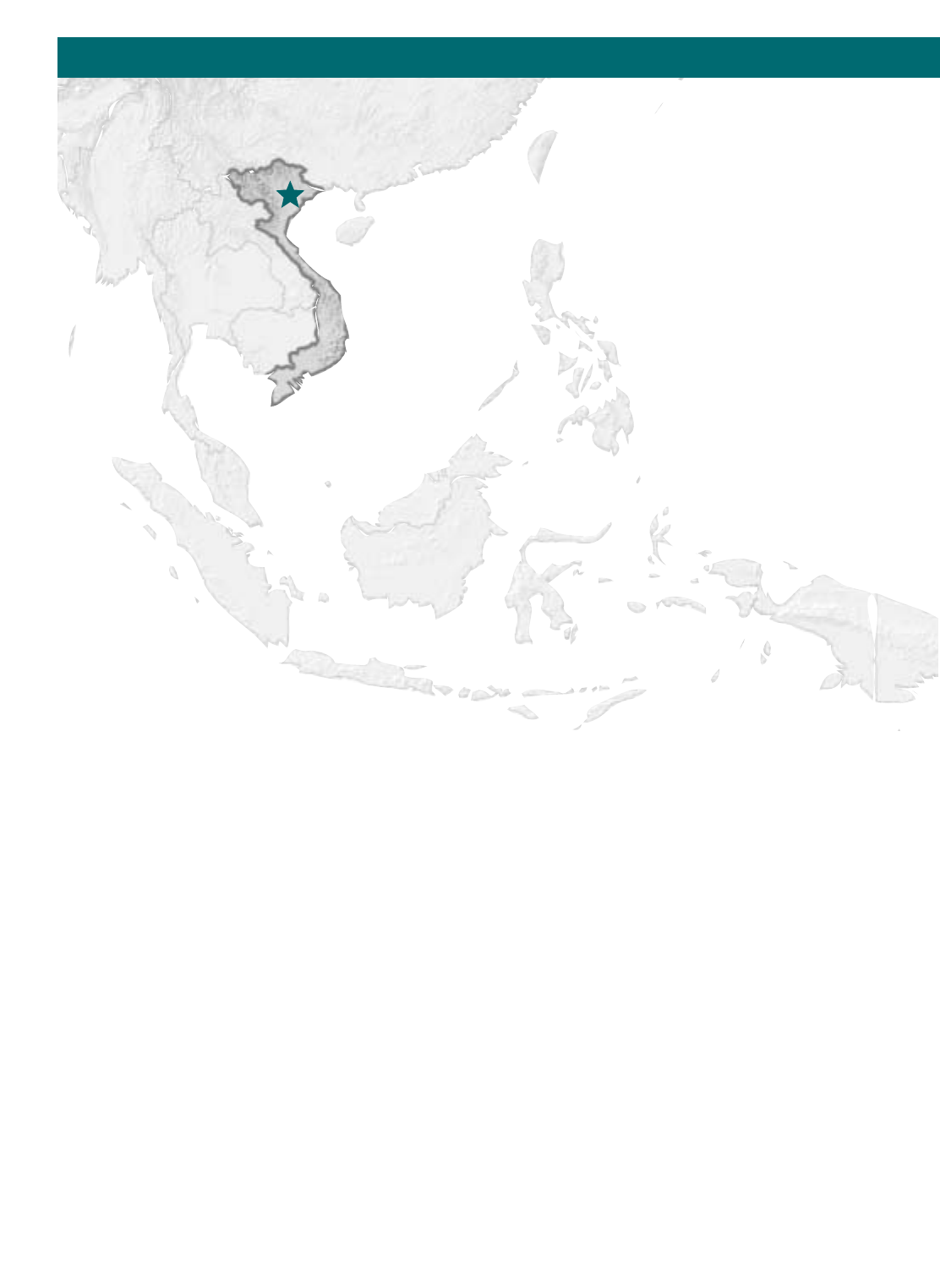
mbassador Peterson was an inspired
choice for the position—a former con-
gressman and a former prisoner of war
who spent more than six years at the Hoa Lo prison,
dubbed the “Hanoi Hilton” by some POWs.
Since the early 1990s, Ambassador Peterson, a former
Florida congressman, had returned to Vietnam several
times to bolster reconciliation efforts, and even visited his
old jail cell.
“This is a historic event and the beginning of a new era
of constructive relations between Vietnam and the United
States,” he said as he arrived at Hanoi’s Noi Bai interna-
tional airport to assume his ambassadorial post.
Vietnamese well-wishers, American veterans and busi-
ness representatives welcomed the ambassador under
the sweltering sun, as he told them his top diplomatic
priority was to seek “the fullest possible accounting of
persons missing from the war.” More than 2,000
Americans are officially missing from the war.
Ambassador Peterson also called for the conclusion of
a trade agreement with Vietnam. “Simply put, the U.S.
policy is to help Vietnam become a prosperous country, at
peace with its neighbors and fully integrated into this
most dynamic region of the world,” he said.
Since his latest arrival in Vietnam, he has worked with
Foreign Service and Department of Defense personnel to
implement U.S. foreign policy, protect American citizens,
advance American business interests and provide a
working and living environment able to support this
active mission.
Since January 1995, the embassy staff has grown to
include some 50 direct-hire American and 130 local
employees, representing State, the U.S. Information
Service, the Foreign Commercial Service, the Foreign
Agricultural Service, the Defense Attachés Office, the
Joint Task and the Force–Full Accounting, and a Centers
for Disease Control physician. The embassy’s constituent
post in Ho Chi Minh City, with a dozen Americans and
nearly 40 Vietnamese employees, also includes represen-
tatives of the Immigration and Naturalization Service.
The embassy’s work is exciting, but hectic. In the last
year, owing to the United States’ constructive engage-
ment with Vietnam, the two countries signed a copyright
agreement and are making progress toward science and
technology, trade, and aviation agreements.
The gratification of helping make a difference for both
countries is a much-needed compensation for the diffi-
cult working conditions. The chancery is in the third year
of reconstruction, and before the project is completed, the
search is already on for a site for a new embassy.
The embassy’s housing pool includes apartments and
single-family homes. Only seven employees reside at the
diplomatic compound built by the host government. In
the urban European tradition, the houses are tall rather
than sprawling. It’s not unusual for a 1,000-square-foot
house to have three levels.
Much of Hanoi has an almost medieval flavor.
Different guilds have different streets on which they
hawk their wares. To this day, there is a silk street, a met-
alworkers’ street, a goldsmiths’ street and the newcom-
ers: streets devoted specifically to plumbing fixtures,
tiles, rubber hoses, bookbags, wedding dresses, TVs,
kitchen appliances, raincoats, sports equipment, water
tanks and other goods.
28 State Magazine
Post of the Month: Hanoi
A
Photos by Robert Carlson

A street vendor offers yams for sale.
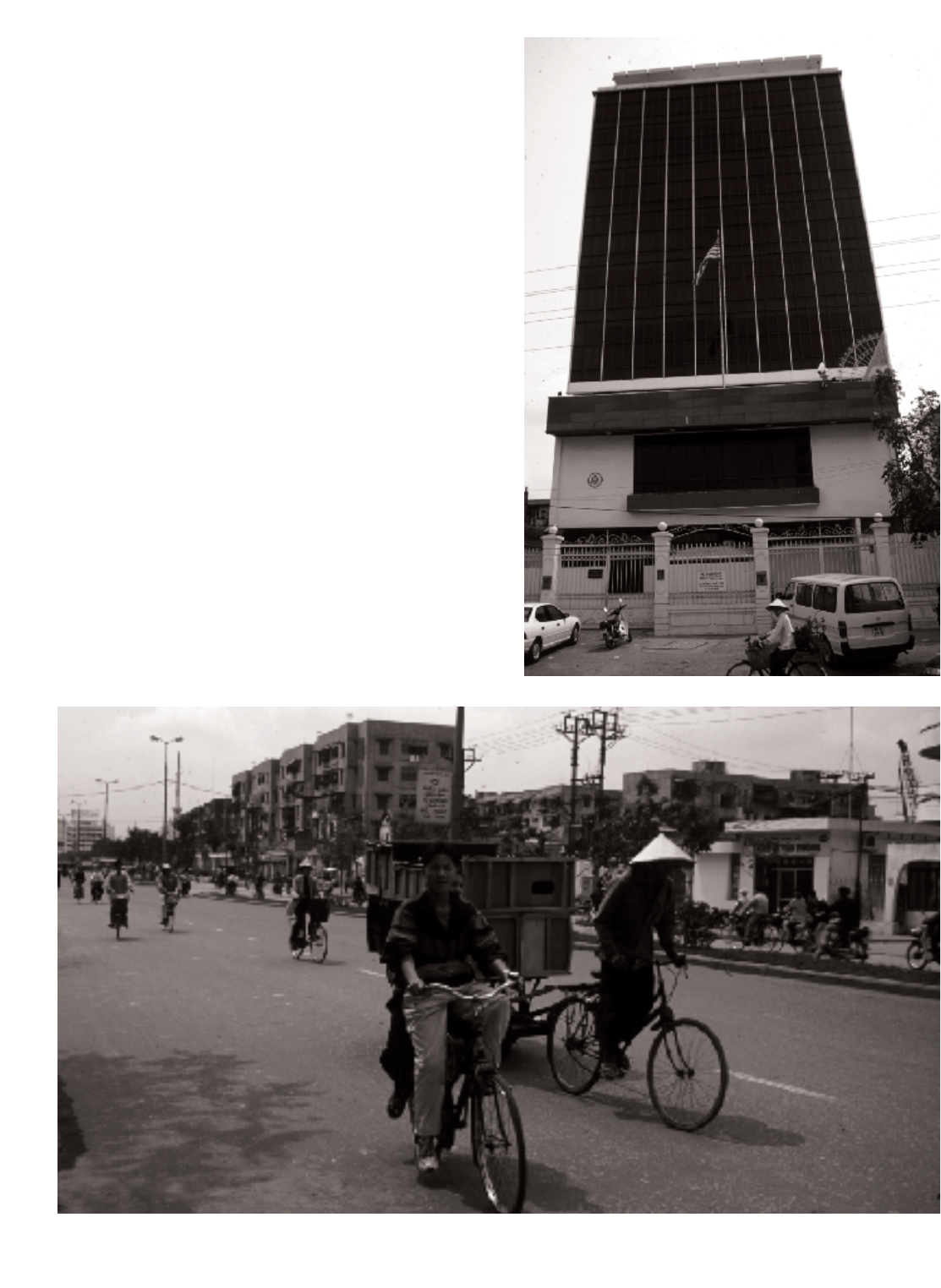
The full range of what’s available is within one block,
and the proximity keeps the prices in check. There are
also Western incursions, such as the Czech crystal stores
with Western prices and local supermarkets with coun-
terfeit electronic goods.
Although most Americans’ images of Vietnam are of a
nation at war 20 years ago, today’s Vietnam is a dynam-
ic, changing young nation. Sixty percent of its 77 million
citizens were born after 1975. Vietnamese youth frequent
discos with names like Metal and Roxy, speak or are
studying English and cruise the streets on Honda Dream
motorbikes.
Hanoi’s traffic is a mixture of bicycles, motorcycles,
cars and trucks going at different speeds, no traffic lights,
and pedestrians walking across all of this. There are sev-
eral theories of roadway survival. One theory is that the
traffic is a river and you are a rock it flows around; anoth-
er advises never to look back since no one else does; still
another, never stop because you’ll cause an accident.
“Never stop” is the advice the entire embassy staff in
Hanoi appears to be following as it strives to expand the
relationship between the United States and Vietnam and
to advance U.S. national interests in Southeast Asia.
I
30 State Magazine
Right, the U.S. embassy in Hanoi. Below, bicycles and motor-
bikes serve as the primary transportation on Lan Ha Road,
the street outside the embassy.
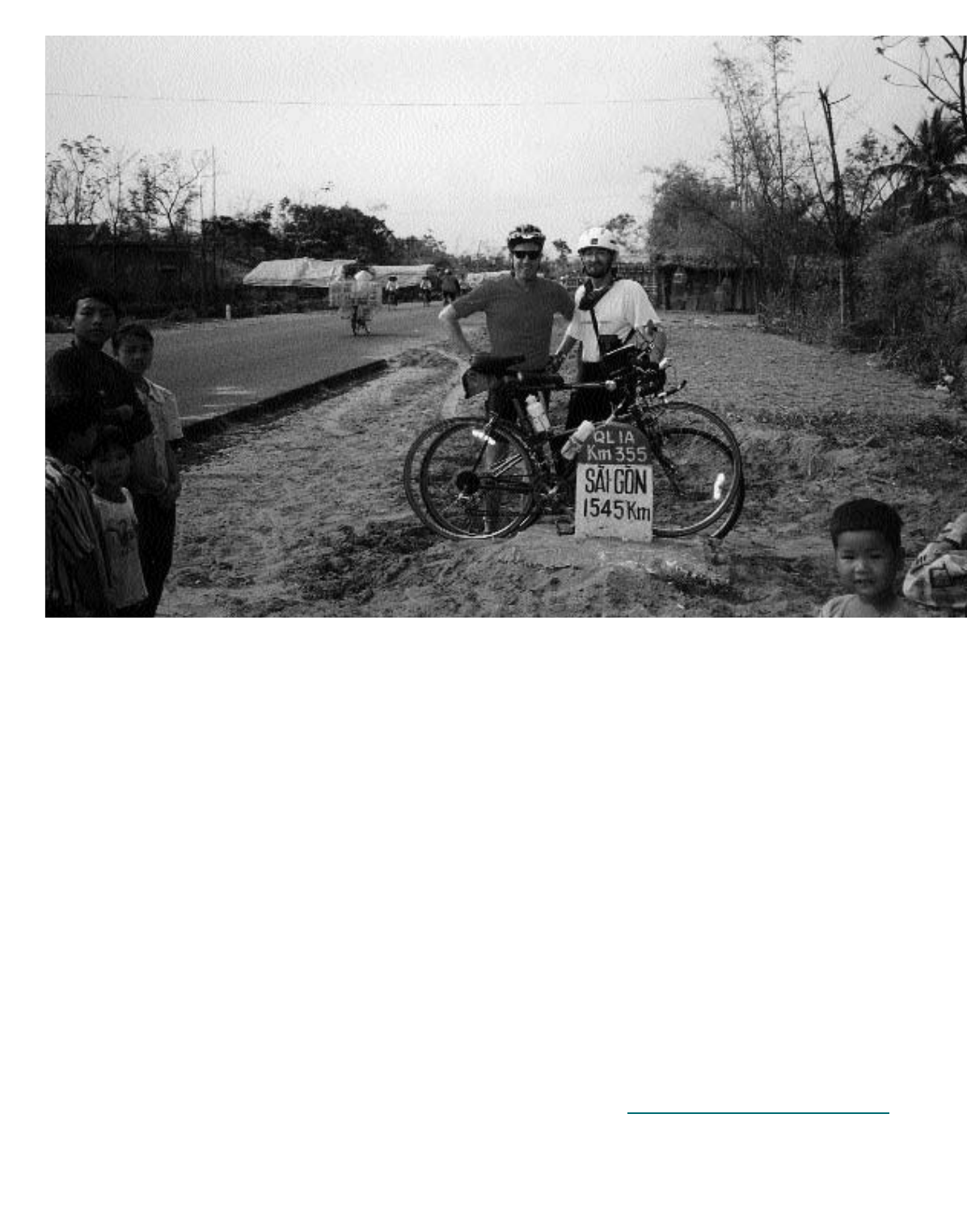
By Daniel Fern
An information manage-
ment specialist and political
officer posted in Hanoi
explored the heart of
Vietnam during a 1,200-
mile bike ride from Hanoi to
Ho Chi Minh City.
The sun was just starting to rise. It
was Saturday, and I was among a
group of nine bicyclists—one
Australian, one Vietnamese and
seven Americans—en route to
Highway 1. By the time we reached
the highway, it was already congest-
ed with vehicles. Since the road was
completely blocked by traffic, we
picked up our bikes and walked on
the railroad tracks along this stretch
disappear. The children became the
highlight of the trip.
It rained for less than two hours
during the entire 14-day trip. We
stopped often to take photos and got
to know several of the beautiful cities
as we passed through them—Hue,
Da Nang and Hoi An, among them.
On the final day of our trip, horrif-
ic traffic forced us to concentrate on
just riding the final 50 kilometers
into Ho Chi Minh City. It wasn’t
until we crossed the Saigon Bridge
that we knew we’d made it, one flat
tire, two bruises and 400 pictures
later. Only a climb up Mount Everest
could exceed the feeling of accom-
plishment. I wonder if Ted Osius
will put that trip together, too?
I
February 31
Vietnam on two Wheels
The author is an information management
specialist in Hanoi.
Political Officer Ted Osius and Information Management Specialist Daniel Fern on the trip with just over 900 miles to go.
of highway, bypassing the traffic.
The farther we rode from Hanoi, the
quieter it became. There were fewer
horns honking, fewer cars and
motorbikes.
In the countryside, we were greet-
ed by children who came out of
nowhere to greet us and ask our
names. They waved their little arms
vigorously and jumped with joy. I
often found that the children’s
enthusiasm helped me forget my
frustrations with the Vietnamese bus
drivers who sometimes intentional-
ly tried to run us off the road. Bus
and truck drivers were fast and reck-
less and constantly honked their
horns—reminding me of what I dis-
liked about living in Vietnam. But
then a young child would run up to
the side of the road with a big smile
and greeting, and my frustrations
Post of the Month: Hanoi
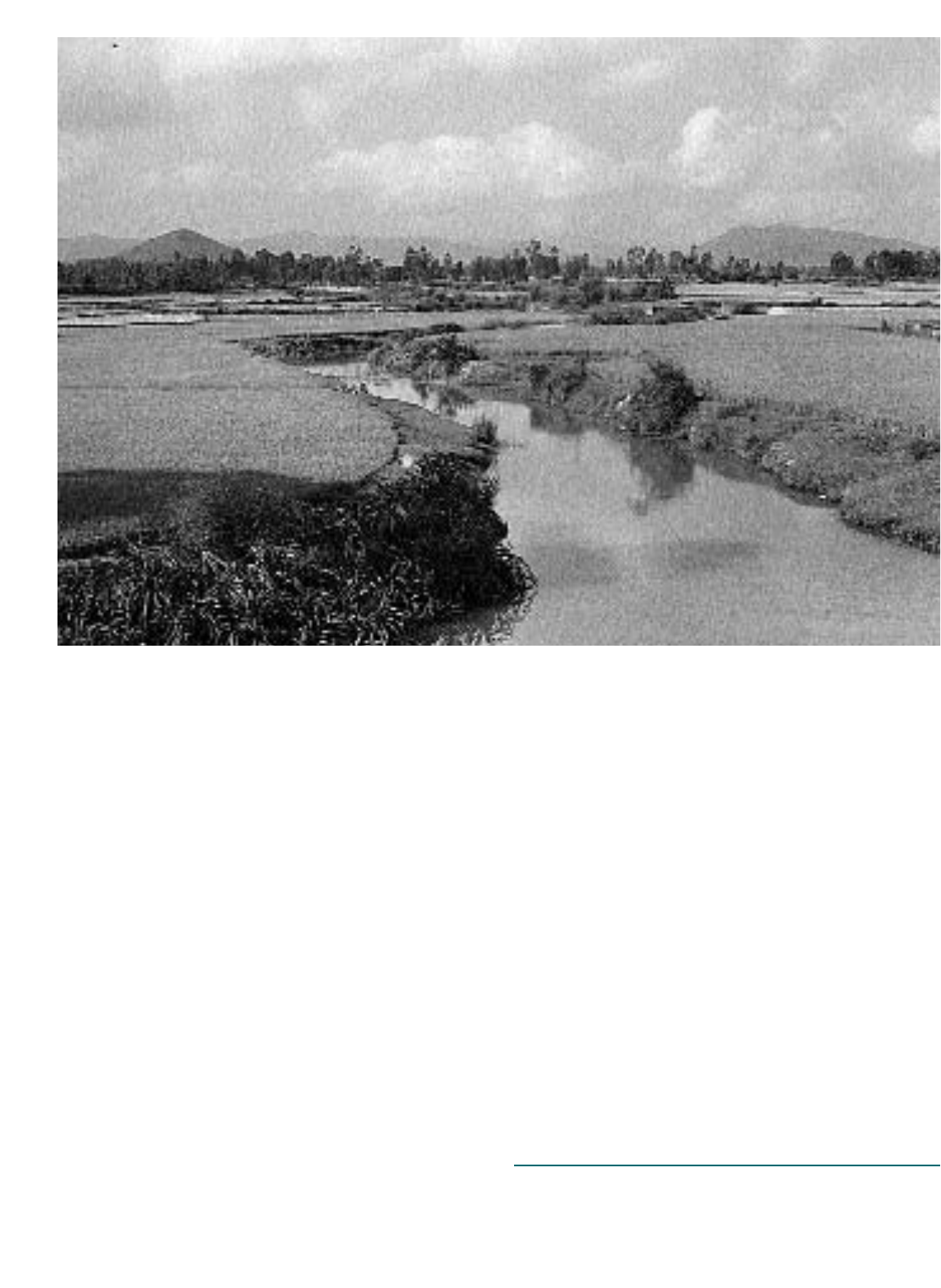
By Elizabeth Kauffman
W
hen Public Affairs Officer William Bach
arrived in Hanoi in September 1995, every
task needed attention: furnishing office
space, hiring and training a staff, mapping
a public diplomacy plan and explaining to Vietnamese
counterparts how educational exchange and information
programs contribute to building a solid relationship. In
addition, Mr. Bach acted as embassy press liaison, arrang-
ing press releases, briefings, media interviews and press
conferences for U.S. officials.
By 1997, an American assistant and six Vietnamese
employees had joined Bach in administering exchange and
information programs focused on market-oriented eco-
nomics and the legal foundations of a civil society. Plans
are under way this year for a Ho Chi Minh City branch.
A 20-year hiatus in State’s Vietnam presence creates
gaps in mutual understanding that can be filled only by
two-way personal exchanges. The Fulbright Program,
initiated in Vietnam in 1992, enrolls some 30 Vietnamese
officials, scholars and professionals annually in graduate
programs at leading American universities. At the
Fulbright Learning Center in Ho Chi Minh City,
American Fulbright lecturers offer rigorous coursework
in principles of market economy decision making to
more than 150 business executives and economic policy
makers from throughout the country. In 1997, the pro-
gram began funding American graduate student research
in Vietnam. Plans for 1998 include placing American lec-
turers at seven universities throughout Vietnam to teach
and consult in various disciplines.
Besides academic exchanges, the U.S. Information
Service annually funds up to 30 one-month international
visitor programs, matching selected Vietnamese opinion
leaders—lawmakers, educators, editors, artists and jour-
nalists—with their American counterparts. They discuss
such issues as consumer rights, sustainable development,
U.S. commercial law or the role of women in U.S. politics.
American speakers and specialists travel to Vietnam to
discuss specific issues with counterparts.
In one such program, the suggestions of an American
expert in commercial law, conferring with lawmakers on
Vietnam’s draft commercial code, resulted in a code more
compatible with international norms. Other programs have
32 State Magazine
The author is a country affairs officer with East Asian/
Pacific Affairs.
USIS Vietnam
Post of the Month: Hanoi
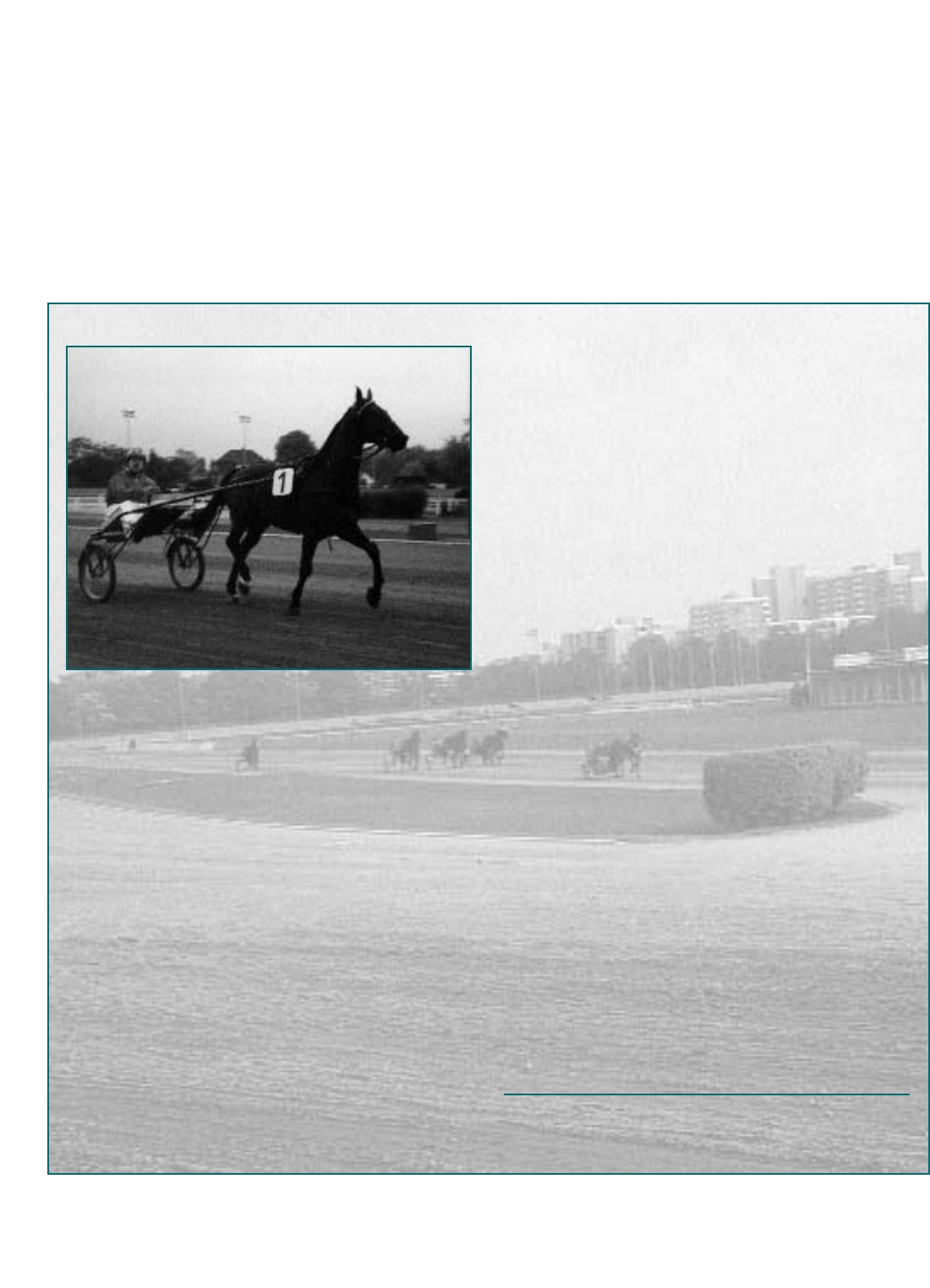
A Day at
the Races
By Robert Richard Downes
I
’ve taken on many different assignments and tasks
during my Foreign Service career. I investigated
murders and visited prisons during my consular
days, accompanied local police as they ran steam-
rollers over hundreds of pirated tapes and watches,
and engaged in all-night negotiating sessions involv-
ing literally billions of dollars of multilateral assis-
tance programs.
But I never expected to represent my country by
driving in a sulky race as I did at the Mariendorf
Trabrennbahn in Berlin on German-American Friend-
ship Day.
A sulky is a seat suspended over two wheels and
pulled by a horse at up to 40 miles per hour. In many
respects, sulky racing is similar to the chariot races in
Ben Hur, but the horses trot rather than run and it’s
considered bad form to hit your opponents with a
whip or run into their sulkies with spiked wheels.
I was introduced to sulky racing during a staff meet-
ing at the U.S. embassy in Berlin. The mayor of
Templehof was looking for American representatives
to drive in the special German-American Friendship
Cup race. As a Texan who had done some minor rodeo
riding in high school, I found this was too intriguing
an opportunity to pass up.
Germany requires eight to 10 hours of instruction
before you can drive a sulky, even in an amateur race.
I squeezed in the training time before work and on
weekends.
The race was 1,900 meters, or one-and-a-half times
around the track, and I was fortunate to have the cov-
eted first-place position in the center of the track. As
the only American among the nine drivers, I felt extra
pressure to do well.
As we passed the crowd for the first time, I was in
third place and gaining on the second horse. Suddenly
a horse’s head appeared over my shoulder, and the
horse began to kick my cart. My own horse, Jump for
Joy, picked up speed. As we completed the first lap, I
was still in third place and moving faster to overtake
number two. The crowd went wild as we neared the
finish line, but sadly the cheers were not for me. In the
last 300 meters while I was zipping along at 65 kilo-
meters per hour, three other horses slipped by me. Yet
for the only beginner in the race, fifth place wasn’t so
bad. After all, there’s always next year!
The author is a Foreign Service officer assigned as treasury
representative to the embassy in Berlin.
included seminars on intellectual property rights protec-
tion or American regionalism. Under the Citizen Exchange
Program, projects initiated by American non governmental
organizations and academic institutions result in learning
and institutional links. A growing Information Resource
Center in Hanoi provides timely articles and policy infor-
mation to key Vietnamese opinion makers.
USIS promotes understanding of the United States
through book donations to Hanoi University, an English
Teaching Fellow at the Institute of International
Relations, a Library Fellow at Can Tho University, a
February 33
series of book translations, and a university affiliation
between the University of San Francisco and Hanoi
National University Law School.
The agency also promotes U.S.-Vietnam cooperation in
the fields of educational reforms, and encourages pri-
vately funded educational exchange. Under a coopera-
tive agreement with the Institute for International
Education, USIS provides information on higher educa-
tion in the United States to Vietnamese students and
institutions and promotes contacts between American
and Vietnamese universities.
I
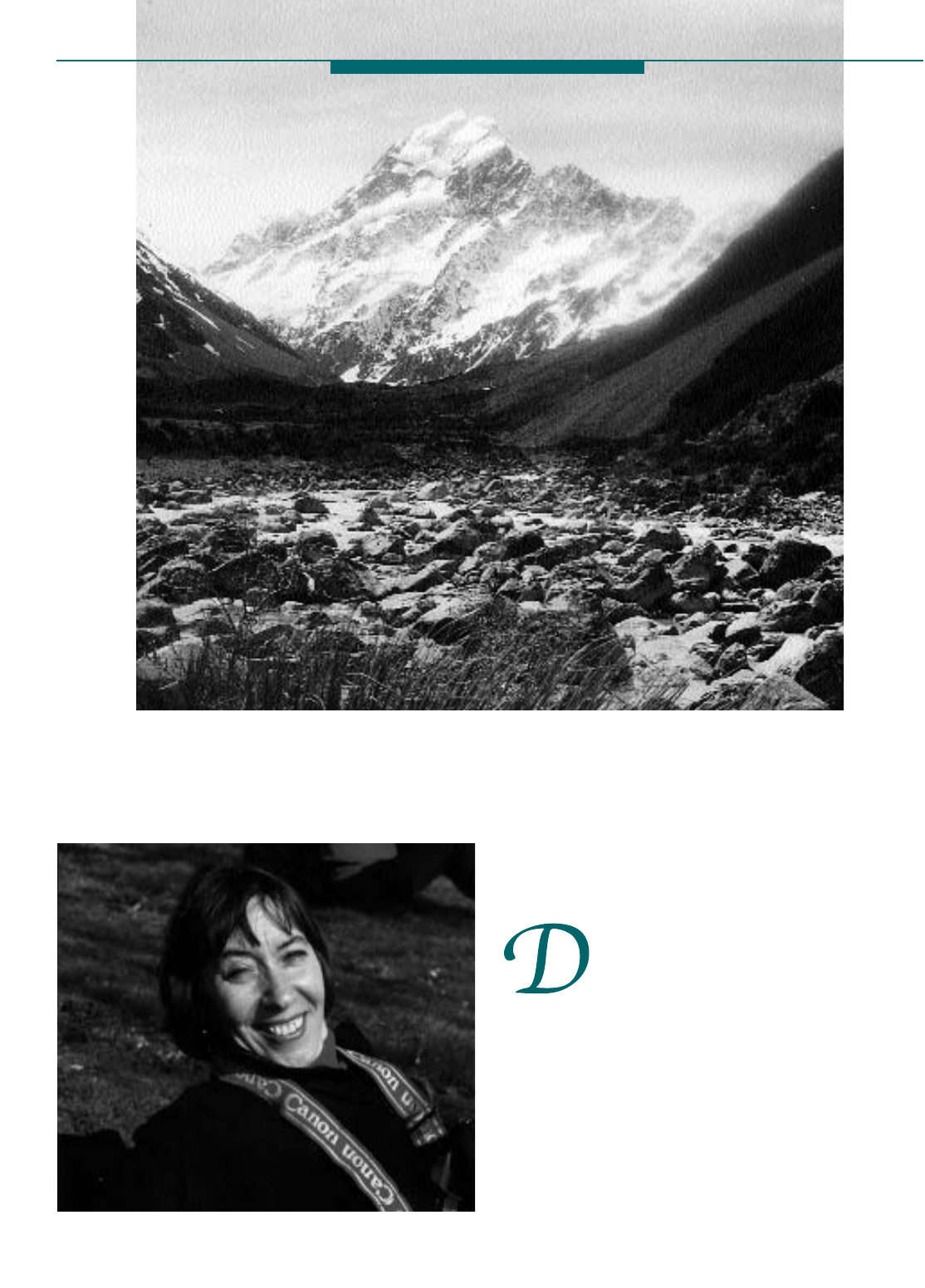
By Donna Miles
Photos by Rosalie Dangelo
uring 21 years at State, Rosalie Dangelo has
been a public information specialist, a per-
sonnel specialist and an ombudsman for
Civil Service employees. But it wasn’t until
1980, when she bought a new camera, that she realized
she’s something else, too—an artist.
“Once I got that camera, I started to see things through
a different set of eyes,” said Ms. Dangelo, now serving a
detail in the Department’s Africa Bureau. “Photography
gave me an opportunity to focus my mind in a totally dif-
ferent way, to be free to get closer to things and see beau-
ty in them.”
Much of Ms. Dangelo’s work centers around nature—
birds, flowers, light dancing on bodies of water. She’s
34 State Magazine
SSTTAATTEE OOFF TTHH EE AARR TTSS
Focusing on Art
Rosalie Dangelo
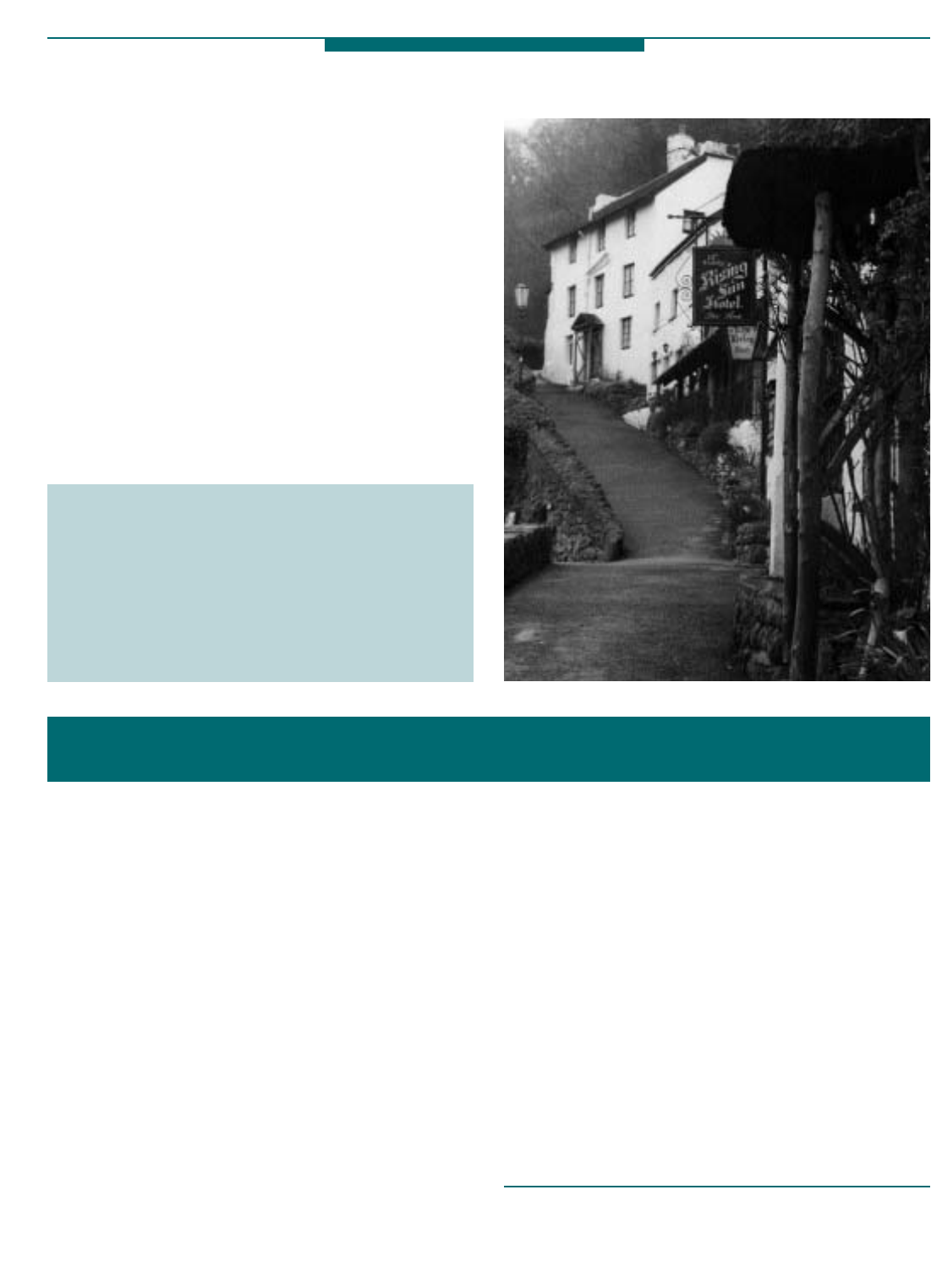
By John Bentel
The State of the Arts Cultural Series recently hosted
Chechen-born cellist Tanya Anisimova, who won first
prize at the prestigious Prague Young Artists
International Competition at the age of 15. Ms.
Anisimova’s program of Bach compositions, played on
an Italian cello over 100 years old, began with Suite I,
Prelude. She segued into Suite II, Prelude Sarabande in
D minor, and concluded with Partita III, Preludio Loure.
The program continued with improvisational music,
concluding with an encore of “The Flight of the Bumble
Bee” performed at a breakneck speed.
Returning for his fifth appearance at the State of the
Arts Cultural Series, former Foreign Service Officer
Steven Alan Honley performed a recital of “Music by
American Composers.” An accomplished instrumental-
ist, singer, and composer, Mr. Honley directs music at an
Alexandria, Va., church, is assistant conductor of the
Washington area Friday Morning Music Club Chorale
February 35
SSTTAATTEE OOFF TTHH EE AARR TTSS
traveled extensively pursuing her art, to Italy, New
Zealand, Sweden, Belgium and The Netherlands, as well
as Florida and the American Southwest. Most recently,
she traveled to Albuquerque, N.M., to capture images of
holiday luminaries.
But Ms. Dangelo considers herself a simple photogra-
pher. She owns just two lenses, prefers taking her film to
a lab over processing it herself, and bought a tripod only
after she realized she needed one in the darkness of the
rain forest. “I don’t work with a lot of gadgets,” she said.
“All I need is my camera and whatever it is that touches
me visually.”
“Photography provides me a creative outlet, a chance
to expand myself beyond what I do at the office each
day,” Ms. Dangelo said. “I’ve had people come up to me
when I’m shooting and say, “You look so happy!” And I
realize that when I’m photographing, I’m smiling.”
Department Hosts Concerts
and has long been part of the choral program at George
Washington University.
Mr. Honley started his most recent State performance
with several Edward MacDowell selections, including
“New England Idyls,” “In Puritan Times” and “Sea
Idyls”. He also played his organ version of Charles Ives’
“Variations on America,” then offered short selections
from Leonard Bernstein’s “Anniversaries” series and the
Dutch hymn “We Gather Together.”
Mr. Honley was a Foreign Service officer from 1985 to
1997. Following postings in Mexico and New Zealand, he
served in the Bureau of Political-Military Affairs, the
Bureau of African Affairs and the Board of Examiners. He
led the Ambassadors of Song and played French horn in
the Diplomatic Brass Ensemble and was State Magazine’s
first regular music critic from 1990 to 1994. He left the
Foreign Service to pursue a career as a freelance musician
and writer.
What’s the State of the Arts at your office or post?
State Magazine is looking for artists within the
Department: musicians, singers, creative writers,
photographers, actors, painters and the whole
range of other gifted individuals we collectively refer
to as artists. If you or someone you know fills the
bill, drop us a note at the mailing or e-mail address
on the inside front cover.
The author is a computer specialist in the Executive Secretariat.
Lynton, England
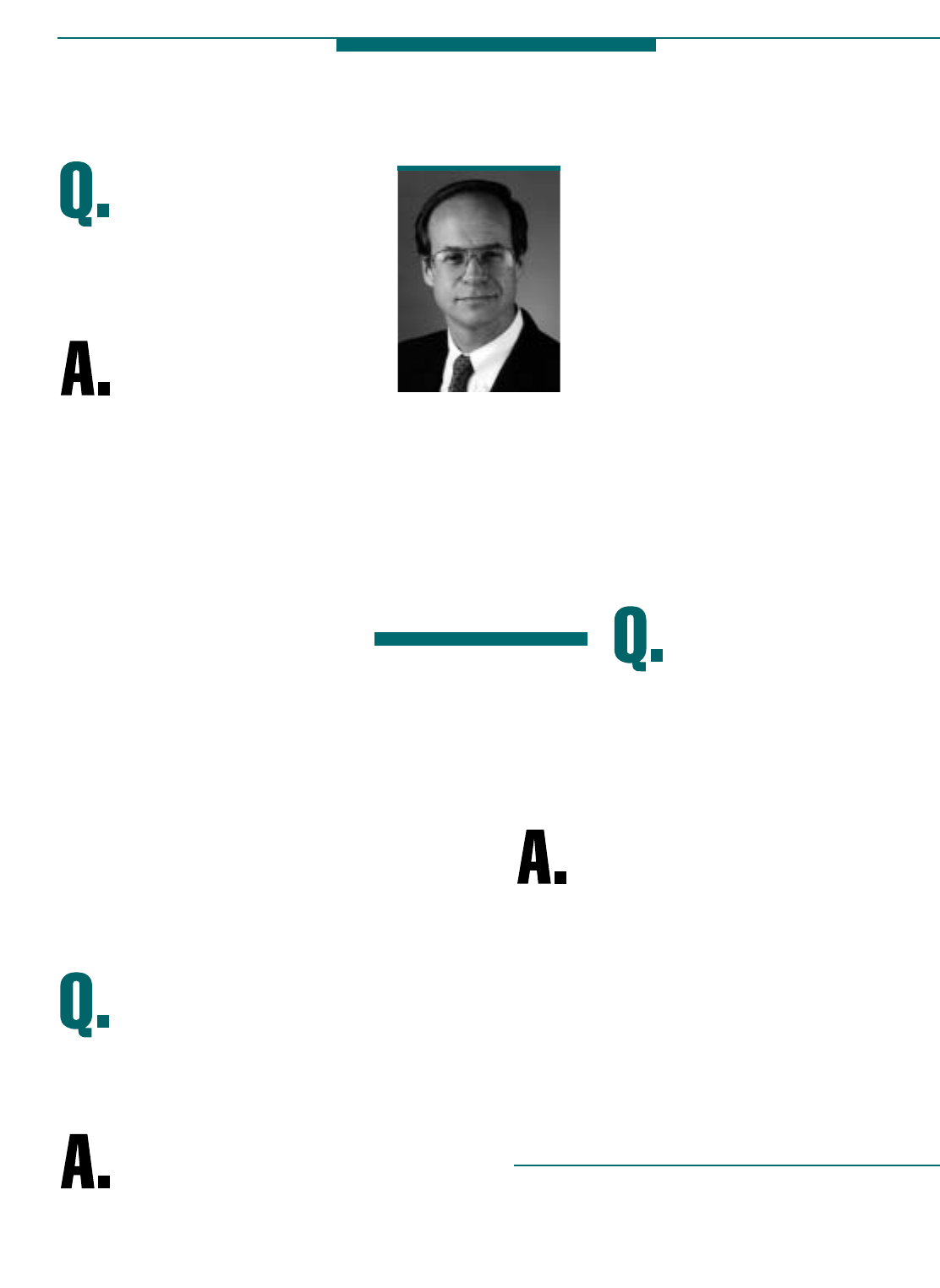
36 State Magazine
Our baby is now sitting up and
crawling, and my family and
friends buy lots of toys for her.
I’m not sure about the general
safety considerations when buying toys
for infants and toddlers. What should we
be looking for before we give our infant
something new to play with?—ARA
You’re correct in recognizing
that there are different safety
concerns for each stage in a
baby’s development. In gener-
al, all infant toys should be washable
because they are mouthed frequently
and passed around, spreading germs.
Toys with hard plastic, rubber or other
cleanable surfaces should be washed
and disinfected in a mild bleach solution
at least once a day. Another safety guide-
line is to be sure that all parts of any
infant toy are at least 1 1/4 inch in diam-
eter so they can’t be swallowed, and that
stuffed animals are not so large or heavy
that they could suffocate children.
Shatterproof mirrors washable dolls and stuffed ani-
mals with riveted eyes soft stacking blocks and nesting
toys and cloth, vinyl or board books are safe and appro-
priate toys for the first year. But rattles warrant special
consideration. The Product Safety Commission recom-
mends against giving a rattle smaller than 1 3/8 by 2
inches to a baby because it could lodge in the baby’s
windpipe and cause suffocation. For 1- to 2-year-olds,
pull toys with strings no longer than 12 inches books
with cloth or cardboard pages large-sized snap-together
beads and blocks banging musical instruments such as
xylophones large-sized crayons, watercolors or nontoxic
markers and puzzles with knobs and a few large pieces
are both safe and appropriate choices.
I have the distinction of being a male “baby
boomer.” As I age, I’m wondering if there are
any particular health risks for my generation.
Are there specific things, besides maintaining
normal weight, not smoking or drinking to excess and
keeping an active lifestyle, that I should be doing to pro-
tect my health?—NEA
Male baby boomers, that group of men born
between 1947 and 1954, have no specific health
risks other than those of the normal aging
process. The big four risks are skin cancer,
prostate cancer, colon cancer and diseases of
the heart and blood vessels—diseases that
are curable when diagnosed and treated in
the early stages. Yet some people, particular-
ly men, don’t take advantage of the screen-
ing and preventative measures their doctors
offer, and seek out medical attention only
when a problem arises.
Beginning at about age 40, it’s advisable
to have a blood pressure reading yearly, and
more frequently if it’s abnormal. Also rec-
ommended are annual checks for colon and
prostate cancer, with either a rectal exami-
nation, a blood test or a special visual colon
exam. Testicular self-exams should be con-
ducted every three months. In addition,
maintaining a weight near the ideal, stick-
ing to a regular exercise program, and eat-
ing a low-cholesterol diet that’s rich in veg-
etables, fruit and grains all contribute to a
healthy lifestyle.
I get cold sores when I’m sick, if I
have a fever, if I’m out in the sun
and if I get very angry or upset.
Sometimes I get them for no appar-
ent reason. I’ve heard of at least 100 treatments, from
applying ice to smallpox vaccinations to painting the
lesions with a variety of ugly, bad-tasting liquid concoc-
tions. Is there a cure? Is there anything that will help
reduce the frequency or the pain or the length of time I
have these miserable sores?—AF
The bad news is that there’s no cure for the her-
pes simplex virus, the one responsible for cold
sores and fever blisters, and some 20 percent of
American adults are affected and have an aver-
age of three eruptions each year. Recently introduced
medicines such as Acyclovir, also called Zovrax, have
been associated with shortening the course of the out-
break. A new medicine called Peniclovir has been partic-
ularly promising. It comes as an ointment and is applied
directly to the sores to block the virus from replicating its
DNA. The pre-eruption pain is lessened, and the course
of the outbreak is shortened by as much as 25 percent. As
the sores are healing, it’s important to avoid letting fluid
from the blister come in contact with others, as the virus
can be transmitted to others.
AA SS KK DD RR .. DD UU MM OO NN TT
BY CEDRIC DUMONT, M.D.
This column appears
monthly in State Magazine.
Whether you are serving
overseas or at home, you are
encouraged to get your
questions answered in these
pages. Write to the editor
or to Dr. Dumont directly.
In either case, your post
will not be identified.
The author is chief of the Department’s Office of Medical
Services.
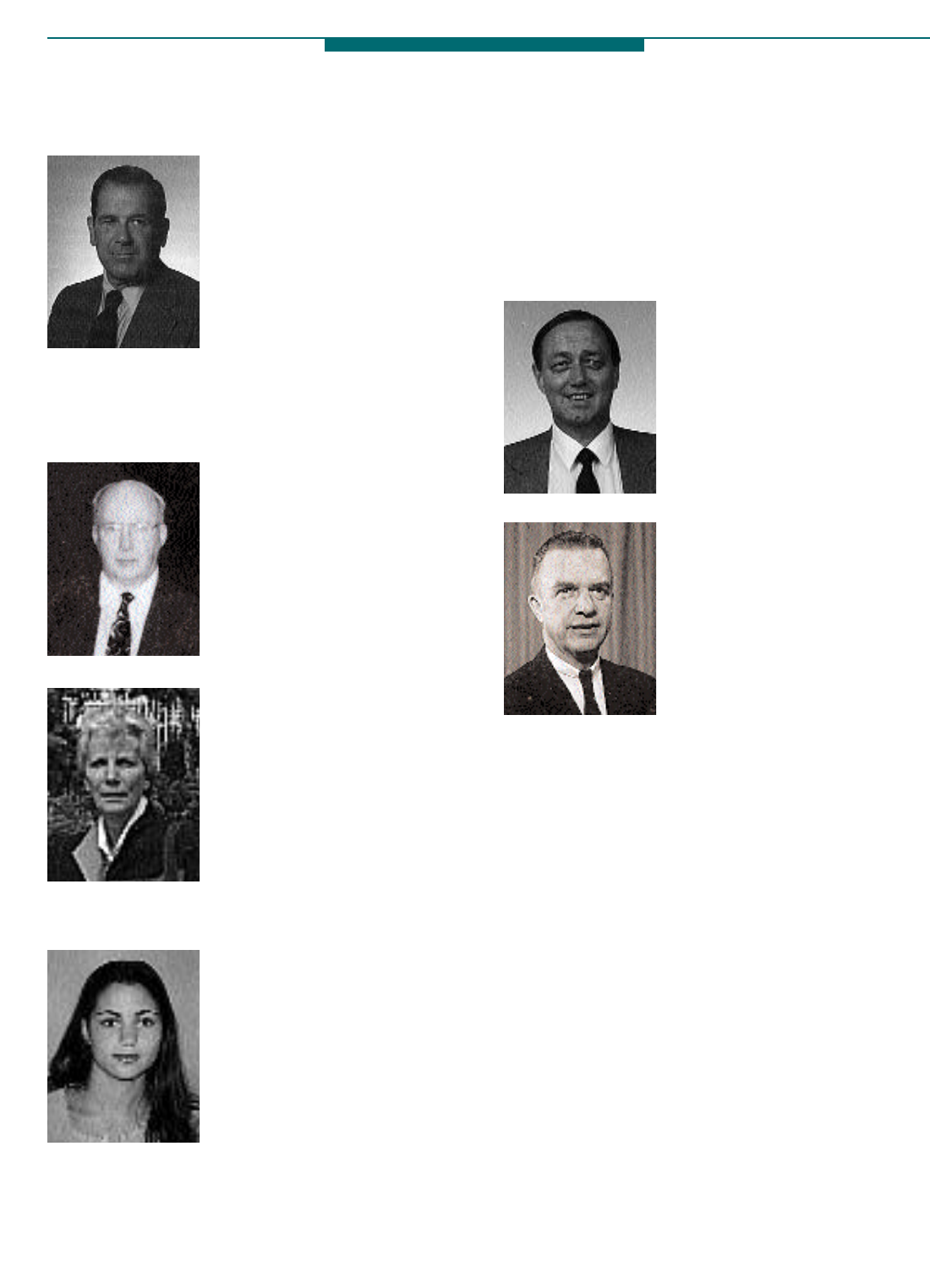
February 37
Karl Ackerman, 70, former assistant
secretary of State for Security, died
Sept. 21 in Bethesda, Md. He
joined the Foreign Service in 1949,
serving as a security officer in
Rome, with later postings in Paris,
Taipei, Oslo and Bangkok. In
Washington, Mr. Ackerman was
deputy executive secretary, execu-
tive director of the Bureau of Inter-
American Affairs and director of Foreign Service assign-
ments. He retired in 1982.
Earl A. Ambre, 68, a retired person-
nel management specialist, died
Nov. 12 in Phoenix, Ariz. Mr.
Ambre joined the Department in
1979, managing its retirement
planning and career transition
programs until his own retirement
in 1995.
Barbara Candelaria, 67, died Aug. 8
in Prescott, Ariz. While accompa-
nying her husband, retired
Foreign Service Officer Benjamin
Candelaria, on overseas tours,
Mrs. Candelaria worked for the
Department. She served in several
offices in Nairobi and headed up
health units in Havana and
Maputo. She left State when her
husband retired in 1990.
Gabrielle Teresa DeThomas, 15,
daughter of Joseph DeThomas,
deputy chief of mission in Vienna,
and Karen DeThomas, died Dec. 1
in Vienna. She was a student at the
American International School in
Vienna and had accompanied her
parents to assignments in Mexico
and Addis Ababa before arriving
in Vienna last August. (See related
story, page 39).
Dwight Dickinson III, 80, ambassador to Togo from 1970 to
1974, died Sept. 24 in Newport, R.I. Mr. Dickinson
entered the Foreign Service in 1946 and served in Mexico
City, Curaçao, Beirut, Rabat, Paris, New York and
Washington. He retired in 1974.
Robert L. Gingles, 62, a retired
Foreign Service officer who served
in the Bureau of Administration,
died Sept. 4 in Buenos Aires. He
joined the Foreign Service in 1966
and served in Washington, Yaounde,
Sofia, Islamabad, Paris, Buenos
Aires, Rome, Tehran, Mexico City
and Paris. He retired in 1984.
Parker T. Hart, 87, former assistant
secretary of State for Near East and
South Asian Affairs from 1959 to
1961 and ambassador to three
countries, died Oct. 15 in
Washington. He spent 31 years in
the Foreign Service, serving as
ambassador to Saudi Arabia,
Turkey and Kuwait and minister to
Syria and Yemen before being
named director of the Foreign Service Institute. He
retired in 1969.
Billy N. Hughes, 73, died Sept. 18 in Nashville, Tenn. Mr.
Hughes joined the Department in 1951, with postings in
Hong Kong, Panama, Washington and Orlando, Fla. He
retired from the Office of Diplomatic Security in 1987.
Richard T. Kennedy, 78, undersecretary of State for
Management from 1981 to 1982 and ambassador-at-large
from 1982 to 1993, died Jan. 12 in Washington. After 30 years
in the Army, he held positions on the National Security
Council staff, and served as deputy assistant to the
President for National Security Planning and on the
Nuclear Regulatory Commission. Ambassador Kennedy
became special adviser to the Secretary of State for Non-
Proliferation Policy and Nuclear Energy Affairs, and the
U.S. representative to the International Atomic Energy
Agency in Vienna, where he chaired the board of governors.
He chaired the steering committee of the Organization for
Economic Cooperation and Development’s Nuclear Energy
Agency, serving as the U.S. representative. He retired from
State in 1993.
OO BB II TT UU AA RR II EE SS
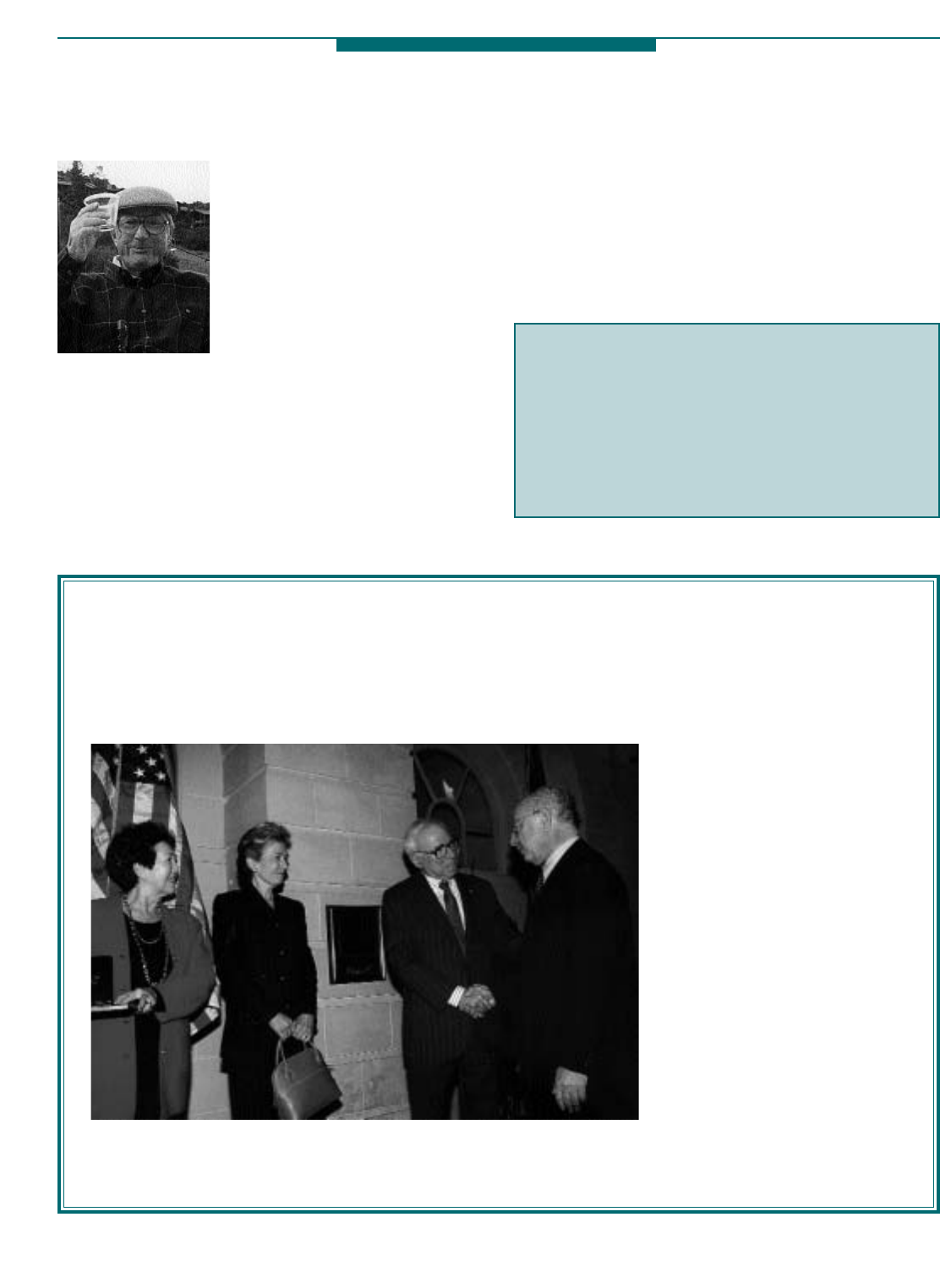
Goodwin Shapiro, 76, a retired
Foreign Service officer, died June
25 in El Paso, Texas. Mr. Shapiro
joined the Department after World
War II in an administrative capaci-
ty before becoming an aide to
Ambassador Daniel Bell and
Ambassador Arthur Dean. He
entered the Foreign Service in 1956
and served in Mexico, South
Korea, Spain and Argentina before
becoming deputy director of the Office of Special
Consular Services. He retired in 1980.
Henry L. Taylor, 79, a retired Foreign Service officer, died
Aug. 25 in Jacksonville, Fla. Mr. Taylor joined State in
1943 and served in Bogota, Buenaventura, Grenada,
38 State Magazine
OO BB II TT UU AA RR II EE SS
Tegucigalpa, Sao Paulo, San Luis Potosi, Mexico City,
Panama, Islamabad, Tehran and Washington, D.C. He
was a desk officer for Costa Rica, Guatemala and
Nicaragua, served in Panama City during the 1964 riots
and coordinated Cuban Affairs in Miami during the first
airlift. He retired in 1974.
State Magazine welcomes contributions to
the obituary column in the format displayed.
Every effort will be made to return photos.
Magazine policy is to publish obituaries of State
Department employees or retirees and immediate
family members of current Department workers at
the family’s request.
Berg Celebrates Golden Anniversary
John H.R. Berg, chief of the Travel and Visitors Unit at the U.S. embassy in Paris, recently celebrated 50
years of federal service—48 with State.
Mr. Berg began his govern-
ment service in 1947, working
for the U.S. Army after fleeing
Nazi Germany. He joined the
embassy staff in Paris two
years later.
To commemorate his golden
anniversary, Ambassador Felix
G. Rohatyn presented Mr. Berg
with a 50-year Length of Service
Award and the Secretary’s
Career Achievement Award. His
service was commended on the
floor of the U.S. Senate, with the
Congressional Record entry:
“...be it resolved, it is the sense
of the Senate that John H.R.
Berg deserves the highest praise
from the Congress for his stead-
fast devotion, caring leadership
and lifetime of service to the
United States government.”
Ambassador and Mrs. Felix G. Rohatyn commend John H.R. Berg for 50 years of
U.S. government service. Mrs. Berg is on the left.

State Workers Rally to Comfort Grieving Family
By Joseph M. DeThomas
O
ur 15-year-old daughter, Gabrielle, went to bed
early Nov. 30 feeling nauseous and achy. We put
her to bed, made her as comfortable as we could,
agreed she should stay home from school in the morning
and told her we would take her to the doctor in the morn-
ing if she still felt ill. She went to sleep and died of bacte-
rial meningitis during the night, devastating our family,
diminishing the amount of light in the world, but also
unleashing a surge of support from the American com-
munity in Vienna, the Foreign Service and the
Department. Our family lost its brightest light and great-
est hope, but it was rescued by the Foreign Service and
expatriate American family.
I returned home from the office to be told the news
about Gaby by my wife. Our first moments of agony were
spent alone. Within minutes, however, members of the
embassy community began to arrive. First, Robbi Keyes
came to hold my wife and comfort her, while I tried to
make sense of this disaster and provide information to the
rescue squad and the Vienna police. Thereafter, a stream
of embassy personnel and family members arrived to take
us and the situation in hand. Regional Psychiatrist Janet
Mules, Regional Medical Officer John Keyes, Regional
Security Officer Tony Richards, Consular Foreign Service
National Michael Strahberger and Administrative
Counselor Steven White assumed the practical tasks of
dealing with the Austrian authorities.
Perhaps more importantly, an army of embassy and
nonofficial Americans organized themselves by some
magic unapparent to us, keeping us functioning, healthy
and, above all, company. Ambassador Kathryn Hall and
her husband, Craig, and their fellow Vienna chiefs of mis-
sion John Ritch and Sam Brown led the way. In particu-
lar, Ambassador Hall and her husband encouraged
embassy personnel and families to visit us, rather than
keep the traditional distance and space neither of us
wanted or needed.
Christina Ritch and Alison Teal Brown spent the next
four days holding the our hands and warding off despair
with patience, conversation and hugs. Anne Snyder and
her husband, Deputy Chief of Mission Joe Snyder of the
U.S. mission to the U.N. organizations in Vienna, with the
omnipresent and tireless Dr. Mules, ran the equivalent of
a four-day wake—organizing hundreds of visits, phone
calls, prayer services, meals and crying jags. The English-
speaking clergy and churches of Vienna galvanized and
focused the prayers of hundreds of well-wishers. Each
carried at least a small piece of our grief away with them.
Robbi Keyes and other mothers recognized that our 9-
year-old son, Ben, needed a break from the drama play-
ing out in our residence. They organized play dates to
allow him time with children his own age. One little
fourth grader who lived down the street invited Ben to
play. He followed up with a special written invitation
designed to appeal to the mind of a 9-year-old boy.
Calls from the Department and other U.S. government
agencies began as soon as Washington awoke to the news
of Gabrielle’s death. Our gang of embassy spouses and
FSNs, including Donna Craven, Marilyn Wipple, Waltraud
Lenzhofer and Margit Kubinecz, ensured that we were not
overwhelmed by the phone, but managed to keep a flow of
visitors and calls coming to us to keep us talking. They took
their job seriously. When the Secretary called one night
after we had gone to bed, it took some serious negotiation
with our phone screener to get her put through to our bed-
room. And above all, my secretary, Margie Douglas, my
driver, Eric Fuchs, and the DCM residence staff refused to
rest if there was a single burden they could lift from us.
My own past came back to haunt me in a most positive
way. Colleagues from UNVIE, including Mark Fitzpatrick,
Ira Goldman, Roy Simpkins and Sam Boskin, took turns
sitting with me, letting me rage at the universe or remi-
nisce about Gaby. The same continued after we left Vienna.
We accompanied our child’s body home Dec. 5, and were
met at Washington’s Dulles Airport by John Feeney and
Ruth van Heuven of the European Bureau’s Austria,
Germany, Switzerland office. Colleagues from 20 years of
Foreign Service life called, visited and sat with us at the
visitation and funeral for Gabrielle. My assistant secre-
taries, deputy assistant secretaries and ambassadors from
current and past assignments all stepped forward.
Gaby’s burial Dec. 8 in Arlington, Va., marked the end
of the longest and most disastrous week of our lives. We
would not have survived it without the support and care
of an extended Foreign Service family accumulated with-
out our knowing it over 20 years. Karen and I often com-
plained that our transient lifestyle and my position as
DCM deprived us of friends and companionship. At our
darkest moment, however, the bonds of our special com-
munity tightened and held us up.
In our effort to recover from our loss, we have been
reading about how to deal with bereavement. Whether
by design or intuition, it is clear that our community did
precisely what the experts say should be done to comfort
the grief-stricken. We were borne through this worst of
personal disasters by hundreds of hugs and thousands of
prayers from a unique and extraordinary family. While
we know we have mentioned only a few of the people
who called, wrote, touched, hugged or prayed for us,
each gesture was a gift beyond price. We will never for-
get them. We love them all.
The author is deputy chief of mission at the U.S. embassy
in Vienna.
February 39

40 State Magazine
F
or the past six years, dozens of Department
employees have been practicing the tenets of
both Secretary Madeleine Albright and President
Clinton by bringing their specialized skills to a
Washington, D.C., inner-city school.
The Washington High Schools International Studies
Partnership, the outreach program instituted and run by
our colleagues in partnership with multi-ethnic
Cardozo High School, meets the Secretary’s mandate
that Department employees enthusiastically reach out
to the American people to create a greater understand-
ing of how foreign policy affects their daily lives, and
how the Department goes about serving the public’s
needs and interests. The program also meets the
President’s education initiative to ensure high-quality
education for all Americans.
When their help was declined at a district food shelter
on Christmas Eve in 1991, the Tom Miller family learned
that holidays can produce more volunteers than are need-
ed. That experience helped Mr. Miller, currently ambassa-
dor and special envoy for Cyprus, decide that meaningful
volunteerism should last longer than the holiday season
and should use volunteers’ special skills and talents.
He and Jock Covey, now senior director for Bosnia at
the National Security Council, recognized that the
Department’s rich resources could enhance district stu-
dents’ lives, so they initiated a program to bring
Department officials and district high school students
together. The two agreed that a Model U.N. program
would be an ideal venue for their purposes, but learned
that the district lacked the resources and budget to run
one. They proposed a partnership with them supplying
the foreign policy experts and raising private funding if
the district would create a Model U.N. program.
The Washington High Schools International Studies
Partnership was launched in 1992 with 10 Department
volunteers, 30 Cardozo High School students and two
teachers. The program consists of two or three 10-week
sessions during the school year. Over the last six years,
hundreds of students in grades 9 to 12 have participated,
and more than 100 Department employees and seasoned
Model U.N.ers at George Mason, George Washington and
Georgetown universities help with simulation exercises.
Ambassador Miller views the Model U.N. format “as
an opportunity for students to build skills, learn and
have fun.” Through discussions with teachers and sub-
stantive officers, visits with country desk officers, tours of
State’s operations center and visits to foreign embassies,
the students prepare themselves for simulation exercises
where they role-play as country representatives at a U.N.
Security Council meeting and attempt to resolve a typical
international challenge. They leave the experience with a
greater awareness of, interest in and appreciation for
other cultures, foreign policy issues and the Department.
They also develop many diplomatic skills useful in daily
life: communication, cooperation, leadership, teamwork,
conflict resolution, negotiation and persuasion abilities.
The volunteers also provide more immediate and tan-
gible rewards: a briefing by Recruitment’s Russell Taylor
about job and career opportunities, pizza and soft drinks
in the Operations Center or Treaty Room, T-shirts, a trip
for some participants to the U.N. General Assembly to
meet the U.N. Secretary General and retail gift certificates.
After returning from a three-year tour abroad, the
ambassador wants to expand the program to involve stu-
dents at all 13 district high schools. Through this effort, he
hopes to encourage students to participate in the
Department’s work-study and college scholarship pro-
grams and, ultimately, to consider pursuing careers in for-
eign affairs. He and other long-term participants hope to
encourage more people in the Department to volunteer an
hour or two each month to coach, mentor, role-play, share
experiences, coordinate or provide administrative skills.
As Ambassador Miller said, “Tell us your strengths and
we’ll find a need.” Bureau of Inter-American Affairs’ Annie
Pforzheimer described the program as “an opportunity to
become more connected with, and to give something back
to, the community where we work.” Interested persons
may contact Elmira Bayrasli at (202) 647-0684.
I
Giving Back to the Community
AACCCCEENNTT OONN OOUUTTRREEAACCHH
BY DIANA WESTON
The “Accent on Outreach” page highlights the
various ways our colleagues fulfill the Secretary’s
mandate to reach out to the American people. If
you have a story to share, contact Diana Weston,
PA/PC, at (202) 647-5826.
The author is a public affairs specialist in PA’s Office of
Communication.

Allt, Emily J., Pre-Assignment Training to Tirana
Arriaga, Robert D., Damascus to Tunis
Asdourian, Jon Dwight, Sofia to Diplomatic Security
Bailey, Laura A., Montevideo to San Jose
Bakas, Mary Ann, Budapest to European Affairs
Bandler, Donald Keith, Paris to National Security
Council
Barron, Frederike A., Personnel to Tokyo
Bates III, Frank, Moscow to Diplomatic Security
Broadway, Jamuna D., Public Affairs to Athens
Bryan, Carol A., Istanbul to Lima
Burnworth, Richard L., Bogota to Administration
Campbell, Piper A., European Affairs to Croatia
Catt, Michael S., Moscow to European Affairs
Chalupsky, Steven J., Harare to Lagos
Chatelain, Timmie Thomas, Phnom Penh to Banjul
Conte, Francis M., Bucharest to Port-au-Prince
Corn, Glenn, European Affairs to Moscow
Davies, Joyce, Nairobi to La Paz
Dee, Diane, Beijing to Sofia
Desloover, Michel M., East Asian and Pacific Affairs
to Rangoon
Ellis, Elizabeth Ann, Belgrade to Near Eastern Affairs
Escobedo, George L., Diplomatic Security to
Administration, Information Management
Evers, Alan, FS Specialist Intake to Office of Foreign
Buildings
Failla, Sebastian R., Vienna (OSCE) to Moscow
Fasciglione, Richard J., Port of Spain to Damascus
Flanagan, Ellen M., Bonn to Frankfurt
Flintrop, Martina T., Lomé to Johannesburg
Foynes, Melissa Claire, London to Ho Chi Minh City
Franke, Durwood L., Quito to Administration,
Information Management
Gabler, Bradley D., Brazzaville to Phnom Penh
Gelbard, Robert S., Personnel to Office of
the Secretary
Gill, William, Mumbai to Casablanca
Glaser, Kathleen M., N’Djamena to Tel Aviv
Glover, Kira Maria, Foreign Service Institute to
St. Petersburg
Gonzales, Rebecca E., Athens to Bogotá
Goodman, Andrew Lewis A., Miscellaneous Other
UO Agencies to Office of the Secretary
Grooms, James W., Hanoi to Bogotá
Guerrero Jr., Raymond J., Lima to La Paz
Hahn, Helen H., Muscat to Paramaribo
Hamilton Jr., Hugh G., Personnel to Frankfurt
Hampson, John M., Dublin to Foreign Service Institute
Harley, Joyce E., Phnom Penh to Budapest
Harrison, Beverly O., Lisbon to Amman
Harter, Dennis G., Foreign Service Institute to Hanoi
Hatfield, Thomas, Shanghai to Chennai (Madras)
Hayes, Patricia G., European Affairs to Mexico City
Hedges, William L., La Paz to Moscow
Heileman, Carolee, Bamako to Foreign Service Institute
Herbst, John E., Office of the Secretary to Jerusalem
Hermann, David C., Oceans & Int’l. Envir. & Sci. Affs
to Foreign Service Institute
Hollander, Sharon C., FS Specialist Intake to Beijing
Hon, Laura T., Shanghai to Jakarta
House, Christopher, Lagos to Nairobi
Howard, Linda S., Caracas to Nairobi
Hoyesen, Harald G., Diplomatic Security to Foreign
Buildings Office
Hughes, Lisa B. Schreiber, Foreign Service Institute
to Calgary
Hughes, Sue A., Athens to Bonn
Inemer, Timothy P., Inter-American Affairs to
Managua
Jackson, Linda L., Vienna (UNVIE) to Accra
Jackson, Marilyn F., Nairobi to Caracas
Jackson, Robert P., Foreign Service Institute to Lisbon
Jaworski, Andreas O., European Affairs to Belgrade
Johnson, Mark, Office of the Undersecretary for
Management to Office of the Inspector General
Jojola, Rudolph R., Personnel to Kuala Lumpur
Jones, John M., Ouagadougou to Office of the
Secretary of Defense
Jones, Phyllis M., Muscat to Nicosia
Jones, Teresa Chin, Personnel to Administration,
Information Management
Jordan, Catherine A.,Maputo to Jakarta
Jorgenson, Mary C., Kuwait to Ankara
Kash, Lesley, Paris to Bucharest
Kaufmann, Judith R., Foreign Service Institute to
Personnel
Kennedy, Laura-Elizabeth, European Affairs to
Foreign Service Institute
Kennedy, Stephen W., Tokyo to East Asian and
Pacific Affairs
Kerr, Laurence M., Tbilisi to European Affairs
King, Frederick Edward, Manila to Rangoon
Kirkpatrick, Alexander T., Personnel to Administration
Klinger, Ross Leland, New Delhi to Islamabad
Knotts, Bruce Fred, Karachi to Sudan
Kornbluth, David A., Non-Governmental Organizations
to Personnel
Korpi, Ryan F., Lomé to Cairo
Kritenbrink, Daniel Joseph, Sapporo to Kuwait
Kubiske, Lisa Jean, Office of the Secretary to Dep.
Spec. Rep. for Trade Negotiations
Kwong, Ralph S., Berlin to Sarajevo
Lambert, George G., Sarajevo to Frankfurt
Lampitt, Edwin J., Almaty to Moscow
Lampkins, Kenneth J., Bangui to Yaounde
Lang, Stephan Allen, Havana to Bangkok
Lapenn, Jessica, Riyadh to Paris
Leather, Edmund R., Hamilton to Bern
Leberknight, Cheri J., Harare to Moscow
Lee, Jennifer M., European Affairs to Budapest
Lieberson, Donna P., Ottawa to Personnel
Lowder, Todd S., Paris to Warsaw
Magoon, Beth L., Kiev to Vienna
Mahmood, Najib, FS Specialist Intake to Office of
Foreign Buildings
Malzahn, Karen Lee, Office of the Secretary to Manama
Manley, David P., Foreign Service Institute to
Diplomatic Security
Maybarduk, Gary H., Inter-American Affairs to Havana
McIntosh, Brian H., Nassau to Kuwait
McWhirter, James A., Port-au-Prince to Beijing
February 41
FFOORREEIIGGNN SSEERRVVIICCEE PPEERRSSOONNNNEELL
Transfers (January)
Retirements (January)
Burns, Grace B., Canberra
De Vos, Peter Jon, Intransit-Costa Rica
Emond, Richard Bernard, Administration,
Information Management
Gralnek, Maurice N., Jakarta
Hamic, George A., Osaka Kobe
Harrison, Carl D., Diplomatic Security
Hayes, Joseph E., East Asian and Pacific Affairs
Hendrickson Jr., E. Mason, Manila
Howard Jr., Edwin W., Diplomatic Security
Huff, James Gerhard, Personnel
Kellner, Kenneth J., Diplomatic Security
Lecker, Frederick Charles, Diplomatic Security
Mackie, Nancy J., Nairobi
McCray, Jimmie L., Jerusalem
McDonald, Richard Henry, Tirana
McGhee, Joseph R., Rome
McGuire, Roger A., Canberra
Mutch, Frank K., Panama
Quainton, Anthony C. E., Dir. Gen. of For. Ser. &
Dir. of Personnel
Quinones, Carlos Kenneth, Intelligence and Research
Ransom, David M., Intransit-Bahrain
Reams, Ronald Aubrey, Cairo
Simpkins, Leroy C., Vienna—U.N. Mission
Swenson, Roger G., Political and Military Affairs
Waight, James W., Diplomatic Security
Appointments (January)
Crittenberger, Katharine C., Arms Control and
Disarmament Agency
Hadda, Katherine B., European Affairs
La Fleur, Christopher J., Tokyo
Oleszycki, Charles R., Arms Control and
Disarmament Agency
Smith, Glenn A., SUVA
Resignations (January)
Agiewich, Erica S., Bucharest
Atherton, Betty Chiang, Bamako
Bloom, Ricky M., Mexico City
Bock, Andrew M., Budapest
Boyle, Teresa Jeanene, Abidjan
Bradshaw, Mutsumi R., Rangoon
Dinger, Paula G., Suva
Goodman, Julie, Windhoek
Grant, Ward G., Belize City
Johnson, Natalie A., Executive Secretariat
Keshap, Karen Young, Rabat
Laney, James T., Seoul
Lyew, Lloyd Yancy, Moscow
McHugh, Carol Weitz, Sanaa
Mitchell, Sondra R., Manama
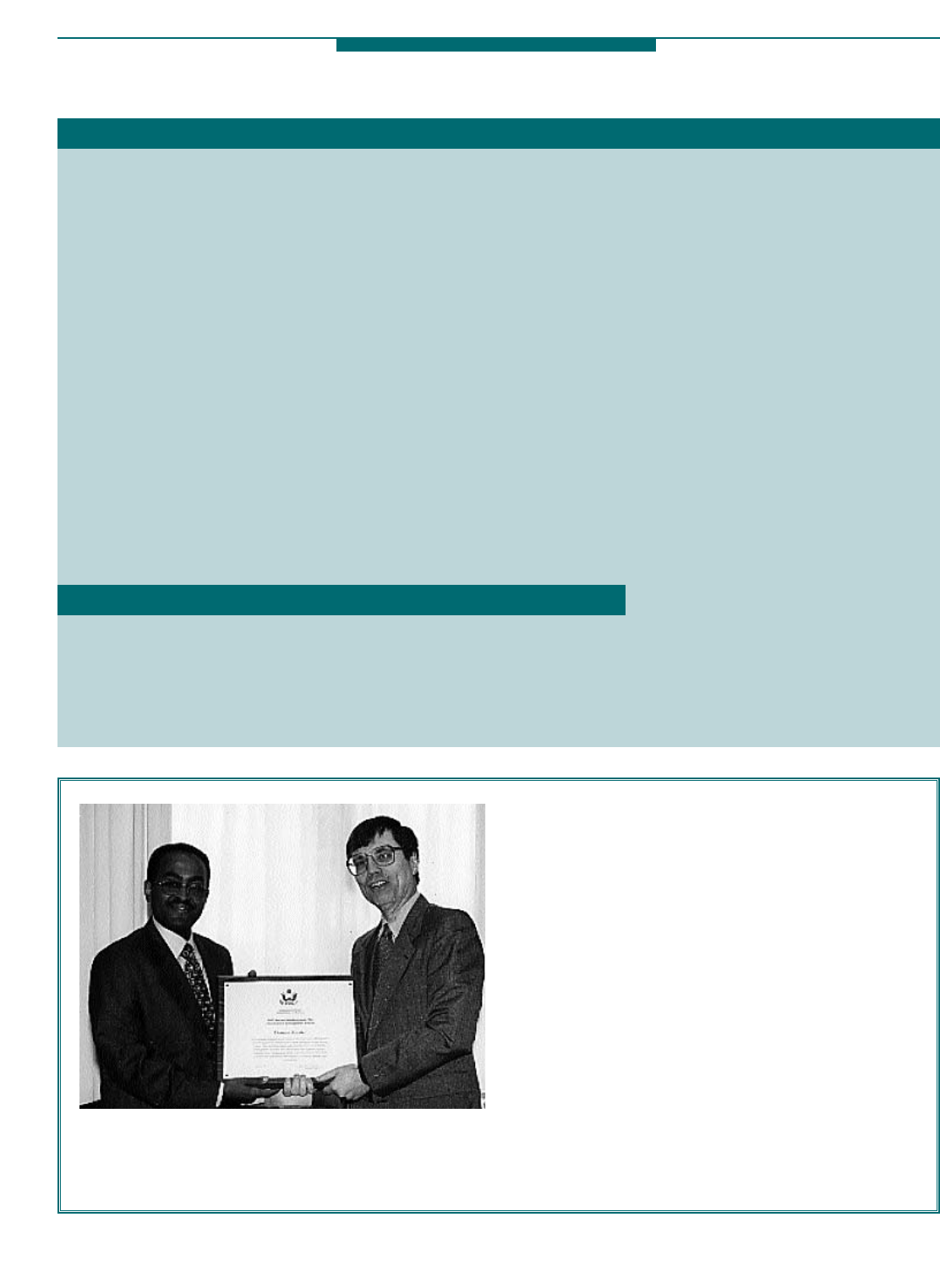
Transfers Continued
McCann, Jennifer A., Inter-American Affairs to Lima
McCracken, James E., Ulaanbaatar to Personnel
McEldowney, Nancy E., Bonn to National Security
Council
McHale, Jonathan R., Tokyo to Dep. Spec.
Representative for Trade Negotiations
Meagher, Patrick Joseph, Yaounde to Dhaka
Memler, William H., Inter-American Affairs to Sarajevo
Milasi, Paolina, African Affairs to Harare
Million, Adda J., Frankfurt to Wellington
Mitman, Matthias J., Economic & Business Affairs
to Office of the Secretary
Montgomery, Denise Dell, Diplomatic Security to
Mexico City
Montgomery, Steven A., Manila to Nairobi
Mooney, William F., Intelligence and Research to
Oceans & Int’l. Envir. & Sci. Affs.
Moore, Alice C., East Asian and Pacific Affairs
to Bangkok
Moore, Gloria L., FS Specialist Intake to Lima
Morris, Margaret T., Personnel to Office of the Secretary
Myers, Martin H., Cairo to Abidjan
Myles, Marianne M., Personnel to Naples
Nash, Louise A., Lima to Georgetown
Nelsen, Larry A., Bern to London
Nemeth, Robert J., Inter-American Affairs to
Mexico City
Nigro Jr., Louis John, Vatican to Conakry
Noble, Aline Johnson, Brussels (USEU) to Madrid
Nolan, Stephen James, Harare to Nairobi
Norton, James C., Seoul to Bonn
Nuland, Victoria Jane, Non-Governmental
Organizations to Office of the Secretary
O’Brien, Geraldine H., Office of the Sec. to Personnel
Olson, Allen Kieth, Office of Foreign Buildings
to Hungary
Page, Harriett E., Tunis to The Hague
Pates, Bonnie J., Amman to Kuwait
Perina, Rudolf Vilem, European Affairs to Foreign
Service Institute
Pinzino, Luigina E., Rome to Vatican
Powers, Aubrey, Bangkok to Frankfurt
Rabette, David M., Near Eastern Affairs to Riyadh
Robinson, Ronald Sinclair, Asmara to Rio de Janeiro
42 State Magazine
FFOORREEIIGGNN SSEERRVVIICCEE PPEERRSSOONNNNEELL
Monger, Judy A., Jerusalem
Nasri, Fares Z., Damascus
O’Connor, Edward W., Guatemala
Pauly, Pamela E., Monrovia
Polson, Virginia K., Congo
Rozinov, Rinat, Tel Aviv
Resignations Continued
Ross, Shannon M., Pre-Assignment Training to Rio
de Janeiro
Sack, Larry A., FS Specialist Intake to Office of
Foreign Buildings
Saloom III, Joseph A., African Affairs to Bonn
Shea, Debra L., FS Specialist Intake to Dhaka
Shear, Dean K., Santo Domingo to Diplomatic Security
Smith, Jacqueline R., Lisbon to Guangzhou
Stein, Jerry A., Freetown to Damascus
Steinmetz, Ingeborg B., Madrid to Rome
Stern, Edward D., European Affairs to Vienna
Strickler, Theodore Eugene, Consular Affairs to
Office of the Undersecretary for Management
Tadie, Eugene Phillip, European Affairs to Tel Aviv
Walker, Thomas G., Caracas to Port-au-Prince
Wasilewski, Roman Hugh, Intelligence and Research
to Bogota
Wharton, Royal M., Port Moresby to International
Org. Affairs
Wick, David Steven, Paramaribo to Foreign Service
Institute
Wilkins, Catherine, Office of Foreign Buildings to
Colombia
Wolfe II, James Andrew, Berlin to Sarajevo
Wright, Glenda, East Asian and Pacific Affairs to
Kolonia
Yacenda, Frank J., Tirana to Brasilia
Yacovoni, Rosemarie C., Lahore to Guangzhou
Rumold, Cindy L., Caracas
Shearer, Derek N., Helsinki
Walker, William Graham, Dept. of Defense
Wharton, Ann Maria, Port Moresby
Wotring, Joan K., La Paz
Information Management
Winners Named
Demsas Abraha, a computer management specialist
at the U.S. embassy in Addis Ababa, recently was
named the second winner of the Marion Middlebrooks
Foreign Service National Information Management
Award. Mr. Abraha was selected for the award based
on his service as de facto systems manager in Addis
Ababa, and for the support he provided to the
embassies in Asmara, Djibouti and N’Djamena. He also
instituted a training schedule and enhanced various
systems that increased the posts’ networks and techno-
logical abilities with limited funding.
Dario Valori from the U.S. embassy in Rome was
runner-up in the competition. He was recognized for his
database work and for his sustained initiatives and tech-
nical expertise in planning and implementing upgrades.
Demsas Abraha, left, from the embassy in Addis Ababa,
receives the Marion Middlebrooks Foreign Service
National Information Management Award from Patrick F.
Kennedy, assistant secretary for Administration.

Promotions (January)
Appointments (January)
Reassignments (January)
Retirement (January)
Resignations (January)
February 43
CCIIVVIILL SSEERRVVIICCEE PPEERRSSOONNNNEELL
GG–11
Chen, Ying Chih, Foreign Service Institute
GM–14
Guzowski, Danuta U., Office of Civil Service
Ombudsman
GS–4
Carson, Julie A., New Orleans Passport Agency
Keita, Kamilah, Information Resource Management
Singleton, Ocenetta, New Orleans Passport Agency
GS–5
Ellis, Beverly A., Houston Passport Agency
GS–6
Adams, Karen, Office of Career Development &
Assignments
Waako, Margaret R., Houston Passport Agency
GS–7
Carter, Paula M., Bureau of Consular Affairs
Rilley, Joyce Ann, Bureau of Population, Refugees
and Migration
GS–8
McDuffie, Sherry Ann, Office of the Chief Financial
Officer
GS–9
Abramson, Sherrill M., Office of Foreign Buildings
Alexander, Mildred L., Washington Passport Agency
Canady, Monica A., Office of the Inspector General
Dowd, Delores D., Office of the Inspector General
Feltes, Katrina N., Bureau of Inter-American Affairs
Hartranft, Amy E., Office of Audits
Hilley, Carol R., East Asian and Pacific Affairs
Hughes, Joyce, Bureau of Consular Affairs
Martin, Suzanne, Office of the Inspector General
McDonald, Angela R., Office of the Inspector General
GS–11
Bazemore, Lisa C., Office of the Chief Financial
Officer
Cook, Michael Allen, Bureau of Consular Affairs
Washington, Doretha K., Office of the Chief Financial
Officer
Williams, Britany D., Washington Passport Agency
GS–12
Creeser, Gregory J., Bureau of Political-Military Affairs
Fox, Barbara T., Foreign Service Institute
Gimondo, Ronald L., Bureau of International Org. Affairs
Laing, Peter, National Passport Center, Portsmouth, N.H.
Martin, Timothy P., Bureau of Consular Affairs
McNeilly, Sandra J., Undersecretary for Political Affairs
Urbanski, Sandra K., Bureau of Administration
GS–13
Atkins, John B., Bureau of Consular Affairs
Ferry, Brenda W., Bureau of Diplomatic Security
Kieffer, Carolyn Anne, New Orleans Passport Agency
Lee, Melanie Louise, Office of Foreign Buildings
McKenna, Patricia L., Office of the Chief
Financial Officer
Workman, Carol A., Bureau of Diplomatic Security
GS–14
Davis, Stacy B., Bureau of Political-Military Affairs
Deshong, Christopher L., Office of the Inspector General
Hoffman, Michael A., New York Passport Agency
Johnson, Bernard A., Bureau of Diplomatic Security
GS–15
May, Nancy C., Bureau of Intelligence and Research
White, Craig M., Bureau of Political-Military Affairs
XP–7
Powell, Earl L., Bureau of Administration, Information
Management
Swann, Dale G., Bureau of Administration,
Information Management
XP–8
Lyles, Carolyn M., Bureau of Administration,
Information Management
XP–9
Cheatham, Donald, Bureau of Administration,
Information Management
Holsendorff, Earl F., Bureau of Administration,
Information Management
Poole, Raymond B., Bureau of Administration,
Information Management
Young, Ralph E., Bureau of Administration,
Information Management
Brooks, Maren, Office for Inter, Narc. and Law
Enforcement
Calvert, Veronica, Office of the Chief Financial
Officer
Goriup, Attilio E., Office of Foreign Buildings
Hammes, David J., Office of Foreign Buildings
Lytell, Melissa D., Consular Affairs
Martin, Mary Darlene, Office of Foreign Buildings
Mavlian, Sally H., Dir. Gen. of For. Ser. & Dir.
of Personnel
Padlan, Emmanuel D., Diplomatic Security
Prince, Jonathan M., Public Affairs
Sanders, Sharon A., Diplomatic Security
Scotti, William H., Office of Overseas Schools
Wheeler-Wilcox, Shannon L., Consular Affairs
Brown, Sandy D., Public Affairs to Population,
Refugees and Migration
Farwell, Janet E. L., Political-Military Affairs to Office
of the Legal Adviser
Leibbrandt, Susan D., Political-Military Affairs to
East Asian and Pacific Affairs
Epstein, David G., Diplomatic Security
Marshall, Gloria Marie, Economic, Business and
Agricultural Affs.
McCloughan, Jean G., Administration, Information
Management
Pfund, Peter H., Office of the Legal Adviser
Ross, Russell R., Diplomatic Security
Russell, Bessie L., Office of the Chief Financial Officer
Ahrens, Ruth E., Office of the Chief Financial Officer
Bohnet, Anne Virginia, Foreign Service Institute
Choffel, Julie, Consular Affairs
Clinton, Cheri, Consular Affairs
Grayson, Desean C., Population, Refugees and
Migration
Grier, Robin Y., Consular Affairs
Heald, Lisa W., Inter. Narc. and Law Enforcement
Infor. Aff.
Ioffreda, Angelo S., Economic & Business Affairs
Kramer, Cheryl L., Office of the Inspector General
LaFleur, Vinca Showalter, Public Affairs
Mols, Diana Lynn, Office of Foreign Buildings
Montgomery, Vivian E., Inter-American Affairs
Nalepa, Gregory A., Office of the Chief Financial Officer
Nichols, Byron L., Washington Passport Agency
Quickenden, Christine L., Office of the Legal Adviser
Sinacore, Nicole, Office of the Inspector General
Williams, Steven, Consular Affairs
Withey, Alison, Asst Sec, Oceans & Int’l. Envir. &
Sci. Affs.
Woods, Lamar G., Office of the Chief Financial
Officer
Yu,Wai-Ming, Los Angeles Passport Agency
Parris, Lisa G., African Affairs to East Asian and
Pacific Affairs
Roach, Gary S., Dir. Gen. of For. Ser. & Dir. of
Personnel to Washington Passport Agency
Shaw, Sharon T., Economic & Business Affairs to
Office of the Undersecretary for Global Affairs

Intensive Area Studies
East Asia (AR 220) 8 — 2 Weeks
Europe (AR 291) 8 — 2 Weeks
Inter-American Studies (AR 239) 8 — 2 Weeks
Near East/North Africa (AR 240) 8 — 2 Weeks
Russia/Eurasia (AR 281) 8 — 2 Weeks
South Asia (AR 260) 8 — 2 Weeks
Southeast Asia (AR 270) 8 — 2 Weeks
Sub-Saharan Africa (AR 210) 8 — 2 Weeks
Advanced Area Studies
Albania (AR 563) Insular Southeast Asia (AR 571)
Andean Republics (AR 533) Italy (AR 594)
Arabian Peninsula/Gulf (AR 541) Japan (AR 522)
Baltic States (AR 588) Korea (AR 523)
Benelux/EU/NATO (AR 568) Lusophone Africa (AR 514)
Brazil (AR 535) Mainland Southeast Asia (AR 572)
Central America (AR 539) Mexico (AR 531)
Central Asia (AR 586) Mongolia (AR 524)
China/Hong Kong/Taiwan (AR 521) Nordic Countries (AR 596)
East Central Europe (AR 582) Northern Africa (AR 515)
Eastern Africa (AR 511) Poland (AR 587)
Fertile Crescent (AR 542) Romania (AR 569)
Former Yugoslavia (AR 562) Russia/Belarus (AR 566)
France (AR 567) South Asia (AR 560)
Francophone Africa (AR 513) Southern Africa (AR 512)
German-Speaking Europe (AR 593) Southern Cone (AR 534)
Greece/Cyprus (AR 589) The Caribbean (AR 538)
Haiti (AR 536) Turkey (AR 543)
Hispanic Caribbean (AR 538) Ukraine (AR 565)
Iberian Peninsula (AR 591)
These courses are integrated with the corresponding languages and are scheduled
weekly for 3 hours. Starting dates correspond to language starting dates.
SLS, Basic Language Courses (Full-Time Training)
French (LFR100) 29 — 24 Weeks
Spanish (LQB 100) 29 — 24 Weeks
Arabic Refresher (LAD 201) 29 — 6 Weeks
Chinese Refresher (LCM 201) 29 — 6 Weeks
Hebrew Refresher (LAD 201) 29 — 6 Weeks
Japanese Refresher (LJA 201) 29 — 6 Weeks
Korean Refresher (LKP 201) 29 — 6 Weeks
Russian Refresher (LRU 201) 29 — 6 Weeks
Vietnamese Refresher (LRU 201) 29 — 6 Weeks
SLS, Familiarization & Short-Term (F.A.S.T.) Language Courses
Albanian (F.A.S.T.) (LAB 200) 29 — 7 Weeks
Amharic (F.A.S.T.) (LAC 200) 29 — 7 Weeks
Arabic (Egyptian) (LAE 200) 29 — 7 Weeks
Arabic (Modern Standard) (LAD 200) 29 — 7 Weeks
Armenian (F.A.S.T.) (LRE 200) 29 — 7 Weeks
Azerbaijani (F.A.S.T.) (LAX 200) 29 — 7 Weeks
Bengali (F.A.S.T.) (LBN 200) 29 — 7 Weeks
Bulgarian (F.A.S.T.) (LBU 200) 29 — 7 Weeks
Burmese (F.A.S.T.) (LBY 200) 29 — 7 Weeks
Byelorussian (F.A.S.T.) (LBL 200) 29 — 7 Weeks
Chinese (Standard) (F.A.S.T.) (LCM 200) 29 — 7 Weeks
Chinese (Cantonese) (F.A.S.T.) (LCC 200) 29 — 7 Weeks
Croatian (F.A.S.T.) (LHR 200) 29 — 7 Weeks
Czech (F.A.S.T.) (LCX 200) 29 — 7 Weeks
Danish (F.A.S.T.) (LDA 200) 29 — 7 Weeks
Dutch/Flemish (F.A.S.T.) (LDU 200) 29 — 7 Weeks
Estonian (F.A.S.T.) (LES 200) 29 — 7 Weeks
Finnish (F.A.S.T.) (LFJ 200) 29 — 7 Weeks
French (F.A.S.T.) (LFR 200) 29 — 8 Weeks
Georgian (F.A.S.T.) (LGG 200) 29 — 7 Weeks
German (F.A.S.T.) (LGM 200) 29 — 8 Weeks
Greek (F.A.S.T.) (LGR 200) 29 — 7 Weeks
Haitian Creole (F.A.S.T.) (LHC 200) 29 — 7 Weeks
Hebrew (F.A.S.T.) (LHE 200) 29 — 7 Weeks
Hindi (F.A.S.T.) (LHJ 200) 29 — 7 Weeks
Hungarian (F.A.S.T.) (LHU 200) 29 — 7 Weeks
Icelandic (F.A.S.T.) (LJC 200) 29 — 7 Weeks
Indonesian (F.A.S.T.) (LJN 200) 29 — 7 Weeks
Italian (F.A.S.T.) (LJT 200) 29 — 8 Weeks
Japanese (F.A.S.T.) (LJA 200) 29 — 7 Weeks
Kazakh (F.A.S.T.) (LKE 200) 29 — 7 Weeks
Khmer (Cambodian) (F.A.S.T.) (LCA 200) 29 — 7 Weeks
Korean (F.A.S.T.) (LKP 200) 29 — 7 Weeks
Kyrgyz (F.A.S.T.) (LKM 200) 29 — 7 Weeks
Lao (F.A.S.T.) (LLC 200) 29 — 7 Weeks
Latvian (F.A.S.T.) (LLE 200) 29 — 7 Weeks
Lithuanian (F.A.S.T.) (LML 200) 29 — 7 Weeks
Macedonian (F.A.S.T.) (LMA 200) 29 — 7 Weeks
Malay (F.A.S.T.) (LML 200) 29 — 7 Weeks
Mongolian (F.A.S.T.) (LMV 200) 29 — 7 Weeks
Nepalese (F.A.S.T.) (LNE 200) 29 — 7 Weeks
Norwegian (F.A.S.T.) (LNR 200) 29 — 7 Weeks
Persian/Dari (F.A.S.T.) (LPG 200) 29 — 7 Weeks
Persian/Farsi (F.A.S.T.) (LPF 200) 29 — 7 Weeks
Pilipino/Tagalog (F.A.S.T.) (LTA 200) 29 — 7 Weeks
Polish (F.A.S.T.) (LPL 200) 29 — 7 Weeks
Portuguese (Brazilian) (F.A.S.T.) (LPY 200) 29 — 8 Weeks
Romanian (F.A.S.T.) (LRQ 200) 29 — 7 Weeks
Russian (F.A.S.T.) (LRU 200) 29 — 8 Weeks
Serbian (F.A.S.T.) (LSR 200) 29 — 7 Weeks
Singhalese (F.A.S.T.) (LSJ 200) 29 — 7 Weeks
Slovak (F.A.S.T.) (LSK 200) 29 — 7 Weeks
Spanish (F.A.S.T.) (LQB 200) 29 — 8 Weeks
44 State Magazine
Courses: National Foreign Affairs Training Center
&
Education Training
Program June July Length Program June July Length

(F.A.S.T.) Language Courses, Continued
Swahili/Kiswahili (F.A.S.T.) (LSW 200) 29 — 7 Weeks
Swedish (F.A.S.T.) (LSY 200) 29 — 7 Weeks
Tajik (F.A.S.T.) (LTB 200) 29 — 7 Weeks
Thai (F.A.S.T.) (LTH 200) 29 — 7 Weeks
Turkish (F.A.S.T.) (LTU 200) 29 — 7 Weeks
Turkmen (F.A.S.T.) (LUB 200) 29 — 7 Weeks
Ukrainian (F.A.S.T.) (LUK 200) 29 — 7 Weeks
Urdu (F.A.S.T.) (LUR 200) 29 — 7 Weeks
Uzbek (F.A.S.T.) (LUX 200) 29 — 7 Weeks
Vietnamese (F.A.S.T.) (LVS 200) 29 — 7 Weeks
Administrative Training
NEPA Training Domestic Operations
(PA 129) 27 1 Week
Property Management for
Custodial Officers (PA 135) — 23 2 Days
Appropriations Law (PA 215) 23 — 4 Days
Customer Service (PA 143) 11 — 2 Days
Budget & Financial Management (PA 211) 22 — 5 Weeks
FSN Classification and Compensation
(PA 232) — 13 2 Weeks
General Services Operation (PA 221) 22 20 12 Weeks
ICASS Executive Seminar (PA 245) 15 15 1 Day
Overseas Contracting Officers
Warrant Trng (PA 223) 8 — 4 Weeks
Personnel Course (PA 231) 22 — 7 Weeks
Overseas Administrative Management
Course (PA 243) 1 13 2 Weeks
Working with ICASS (PA 214) 2 28 4 Days
(International Cooperative Admin.
Support Services) 16 —
How To Be a Contracting Officer
Repres. (PA 130) Correspondence Course
How To Write a Statement of Work
(PA 134) Correspondence Course
How To Be a Certifying Officer (PA 291) Correspondence Course
Intro to Simplified Acquisitions & Req.
Overseas (PA 222) Correspondence Course
Management Controls Workbook
(PA 164) Correspondence Course
Training for Overseas Voucher
Examiners (PA 200) Correspondence Course
Training for Overseas Cashier
(PA 293) Correspondence Course
Training for Overseas Cashier Superior
(PA 294) Correspondence Course
Consular Training
Automation-Consular Managers (PC 116) 1 20 1 Week
15 —
30
Advanced Consular Course (PC 532) — 14 3 Weeks
Congen Rosslyn Consular (PC 530) Continuous Enrollment
Consular Orientation (PC 105) (6 Days) Continuous Enrollment
Immigration Law and Visa
Operation (PC 102) Correspondence Course
Nationality Law and Consular
Procedures (PC 103) Correspondence Course
Overseas Citizens Services
(PC 104) (6 Days) Correspondence Course
Passport Examiner Correspondence
Course (PC 110) Correspondence Course
Curriculum and Staff Development
Basic Facilitation & Delivery Workshop
(PD 513) 11 — 3 Days
Strategic Planning & Performance
Measurement (PD 529) 17 — 2 Days
Training Design Workshop
(PD 512) 25 — 3 Days
Visual Aid Basics (PD 520) 6 — 1 Day
Economic & Commercial Training
Advanced Economic Review
Seminar (PE 501) — 13 5 Weeks
Applied Economics/Non-Economic
Officers (PE 280) — 6 6 Weeks
Aviation Policy and
Negotiation (PE 130) — 20 3 Days
Country Data Analysis (PE 504) — 20 2 Weeks
Economic Tradecraft (PE 124) — 6 2 Week
Energy and the Environment (PE 128) 22 — 1 Week
Export Promotion (PE 125) 29 20 1 Week
Political/Economic Tradecraft (PG 140) 8 27 3 Weeks
Resource Reporting Officer
Training (PE 103) — 21 2 Weeks
Science, Technology & Foreign
Policy (PG 562) 15 — 1 Week
Senior Commercial Course (PE 290) 29 27 2 Days
Telecommunication Policy (PE 131) — 23 1 Day
US Commercial Interest in the Power
Sector (PE 132) — 27 1 Day
US Environmental Technology
Industry (PE 133) — 28 1 Day
Leadership & Management Development
Deputy Chiefs of Mission (PT 102) 7 12 2.2 Weeks
EEO/Diversity Awareness for 4 9 2 Days
Managers and Supervisors (PT 107) 11 15
18 22
25 30
Introduction to Management
Skills (PT 207) 22 1 Week
February 45
Program June July Length Program June July Length
Courses: National Foreign Affairs Training Center
&
Education Training

Leadership & Management Development, Continued
Managing State Projects (PT 208) 22 20 1 Week
Political/Economics Counselors
Seminar (PT 127) — 20 1 Week
Executive Introduction to Project
Management (PT 209) 29 2 Days
Information Management Training
Introduction, Word 97 for
Windows (PS 232) 3 1 2 Days
10 8
17 15
18 17
24 22
—29
Intermediate, Word 97 for
Windows (PS 233) 9 8 2 Days
24 22
Advanced, Word 97 for Windows (PS 246) 11 9 1 Day
25 23
Word 6.0 Workshop (PS 252) 5 10 0.5 Days
Introduction, Access 97 for
Windows (PS 250) 3 1 2 Days
17 15
29
Intermediate, Access 97 (PS 251) 8 6 2 Days
25 22
Corporate Systems & Administration
(PS 654) 22 — 4 Weeks
Introduction, Excel 97 for
Windows (PS 270) 1 13 2 Days
15 27
29 —
Intermediate, Excel 97 for
Windows (PS 271) 4 20 2 Days
17 —
Excel 5.0 Workshop (PS 254) 12 17 0.5 Days
Introduction, PowerPoint 97
for Windows (PS 240) 1 13 2 Days
15 27
29
Intermediate, PowerPoint 97
for Windows (PS 241) 23 30 1 Day
PowerPoint 5.0 Workshop (PS 253) 19 24 0.5 Days
Information Management Seminar (PS 217) 20 3 Weeks
Internet, Concepts (PS 218) 5 10 1 Day
12 17
19 —
Managing Information Programs (PS 213) 1 — 3 Weeks
Network Essentials (PS 214) 7 3
Microsoft Project (PS 180) 22 — 2 Days
PC/Windows Network 4.0 Fundamentals
(PS 201) 8 13 2 Days
15 20
23 —
29
Windows NT 4.0 Advanced End
User (PS 202) 1 14 1 Day
Windows NT 4.0 Administration (PS 261)** — 13 2 Weeks
Workgroups for Windows Administration
(PS 262) 17 — 3 Days
MS Exchange Administration (PS 269)** 27 1 Week
** Registration for PS 261 and PS 269 requires pre-approval from SAIT/IMT.
Please submit your DS–755 to the Office of the Registrar.
Warrenton—Information Management Training
Backup-Limited Communications
Operations (YW-119) 22 20 2 Weeks
TEL/KEY SYS—Intro to Telephone &
Key Systems (YW-140) 8 13 1 Week
Satellite Operations/Maintenance
(YW 149) 8 — 3 Weeks
C-LAN—Classified Local Area
Network (YW-177) 8 13 4 Weeks
TERP V-Terminal Equipment
Replacement Prog. V (YW-184) 8 6 2 Weeks
Refresher Communication (YW-164) 1,8 6,13 1 Week
15,22 20,27
29 —
ADP—Automated Data Processing
(YW-190) 15 27 4 Weeks
SC-7 Operations & Maintenance
(YW 192) — 20 3 Weeks
Air Con-Air Condition Systems (YW 205) 15 20 2 Weeks
29
CIP Current Installation Practices (YW 203) 22 4 Weeks
Generators Power Generator Systems
(YW 206) — 6 2 Weeks
Networking with Windows for
Workgroups 3.11 (YW-210) 8 6 1 Week
Commercial Terminal CT-7/9 (YW 212) 22 13 1 Week
Wide-Band Digital Transmission
Networking (YW 213) 8 20 2 Weeks
SX-50—Mitel PBX SX-50 (YW-219) 15 20 1 Week
SX-200D—Mitel PBX SX-200
Digital (YW-220) 23 28 1 Week
SX-2000—Mitel PBX SX-2000
Analog (YW-221) 1 6 1 Week
SX-20/200A—Mitel PBX SX-20/200
Analog (YW-222) 26 — 1 Week
Basic PC Maintenance (YW 224) 1 13 1 Week
Windows NT 4.0 Local Administration
(YW 225) 16 14 2 Weeks
BPS Black Packet Switching (YW 334) 2 20 1 Week
46 State Magazine
Courses: National Foreign Affairs Training Center
&
Education Training
Program June July Length
Program June July Length

Warrenton—Information Management Training, Continued
Meridian 61C (YW-497) 15 20 2 Weeks
Banyan LAN-Local Networks (YW 640) 15 — 2 Weeks
PC B/A—Personal Computer Basics/
Advanced (YW-641) 8 6 3 Weeks
Microsoft Exchange (YW 749) 1 27 1 Week
29 —
IDNX/90 EXS, IDNX/20 and IDNX
MICRO/20 (YW-850) 23 21 1 Week
Junior Officer Training and Orientation Training
Orientation for Foreign Officers (PG 101) — 6 7 Weeks
Orientation for Designated Posts (PN 112) — 9 2 Days
Orientation for Civil Service
Employees(PN 105) 16 — 3 Days
Orientation for Foreign Service
Specialist (PN 106) — 27 3 Weeks
Introduction to Working in
an Embassy (PN 113) 3 — 2 Days
Washington Tradecraft (PT 203) — 20 1 Week
Office Management Training
Better Office English: Written (PK 225) 1 — 2 Weeks
Better Office English: Oral (PK 226) — 13 2 Weeks
Civil Service Training for Entering
Personnel (PK 104) — 10 2 Weeks
Professional Development Seminar
(PK 302) 1 — 2 Weeks
Drafting Correspondence (PK 159) — 27 1 Week
Office Management 2000 (PK 330) — 6 2 Weeks
Files Management and Retirement
(PK 207) 8 — 1 Day
Proofreading (PK 143) — 9 2 Days
Travel Regulations and Vouchers
(PK 205) 23 1 1.5 Day
Writing Effective Letters and Memos
(PK 241) — 13 1 Week
Senior Secretarial Seminar (PK 111) — 29 3 Days
Political Training
Negotiation Art & Skills (PP 501) 15 — 1 Week
Labor Officer Functions (PL 103) — 13 3 Weeks
Political Tradecraft (PP 202) — 6 3 Weeks
Political Military Affairs (PP 505) — 15 3 Days
Workers Rights Reporting (PP 504) — 17 1 Day
Orientation for Narcotics Control
Officers (PA 202) — 20 2 Weeks
Security Overseas Seminar
Advanced Security Overseas
Seminar (MQ 912) 9 14 1 Day
23 28
SOS: Security Overseas Seminar (MQ 911) 1 6 2 Days
15 20
Youth SOS (MQ 914) 16 7 1 Day
23 14
—21
—28
Overseas Briefing Center (non-SOS)
Deputy/Chief of Mission (MQ 110) 15 20 3 Days
Long-Distance Relationships (MQ 801) 6 — 0.5 Days
Communicating Across Cultures (MQ 802) 5 — 1 Day
Spouse to Spouse (MQ 803) 6 31 1 Day
Life After the Foreign Service (MQ 600) — 7 2 Days
Post Options for Employment and
Training (MQ 703) 13 — 1 Day
Promoting United States Wines (MQ 856) — 15 0.2 Day
Protocol and US Representation
Abroad (MQ 116) 27 — 1 Day
Overseas Health Concerns (MQ 857) 17 — 0.2 Day
Regulations, Allowances and
Finances (MQ 104) — 28 3 Days
Targeting the Job Market (MQ 704) 11 — 2 Days
Career Transition Center
Job Search Program (RV 102) — 6 13 Weeks
Retirement Planning Seminar (RV 101) 29 — 1 Week
February 47
Courses: National Foreign Affairs Training Center
&
Education Training
Program June July Length Program June July Length
All computer classes fill quickly. Please contact the Office of the Registrar at (703) 302-7147 to find out about enrollment status.
Students should check with the Office of the Registrar (703-302-7144) to confirm course dates.
Credit Union Scholarships Announced
The deadline for applications for the State Department
Federal Credit Union scholarship competition is April 10.
Over the past 22 years, the credit union has awarded more
than $100,000 in scholarships to academically outstanding
members who need financial assistance. To qualify, a student
must demonstrate financial need, be a credit union member
in good standing and be enrolled in a degree program with a
minimum grade point average of 2.5.
For more application details and application forms, stop
by any of the five SDFCU branch offices or credit union
liaisons overseas call (703) 706-5000, or write: SDFCU, Attn:
Marketing Department, 1630 King St., Alexandria, VA 22314.
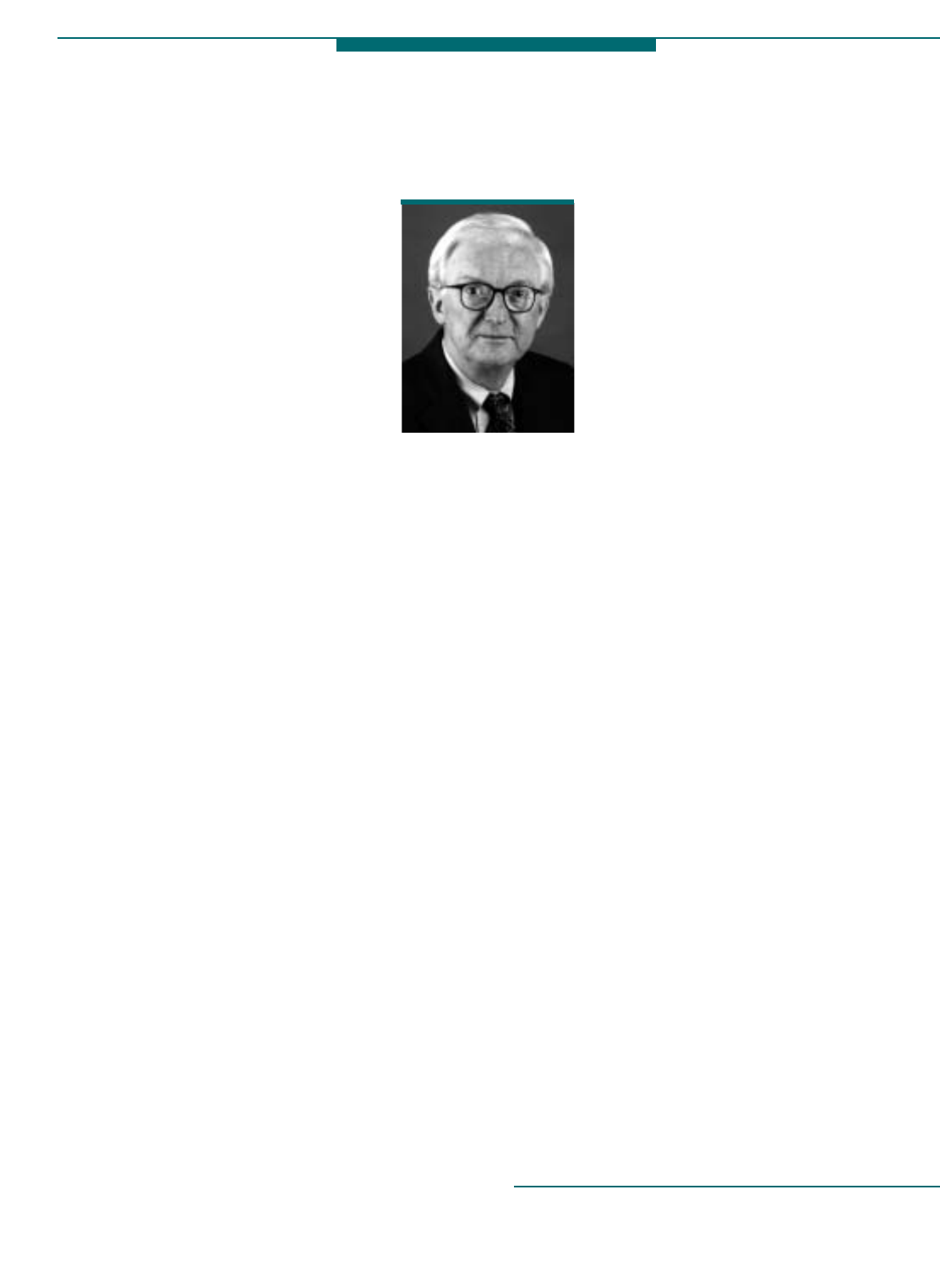
By Dan Clemmer
M
ost people who use libraries
know certain categories of refer-
ence books: dictionaries, quota-
tion books, statistics, gazetteers,
business directories, political handbooks,
usage guides, encyclopedias and who’s
whos, among others. But some very useful
books are not easily categorized and can be
overlooked. They can all be found in the
library reading room in 1239 Main State.
Parents worried about financing a college or universi-
ty education for their children may find comfort in
Peterson’s College Money Book, a guide to financial aid at
1,700 colleges and universities. Included are indexes of
non-need scholarships for undergraduates, athletic
grants for undergraduates, co-op programs, ROTC pro-
grams, tuition waivers and tuition payment alternatives.
(LB2337.2.P34 1998 Ref.)
If you’ve run across an old book you think might be
valuable, Collected Books: The Guide to Values, by Allen and
Patricia Ahearn, may clarify whether you have a precious
object or just an old book. The reference provides esti-
mated retail prices as of 1991 and identifies first editions,
which are generally more valuable than later editions.
(Z987.5.U6A36 Ref.)
How to Say It Best: Choice Words, Phrases, & Model
Speeches for Every Occasion, by Jack Griffin, offers a helping
hand to frightened or novice speakers. It gives advice in
handling a variety of situations, including the best way to
make a presentation. ( PN4121.G7195 Ref.)
Although the word “letters” does not appear in How to
Say It: Choice Words, Phrases, Sentences, and Paragraphs for
Every Situation, by Rosalie Maggio, the book offers most
“everything you need to know to write an effective busi-
ness or social letter in little more time than it takes to
hand write, type or input it.” It includes sample letters of
apology, sympathy, appreciation and congratulation, as
well as cover letters, letters to the editor and get-well let-
ters. (PE1483.M26 Ref.)
Would-be-writers—and there are plenty of them in the
Department—frequently turn to the Writer’s Market:
Where and How to Sell What You Write, edited by Kirsten C.
Holm and Don Prues, for help in identifying a market for
their memoirs or novel. A listing of book publishers
includes information on the types of manuscripts sought,
the average amount of advances and the number of sub-
missions received each year. Similar informa-
tion is provided for magazines. (PN161.W83
1988 Ref.)
If you’ve ever been curious about the
old Russian Embassy building in Washington
at 1125 16th St., N.W., or any of the other
buildings on or near 16th Street, Sixteenth
Street Architecture, by Sue A. Kohler and
Jeffrey R. Carson, will satisfy your curiosity.
(NA735.W3U62 Ref.)
Library users with questions about book
preservation, papers, photographs and other
objects of sentimental or monetary value regularly refer to
Caring for Your Collections, edited by Arthur W. Schultz.
The book also includes information on storing, securing,
appraising, insuring and donating collections and obtain-
ing professional conservation services. (AM303.C37 Ref.)
When speakers at retirement parties seek our help
finding interesting events that happened the year or the
day that “Good Ole Bob” came to work for the
Department, we refer them to Famous First Facts, by
Joseph Nathan Kane. It indexes significant “firsts” by
subject, name, year and day—from the first female
ambassador to sign a treaty to the first time a patent was
issued for chewing gum. (AG5.K315 1981 Ref.)
Another useful reference book for Department speak-
ers and writers is “Emperor Dead” and Other Historic
American Diplomatic Dispatches, edited by Peter D. Eicher.
The book, written by a Foreign Service officer, is the first
in the Diplomats and Diplomacy series sponsored by the
Association for the Diplomatic Studies and Training and
by Diplomatic and Consular Officers Retired. The book is
arranged chronologically and includes dispatches about
the most significant events from 1776 to the early 1960s.
(E183.7.E525 Ref.)
Although quotation books are plentiful, one devoted to
an ethnic group is unusual. Contemporary Quotations in
Black, compiled and edited by Anita King, collects quotes
by or about blacks ranging from Rosa Parks to Nelson
Mandela. (E184.6.C665 Ref.)
And for those times when a speechwriter can’t remem-
ber the name of the Jimmy Stewart character in “It’s a
Wonderful Life” or the actor who played Mahatma
Gandhi in “Gandhi,” a helpful reference is Memorable
Film Characters: An Index to Roles and Performers,
1915–1983, compiled by Susan Lieberman and Frances
Cable. (PN1995.9.C36L5 Ref.)
48 State Magazine
LL II BB RR AA RR YY RR EE PP OO RR TT
Reference Books off the Beaten Track
The author is the Department’s chief librarian.
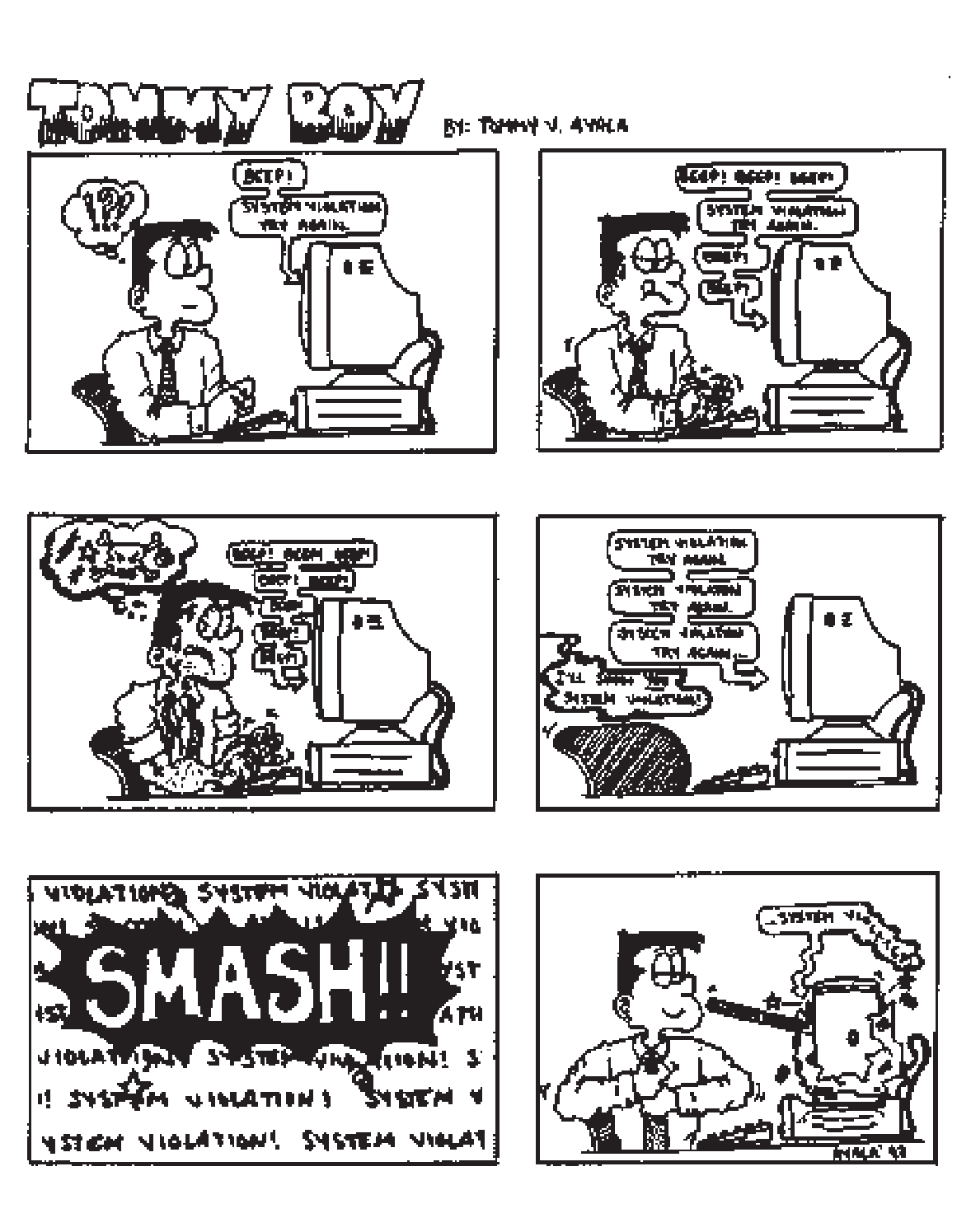

Department of State, USA
Bureau of Personnel
Washington, DC 20520
Official Business
Penalty for Private Use
Periodicals
Postage and Fees Paid
Department of State
USPS 0278—1859
If address is incorrect, please
indicate change. Do not cover
or destroy this address label.
Mail change of address to:
PER/ER/SMG
SA–6, Room 433
Washington, DC 20522–0602
Celebrate
Black History Month
